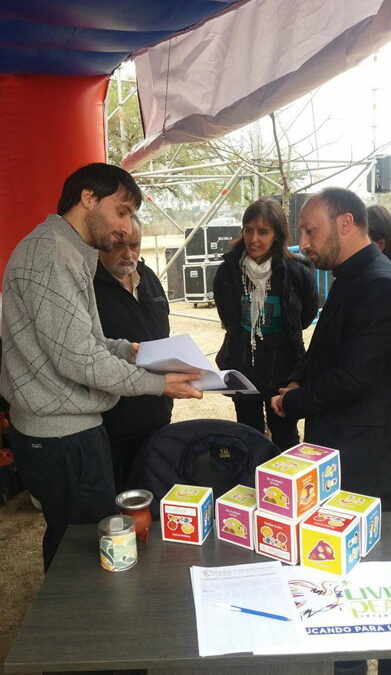
Sep 7, 2017 | Focolare Worldwide
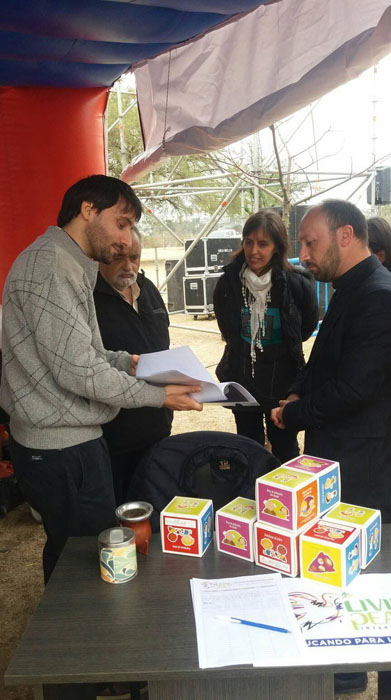 The Park of the Nations in Córdoba, Argentina, is always filled with children and teenagers on the “Día del Niño” (Day of the Child), which is celebrated on the third Sunday of August. The Park is the perfect place to hold games, tournaments and take walks. This year a festive crowd drew the attention of the passers-by, with the unveiling of a particularly meaningful monument: the Cube of Peace. There were games, obstacle courses, music and food just before the official unveiling in the presence of representatives from the Interreligious Commitee For Peace (COMIPAZ), members of the Armenian Church, the Jewish, Muslim and Evangelical communities. Fernanda Otero, Francisco Drab and Amelia Milagros López Loforte represented the Focolare community. The unveiling concluded with some words from Auxiliary Bishop Ricardo Seirutti who blessed the monument. It was to refrain from spinning the Cube. Each side displayed a sentence which, in spite of the rather playful and carefree atmosphere, were expected to be put into practice with seriousness and effort – and perhaps a bit of fatigue. The Cube proposes six actions that can be lived every day, each of them an expression of the Golden Rule,a version of which can be found in all religions: “Do to others what you would have them do to you:” Love everyone. Be the first to love. Love your enemy. Forgive. These are concrete gestures for a life that is counter current and courageous for the building of a more empathetic and supportive society. The unveiling was not an isolated event, but the result of many months of interaction and field work, duing which the Focolare youth took the Cube to several quarters in the city, as an educational tool for teaching peace through play and theatre. In neighbourhoods on the peripheries of Ciudad Evita, San Roque, Cabildo, Müller, Argüello where people live amidst violence, with their civil rights often violated and with the children of the Sierra Dorada Foundation in San Marcos Sierras, they worked side by side with local communities and organisations who are desirous of becoming more aware of local problems and taking direct action in favour of more incisive and effective social training. The project, sustained by the Focolare Movement, the organization for the defense of the rights of children and teenagers from the Province of Córdoba, the Living Peace Programme and the Interreligious Comittee for Peace, along with other organizations and public and private entities, aims to spread peace in all parts of society, beginning with a set of best practices for working with children, but valid for adults and in all environments. Similar activities are spreading in many other countries: Italy, Spain, Egypt, Hungary and Brazil where the now famous Cube has become the protagonist of a vast variety of educational projects and seminars. In Argentina, another Cube of Peace has been placed in a public area in Concepción, in the Province of Tucumán. Still in Córdoba, three days ealier, the Cube project was declared a cultural interest by the City Council. A small monument that continually comes to life.
The Park of the Nations in Córdoba, Argentina, is always filled with children and teenagers on the “Día del Niño” (Day of the Child), which is celebrated on the third Sunday of August. The Park is the perfect place to hold games, tournaments and take walks. This year a festive crowd drew the attention of the passers-by, with the unveiling of a particularly meaningful monument: the Cube of Peace. There were games, obstacle courses, music and food just before the official unveiling in the presence of representatives from the Interreligious Commitee For Peace (COMIPAZ), members of the Armenian Church, the Jewish, Muslim and Evangelical communities. Fernanda Otero, Francisco Drab and Amelia Milagros López Loforte represented the Focolare community. The unveiling concluded with some words from Auxiliary Bishop Ricardo Seirutti who blessed the monument. It was to refrain from spinning the Cube. Each side displayed a sentence which, in spite of the rather playful and carefree atmosphere, were expected to be put into practice with seriousness and effort – and perhaps a bit of fatigue. The Cube proposes six actions that can be lived every day, each of them an expression of the Golden Rule,a version of which can be found in all religions: “Do to others what you would have them do to you:” Love everyone. Be the first to love. Love your enemy. Forgive. These are concrete gestures for a life that is counter current and courageous for the building of a more empathetic and supportive society. The unveiling was not an isolated event, but the result of many months of interaction and field work, duing which the Focolare youth took the Cube to several quarters in the city, as an educational tool for teaching peace through play and theatre. In neighbourhoods on the peripheries of Ciudad Evita, San Roque, Cabildo, Müller, Argüello where people live amidst violence, with their civil rights often violated and with the children of the Sierra Dorada Foundation in San Marcos Sierras, they worked side by side with local communities and organisations who are desirous of becoming more aware of local problems and taking direct action in favour of more incisive and effective social training. The project, sustained by the Focolare Movement, the organization for the defense of the rights of children and teenagers from the Province of Córdoba, the Living Peace Programme and the Interreligious Comittee for Peace, along with other organizations and public and private entities, aims to spread peace in all parts of society, beginning with a set of best practices for working with children, but valid for adults and in all environments. Similar activities are spreading in many other countries: Italy, Spain, Egypt, Hungary and Brazil where the now famous Cube has become the protagonist of a vast variety of educational projects and seminars. In Argentina, another Cube of Peace has been placed in a public area in Concepción, in the Province of Tucumán. Still in Córdoba, three days ealier, the Cube project was declared a cultural interest by the City Council. A small monument that continually comes to life.
Sep 7, 2017 | Non categorizzato
The multi-religious marathon, “Rome Half Marathon Via Pacis,” will start off on Sunday 17 September from St. Peter’s Square to promote peace, integration and inclusion. Promoted by the Rome Capital and the Pontifical Council for Culture, Ministry of the Holy See, in partnership with FIDAL (Italian Track and Field Federation) and with the sponsorship of the CONI and CIP, the event is open to all, to say “stop violence, racism, and discrimination of any type and origin.” There will be two race routes (21 and 5 km), with five legs (St. Peter’s Basilica, Synagogue, Mosque, Valdes Church and Orthodox Church) to underline the participation of various confessions and religious communities. Also Sportmeet, the world network of sportsmen and women, operators and professionals of the Focolare Movement’s sports world will be attending as a sole team: “Sportmeet for a United World.” Those who wish to participate with Sportmeet may write to: info@sportmeet.org (also for the possible stay in Rome).
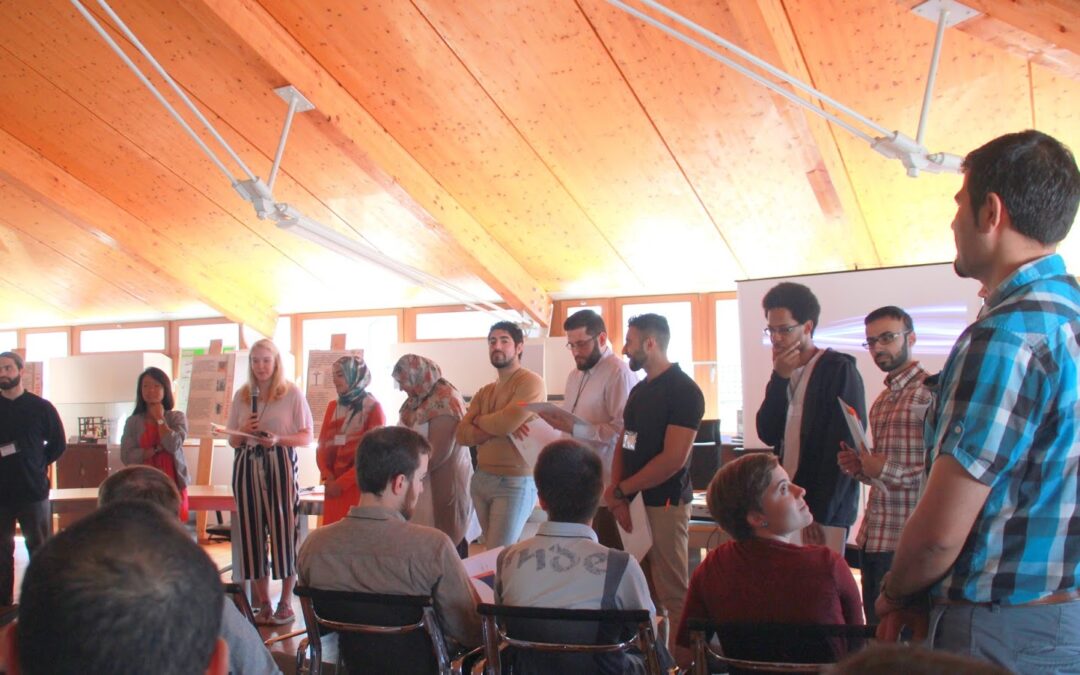
Sep 6, 2017 | Senza categoria
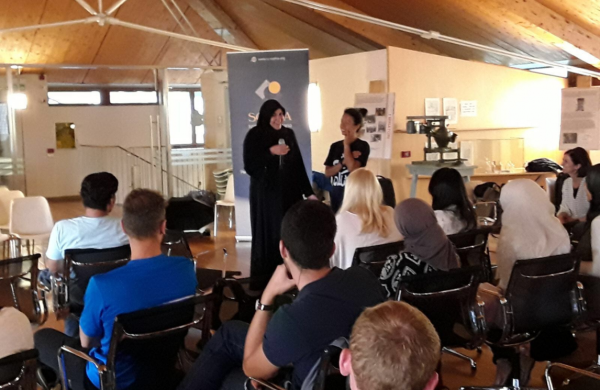 A summer school in the Primiero Valleys (Italy) is not a novelty. Some had taken place in the past years, thanks to the initiative of the Sophia University Institute. This year’s summer school held from 25 – 30 August had a precise interreligious profile, with the presence of Shiite and Christian students. Apart from the initiative’s success, this was not an occasional event, but a 20-year friendship journey undertaken by Shiite Muslims and Catholics, within the context of the Focolare Movement’s spirituality of communion. During the second half of the 1990s, Professor Mohammad Shomali with his wife, Mahnaz, also an academic from Qom (the holy city of Shi’a Islam in Iran), were both studying in England. Along with their studies they had hoped to find a way of establishing a relationship with dynamic Christian communities. Already at that time both had felt the calling to interreligious commitment. It was in this context that the two young academics met the Focolare Movement, and a deep spiritual friendship was established, based on the central point of love as a path to reach God and the brothers and sisters around us.
A summer school in the Primiero Valleys (Italy) is not a novelty. Some had taken place in the past years, thanks to the initiative of the Sophia University Institute. This year’s summer school held from 25 – 30 August had a precise interreligious profile, with the presence of Shiite and Christian students. Apart from the initiative’s success, this was not an occasional event, but a 20-year friendship journey undertaken by Shiite Muslims and Catholics, within the context of the Focolare Movement’s spirituality of communion. During the second half of the 1990s, Professor Mohammad Shomali with his wife, Mahnaz, also an academic from Qom (the holy city of Shi’a Islam in Iran), were both studying in England. Along with their studies they had hoped to find a way of establishing a relationship with dynamic Christian communities. Already at that time both had felt the calling to interreligious commitment. It was in this context that the two young academics met the Focolare Movement, and a deep spiritual friendship was established, based on the central point of love as a path to reach God and the brothers and sisters around us. 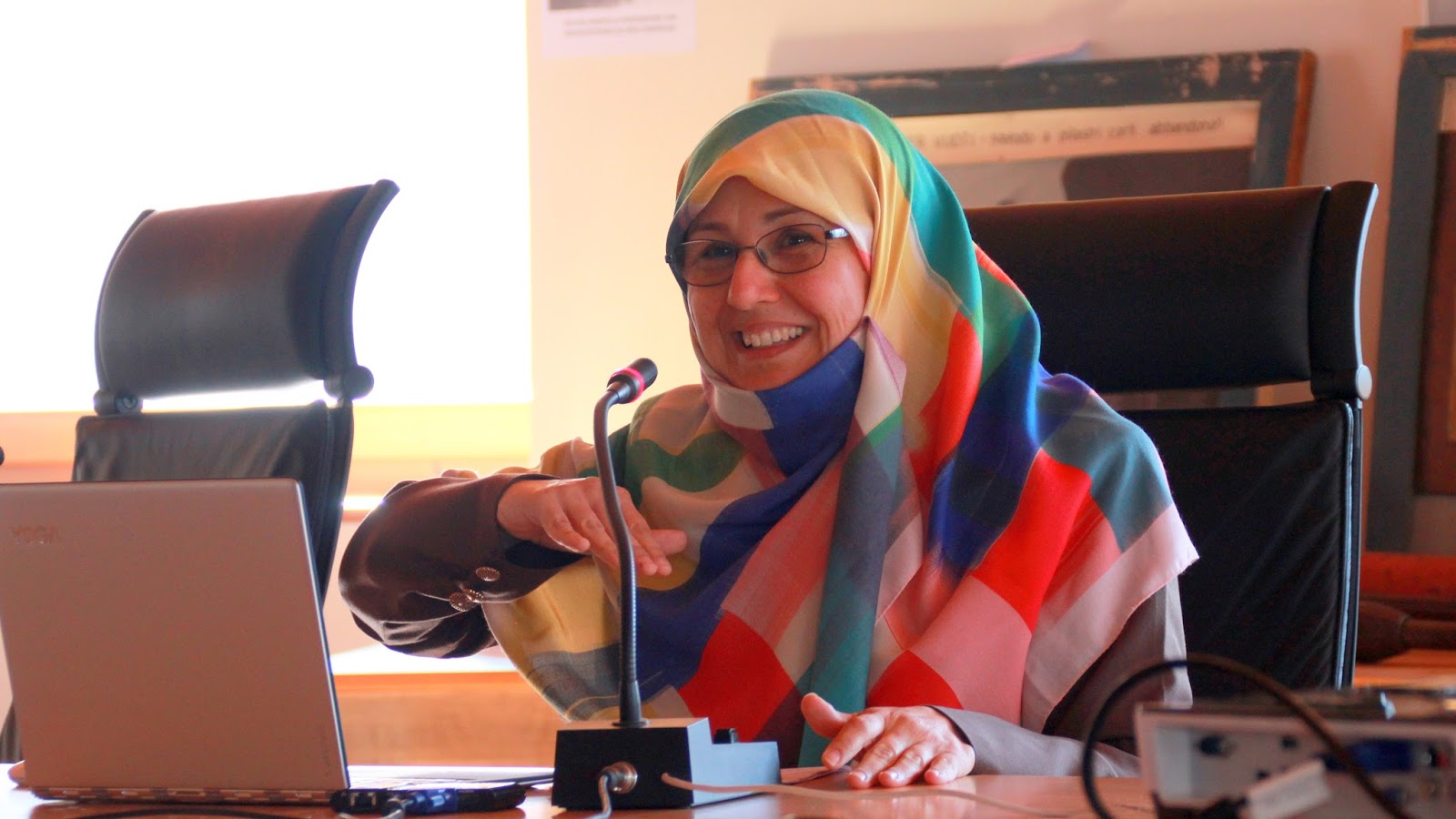 Besides a profound experience with the Benedictine community of the monastery of Ampleforth, the Shomalis had deepened their knowledge of the spirituality of communion and had also met other Christians and Muslims, on the occasion of international meetings held in Rome and in the town of Loppiano. After their return to Qom the relationships with the Focolare continued, and starting 2010 were enriched by academic values. In fact, to enhance a true bond between Shiite students of Qom and the Catholic Church, the Shomalis organised various group journeys to Italy, where they held meetings with the Pontifical Council for Interreligious Dialogue, the St. Anselm University, PISAI (Pontifical Institute for Arabic and Islamic Studies), and the Focolare Movement. In 2014, a delegation of the Movement’s Interreligious Dialogue Centre spent a week in Qom to meet various academic and religious groups and establish relationships of trust and communion at both concrete and intellectual levels, going deeper into the religious Christian heritage and highlighting common values and possibilities to set up paths of dialogue.
Besides a profound experience with the Benedictine community of the monastery of Ampleforth, the Shomalis had deepened their knowledge of the spirituality of communion and had also met other Christians and Muslims, on the occasion of international meetings held in Rome and in the town of Loppiano. After their return to Qom the relationships with the Focolare continued, and starting 2010 were enriched by academic values. In fact, to enhance a true bond between Shiite students of Qom and the Catholic Church, the Shomalis organised various group journeys to Italy, where they held meetings with the Pontifical Council for Interreligious Dialogue, the St. Anselm University, PISAI (Pontifical Institute for Arabic and Islamic Studies), and the Focolare Movement. In 2014, a delegation of the Movement’s Interreligious Dialogue Centre spent a week in Qom to meet various academic and religious groups and establish relationships of trust and communion at both concrete and intellectual levels, going deeper into the religious Christian heritage and highlighting common values and possibilities to set up paths of dialogue. 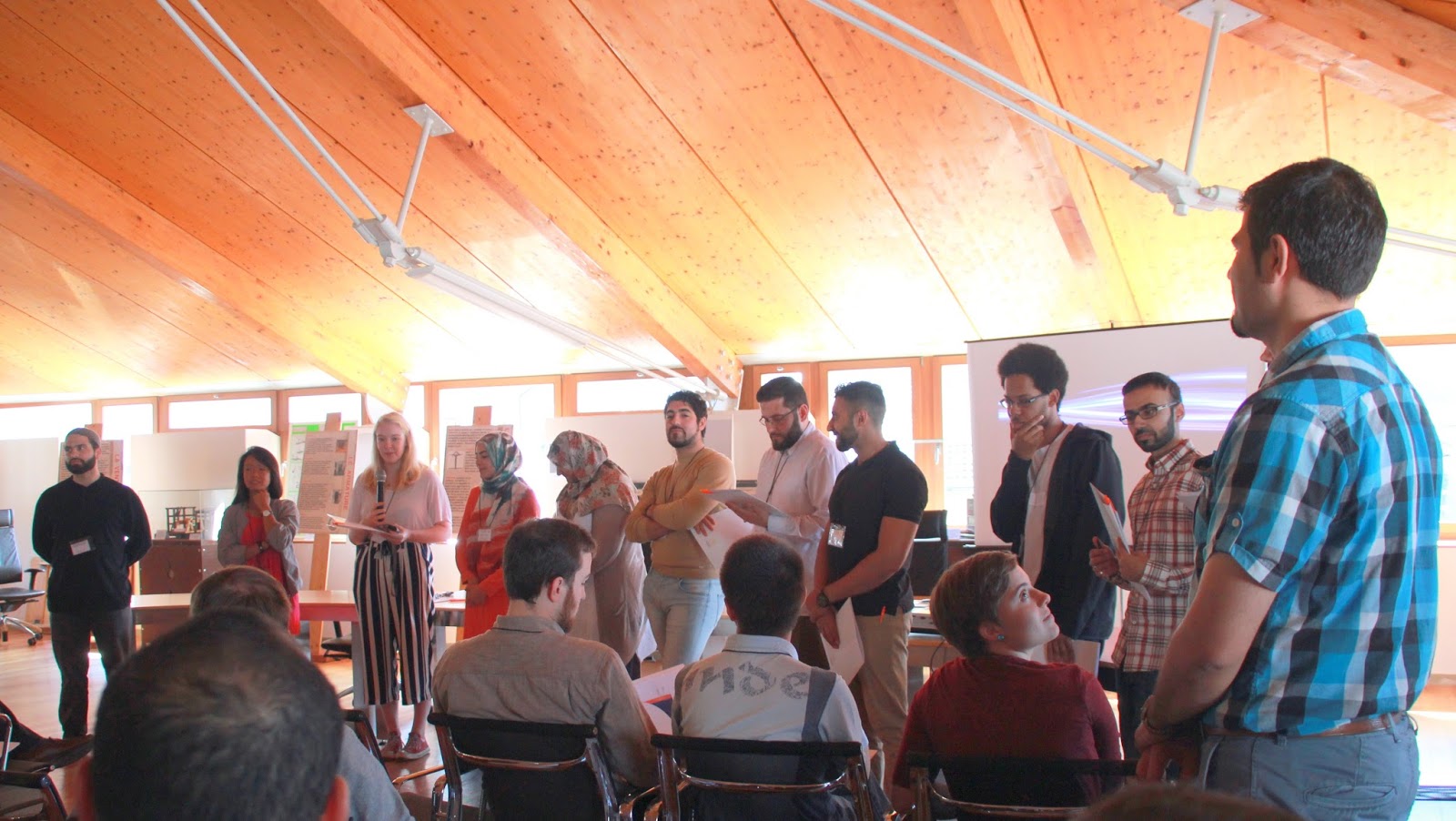 It was in this context that a bond with the Sophia University Institute was established, especially between the Rector, Mons. Piero Coda, and Professor Shomali. With subsequent encounters and lessons offered by the professor to the students of the Institute and the inhabitants of Loppiano, and in collaboration with Rita Moussalem and Roberto Catalano, Co-Directors of the Focolare’s Centre for Interreligious Dialogue, Coda and Shomali had developed the idea of creating a common academic research project with concrete works, which was named Wings of Unity. The core of this initiative is based on the quest for unity of God and unity in God and aims to focus on the perception of God in the two traditions, and in this light, on the possibility of building a true spirit of brotherhood. The finality is to create occasions for reflection in communion between Shiite Muslims and Christians and favouring the education of young generations in interreligious dialogue. As Prof. Shomali himself summarised, in these years they have gone beyond dialogue, and have attained the same way of thinking.
It was in this context that a bond with the Sophia University Institute was established, especially between the Rector, Mons. Piero Coda, and Professor Shomali. With subsequent encounters and lessons offered by the professor to the students of the Institute and the inhabitants of Loppiano, and in collaboration with Rita Moussalem and Roberto Catalano, Co-Directors of the Focolare’s Centre for Interreligious Dialogue, Coda and Shomali had developed the idea of creating a common academic research project with concrete works, which was named Wings of Unity. The core of this initiative is based on the quest for unity of God and unity in God and aims to focus on the perception of God in the two traditions, and in this light, on the possibility of building a true spirit of brotherhood. The finality is to create occasions for reflection in communion between Shiite Muslims and Christians and favouring the education of young generations in interreligious dialogue. As Prof. Shomali himself summarised, in these years they have gone beyond dialogue, and have attained the same way of thinking.
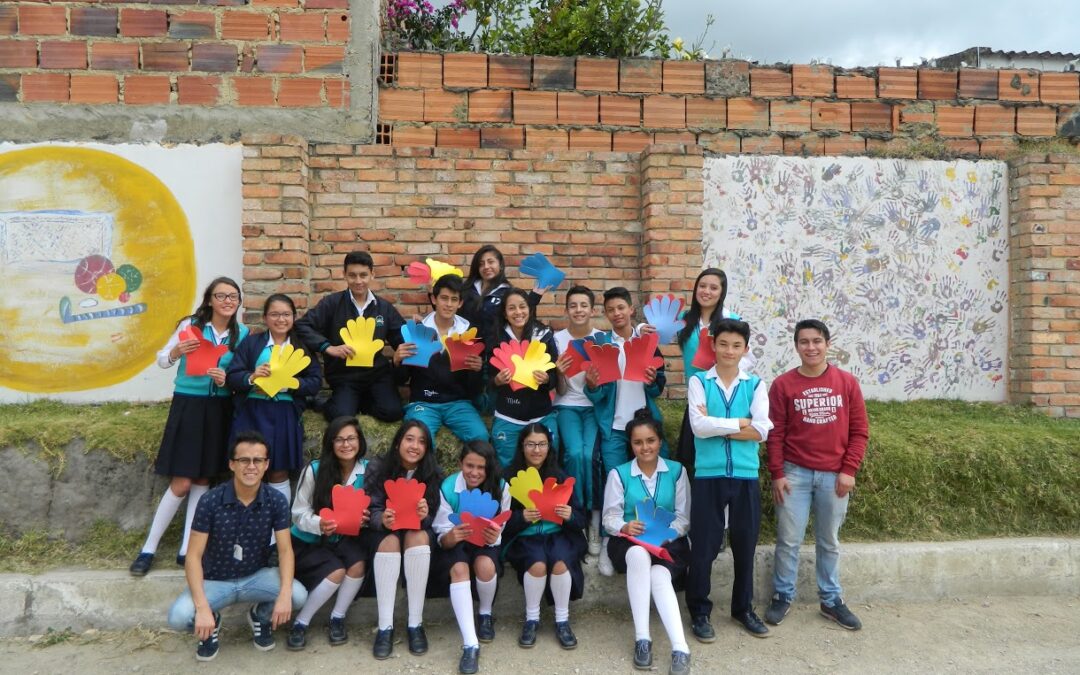
Sep 5, 2017 | Non categorizzato
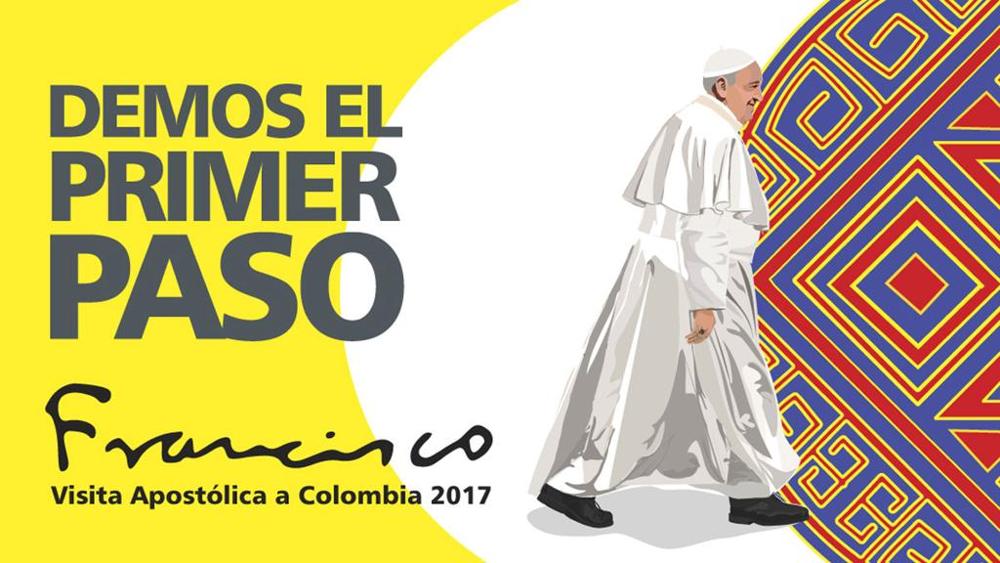 “I’ll be coming as a pilgrim of hope and of peace, to celebrate our faith in the Lord with you, and also to learn from your charity and perseverance in the search for peace and harmony.” This is how addressed the “dear people of Colombia” in a video message just a few hours before his departure for Bogotà. Speaking in Spanish, he cited the motto of his journey, recalling that “we always need to take a first step in any project and activity.” This “urges us also to be the first to love, to build bridges and construct brotherhood. This “urges us to be the first to love, to build bridges, to spread brotherhood. It encourages us to go out to meet the other, to offer our hand and share the sign of peace.” The Pope went on to say that Colombia is a “land rich in history, culture,, faith, men and women that have worked with determination and perseverance to make it a place where brotherhood and harmony reign, a place where the Gospel is known and loved, where saying brother or sister doesn’t sound strange, but a real and proper treasure to protect and defend.”
“I’ll be coming as a pilgrim of hope and of peace, to celebrate our faith in the Lord with you, and also to learn from your charity and perseverance in the search for peace and harmony.” This is how addressed the “dear people of Colombia” in a video message just a few hours before his departure for Bogotà. Speaking in Spanish, he cited the motto of his journey, recalling that “we always need to take a first step in any project and activity.” This “urges us also to be the first to love, to build bridges and construct brotherhood. This “urges us to be the first to love, to build bridges, to spread brotherhood. It encourages us to go out to meet the other, to offer our hand and share the sign of peace.” The Pope went on to say that Colombia is a “land rich in history, culture,, faith, men and women that have worked with determination and perseverance to make it a place where brotherhood and harmony reign, a place where the Gospel is known and loved, where saying brother or sister doesn’t sound strange, but a real and proper treasure to protect and defend.” 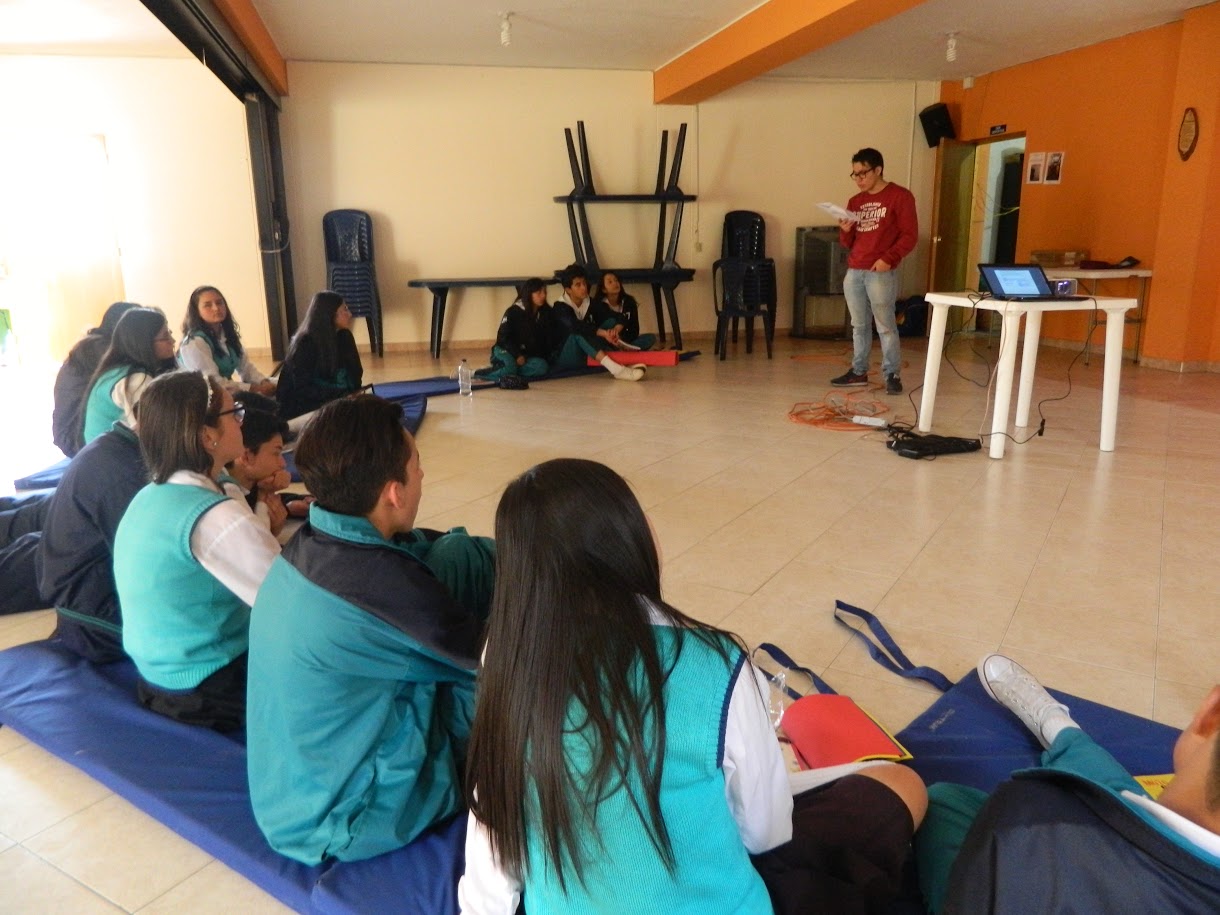 The Focolare community is preparing joyfully for the Pope’s arrival. Yolima Martínez reports from Bogotà: “We members of the Focolare will welcome him with great enthusiasm, so that his message may fill our land with hope. Colombia, she explains, is in a transitional phase, a phase of deep social divisions that continue to persist. “But we know, as Chiara Lubich taught us, that all of us are candidates for unity, so we believe that the words of the Holy Father will be a call to peace for everyone, to reconciliation and tolerance, regardless of anyone’s creed or way of thinking.” There great expectation in the air, especially among Christians. “The young people, summoned by the local Church, are preparing for this visit, preparing not only the logistical aspects, but also their own souls in view of this encounter.
The Focolare community is preparing joyfully for the Pope’s arrival. Yolima Martínez reports from Bogotà: “We members of the Focolare will welcome him with great enthusiasm, so that his message may fill our land with hope. Colombia, she explains, is in a transitional phase, a phase of deep social divisions that continue to persist. “But we know, as Chiara Lubich taught us, that all of us are candidates for unity, so we believe that the words of the Holy Father will be a call to peace for everyone, to reconciliation and tolerance, regardless of anyone’s creed or way of thinking.” There great expectation in the air, especially among Christians. “The young people, summoned by the local Church, are preparing for this visit, preparing not only the logistical aspects, but also their own souls in view of this encounter. 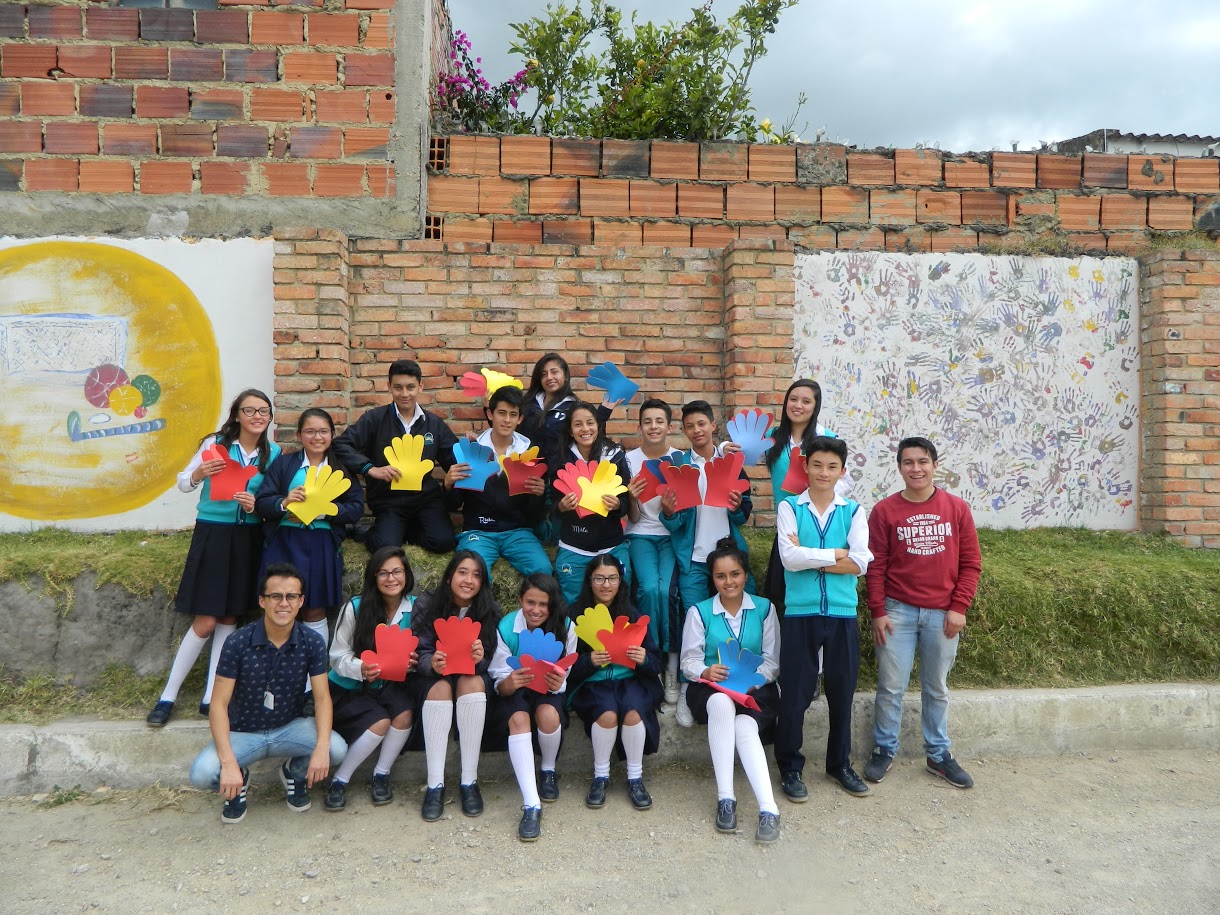 Escuela Sol Naciente in Tocancipà, north of Bogotà where the Mariapolis Centre is located, is geared toward children and teenagers between the ages of 13 and 15, to give them a global formation as individuals that are sensitive to the values of solidarity, peace and ecology. Fifteen of their students and two of their teachers will take part in the Eucharist presided by the Pope. One of them is Milena: “I’m happy to be meeting Pope Francis, because he’s one of the closest persons to the young people. He understands us and invites us to follow God and build a better society.” Laura: “The Pope’s visit inspires us to be better and to help everyone, not only the Christians, but also the people that think differently.” Andrés: “The Pope is an important figure in today’s culture, so it will be an opportunity for us to profit from his wisdom.” Yolima continues: “All the Focolare members will be at the different Eucharistic celebrations, especially in Bogotá e Medellín. Among them, Lucia and her husband, Pedro, who will approach the Pope. They will extend the greetings from the whole Focolare community in Colombia. Lucia: “We’ll have a chance to approach him for a few minutes. Our wish is to go as children of Chiara, to thank him in the name of the Movement and to assure him of our prayers.” It will be a pause in the frenzy of daily life, an invitation to stop. “In the days that Pope Francis will be visiting our country,” Yolima concludes, “we’ll be presented with the possibility of a personal encounter: the encounter with Jesus.”
Escuela Sol Naciente in Tocancipà, north of Bogotà where the Mariapolis Centre is located, is geared toward children and teenagers between the ages of 13 and 15, to give them a global formation as individuals that are sensitive to the values of solidarity, peace and ecology. Fifteen of their students and two of their teachers will take part in the Eucharist presided by the Pope. One of them is Milena: “I’m happy to be meeting Pope Francis, because he’s one of the closest persons to the young people. He understands us and invites us to follow God and build a better society.” Laura: “The Pope’s visit inspires us to be better and to help everyone, not only the Christians, but also the people that think differently.” Andrés: “The Pope is an important figure in today’s culture, so it will be an opportunity for us to profit from his wisdom.” Yolima continues: “All the Focolare members will be at the different Eucharistic celebrations, especially in Bogotá e Medellín. Among them, Lucia and her husband, Pedro, who will approach the Pope. They will extend the greetings from the whole Focolare community in Colombia. Lucia: “We’ll have a chance to approach him for a few minutes. Our wish is to go as children of Chiara, to thank him in the name of the Movement and to assure him of our prayers.” It will be a pause in the frenzy of daily life, an invitation to stop. “In the days that Pope Francis will be visiting our country,” Yolima concludes, “we’ll be presented with the possibility of a personal encounter: the encounter with Jesus.”
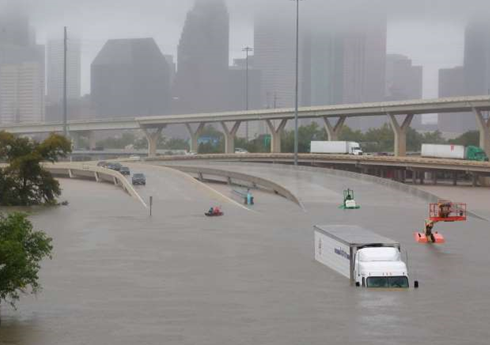
Sep 5, 2017 | Focolare Worldwide
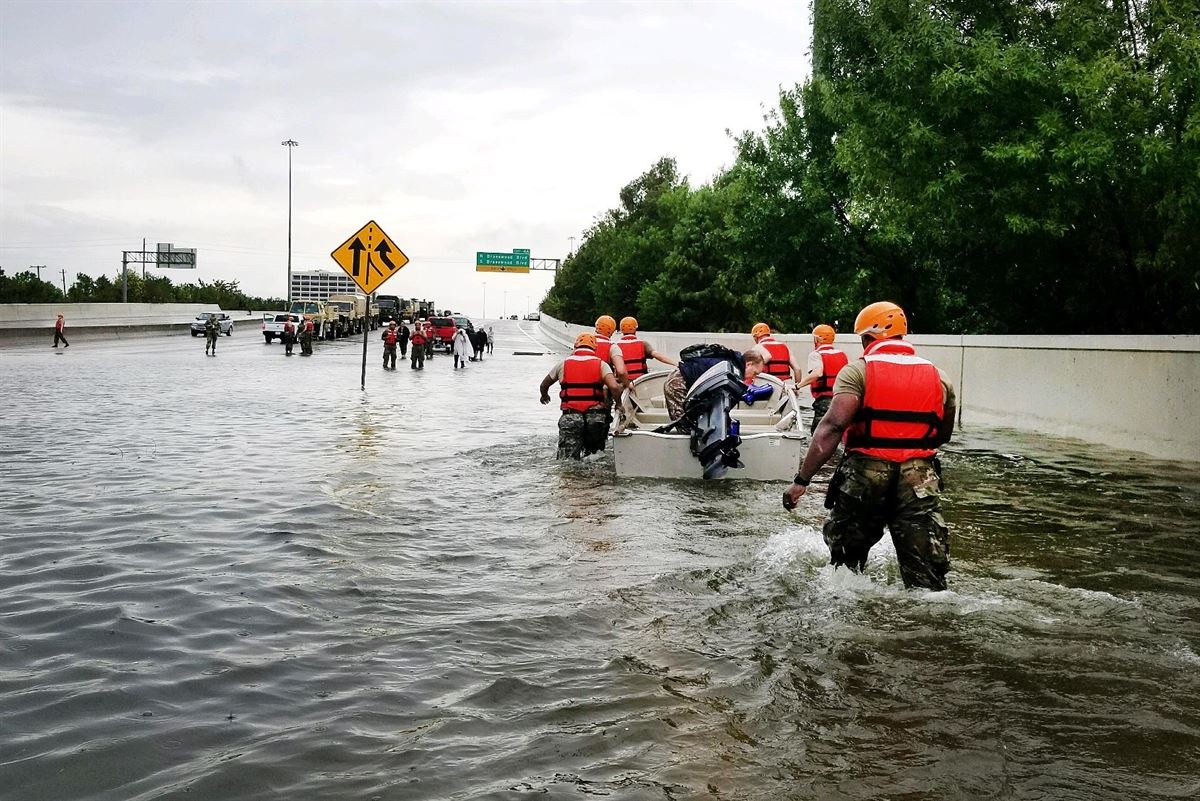 As Harvey’s fury fades and tears are shed for victims whose numbers are growing by the hour, the devastation left behind by the hurricane and the growing concern over contaminated water, especially in Houston, is becoming clearer and clearer within the city which is home to hundreds of large and important chemical and oil plants There is already a mixture of pesticides, waste and solvents that can do further damage to humans and the environment even after Harvey. Last September 1st there was a choral outcry for more attention and care for Creation just as Texas was emerging from the receding flood waters. It is not only the uncontrollable forces of nature that give us pause, but also our responsibility in using the goods of the earth. With regard to the risk of contamination: it has been estimated that the millions of people from Texas’s 38 counties that have been affected by Hurricane Harvey use private water sources that are not subjected to the same controls as public water systems and are at risk of contamination. “
As Harvey’s fury fades and tears are shed for victims whose numbers are growing by the hour, the devastation left behind by the hurricane and the growing concern over contaminated water, especially in Houston, is becoming clearer and clearer within the city which is home to hundreds of large and important chemical and oil plants There is already a mixture of pesticides, waste and solvents that can do further damage to humans and the environment even after Harvey. Last September 1st there was a choral outcry for more attention and care for Creation just as Texas was emerging from the receding flood waters. It is not only the uncontrollable forces of nature that give us pause, but also our responsibility in using the goods of the earth. With regard to the risk of contamination: it has been estimated that the millions of people from Texas’s 38 counties that have been affected by Hurricane Harvey use private water sources that are not subjected to the same controls as public water systems and are at risk of contamination. “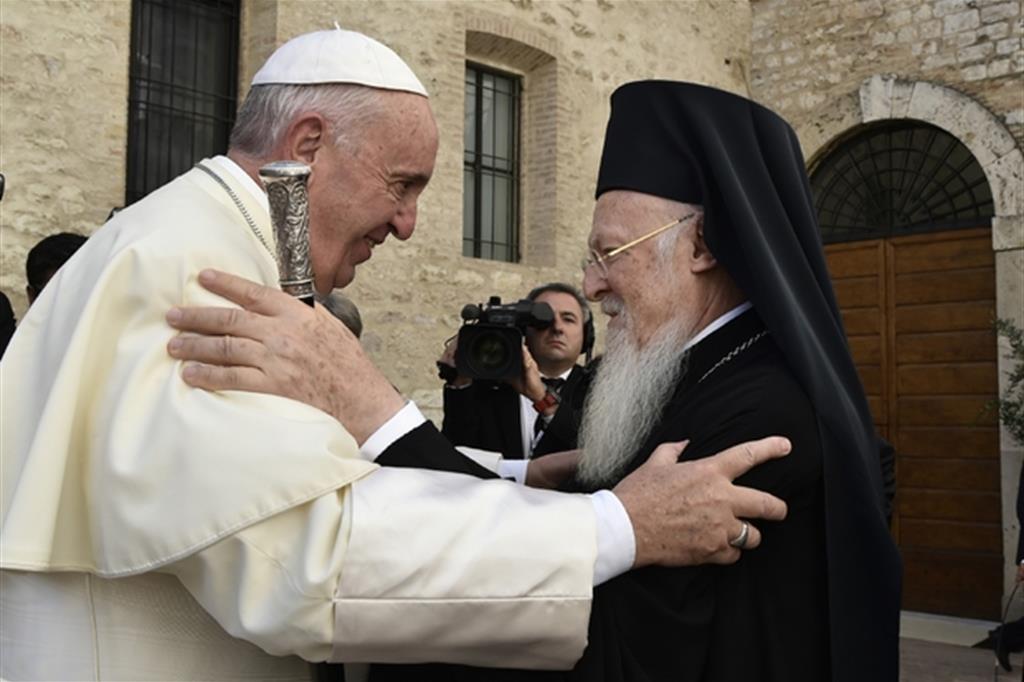 It is time to think about the tremendous power of nature and of human responsibility to be good and wise administrators of the environment,” writes Ecumenical Patriarch Bartholomew, known for his involvement in promoting care for the environment. “We are all called to to take part in the redemption and care of our world, working to stem the destructive force of such hurricanes through better environmental planning, or by being more seriously involved in combatting the serious problem of climate change and the way in which it interferes with our planet; or even to beomc personally involved on the field, with charitable projects that can help and support those whose lives are so drastically changed in the bat of an eye because of changes in the climate. In their joint statement on the Day of Prayer for Creation, Pope Francis and Patriarch Bartholomew stated: We urgently appeal to those in positions of social and economic, as well as political and cultural, responsibility to hear the cry of the earth and to attend to the needs of the marginalized, but above all to respond to the plea of millions and support the consensus of the world for the healing of our wounded creation. We are convinced that there can be no sincere and enduring resolution to the challenge of the ecological crisis and climate change unless the response is concerted and collective, unless the responsibility is shared and accountable, unless we give priority to solidarity and service.
It is time to think about the tremendous power of nature and of human responsibility to be good and wise administrators of the environment,” writes Ecumenical Patriarch Bartholomew, known for his involvement in promoting care for the environment. “We are all called to to take part in the redemption and care of our world, working to stem the destructive force of such hurricanes through better environmental planning, or by being more seriously involved in combatting the serious problem of climate change and the way in which it interferes with our planet; or even to beomc personally involved on the field, with charitable projects that can help and support those whose lives are so drastically changed in the bat of an eye because of changes in the climate. In their joint statement on the Day of Prayer for Creation, Pope Francis and Patriarch Bartholomew stated: We urgently appeal to those in positions of social and economic, as well as political and cultural, responsibility to hear the cry of the earth and to attend to the needs of the marginalized, but above all to respond to the plea of millions and support the consensus of the world for the healing of our wounded creation. We are convinced that there can be no sincere and enduring resolution to the challenge of the ecological crisis and climate change unless the response is concerted and collective, unless the responsibility is shared and accountable, unless we give priority to solidarity and service.  Meanwhile, news has arrived from the Focolare community in Houston. Joelma, Carmina and Chiara and Kate write: “Thanks for your prayers, your closeness and your many meassages that have been arriving. Everyone in our community is safe. Some had to evacuate their homes, and others had their homes flooded, but weren’t forced to leave them. The neighbourhood where the focolare house is located was on high enough land to stay dry, but it’s like an island because all the land around it is flooded. It was hard to watch all the flooding from a house that was dry and secure, knowing that the lives of many of the people around us were in danger. Unfortunately, we just learned that the relatives of several people from our community in Corpus Christi, the first Texan city to be hit by the hurricane’s fury, were killed as the six of them tried to escape the flood waters. We’re trying to understand the best way to help right now, also because it’s still very dangerous to be out driving. Two nurses from the local community, Marga and Augie, are working around the clock at their hospital due to the shortage of staff. One young person was able to travel around and reach other volunteers, and a couple with a canoe was able to give a hand rowing through neighbourhoods.
Meanwhile, news has arrived from the Focolare community in Houston. Joelma, Carmina and Chiara and Kate write: “Thanks for your prayers, your closeness and your many meassages that have been arriving. Everyone in our community is safe. Some had to evacuate their homes, and others had their homes flooded, but weren’t forced to leave them. The neighbourhood where the focolare house is located was on high enough land to stay dry, but it’s like an island because all the land around it is flooded. It was hard to watch all the flooding from a house that was dry and secure, knowing that the lives of many of the people around us were in danger. Unfortunately, we just learned that the relatives of several people from our community in Corpus Christi, the first Texan city to be hit by the hurricane’s fury, were killed as the six of them tried to escape the flood waters. We’re trying to understand the best way to help right now, also because it’s still very dangerous to be out driving. Two nurses from the local community, Marga and Augie, are working around the clock at their hospital due to the shortage of staff. One young person was able to travel around and reach other volunteers, and a couple with a canoe was able to give a hand rowing through neighbourhoods.
![LoppianoLab 2017]()
Sep 4, 2017 | Non categorizzato
 Entitled “Neither victims nor brigands. Changing the rules of the game”, the much awaited LoppianoLab event will be held in Loppiano from 30 September to 1 October 2017. The expo, which focuses on the economy, culture, communication, training and innovation, is promoted annually by Città Nuova, Lionello Bonfanti Industrial Park, Sophia University Institute and the international town of Loppiano. Immigration, work, poverty, social integration, fighting corruption, commitment to the common good, family, youth, education and other topics will be discussed during the 8th edition of LoppianoLab.
Entitled “Neither victims nor brigands. Changing the rules of the game”, the much awaited LoppianoLab event will be held in Loppiano from 30 September to 1 October 2017. The expo, which focuses on the economy, culture, communication, training and innovation, is promoted annually by Città Nuova, Lionello Bonfanti Industrial Park, Sophia University Institute and the international town of Loppiano. Immigration, work, poverty, social integration, fighting corruption, commitment to the common good, family, youth, education and other topics will be discussed during the 8th edition of LoppianoLab.
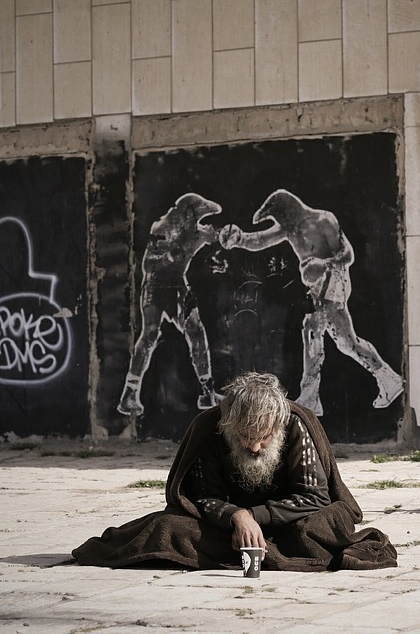
Sep 4, 2017 | Non categorizzato
 The Drunken Man I saw a rift between a drunk man and a group of kids who were disturbed by him. They suddenly pounced upon and began to beat him. It all happened so quickly. With a lot of difficulty, he managed to get back on his feet. He was spitting blood, and lost two teeth. He became hostile and threatened revenge. Then, it was just me and that despised, badly reduced and discarded man in whom Jesus was asking to be loved. I overcame a bit of fear. What if he turned on me, infuriated as he was? I provided him with hadkerchief to stop the bleeding. Then, I tried to show some concern for him. He told me about his health problems and other woes. I got him the cigarette he was trying to get; but mostly I tried to steer him away from the idea of taking revenge on those boys. It wasn’t easy to calm him down. I was also worried that those guys might come back and there would be more violence. I sat there and listened to him until he decided to go home. O. (Italy) Sick Sometimes I go through moments of rebellion, but then the desire to believe in the love of God and of my brothers and sisters prevails. I try not to let myself be beaten by the suffering. I try not to stop and focus only on me and be a burden on others. When I lost my hair because of the chemo, my friend Bruna said: “Your hairs are counted. Give them to Jesus like flowers, as a sign of your love.” Even my illness has meaning and for that I thank God. Brigitte (Germany) Peace My father worked in a shipyard. During a strike, in the 1980s, he was clubbed to death. After that, our life changed, although I was too young to realize it. We only bring it up with my Mum when some award arrives or on the anniversary of some historical anniversary. She had instilled in us the value of peace and of never taking revenge. Now, as an adult, I know that the value to be transmitted to the new generations is precisely this treasure that comes from God, but begins in me, from me. S. K. (Poland) Surprising Serenity Perfino la bidella, che aveva cambiato modo di rivolgersi a me, è diventata oggetto di nuova stima. A una collega che mi ha chiesto come facevo a mantenermi serena dopo tutto quello che mi era capitato, ho spiegato che come cristiana trovo nella verità una forza e una fonte di pace che mi dà il coraggio di ricominciare. I giorni successivi ero sorpresa io stessa dall’atmosfera distesa che regnava fra tutti.I had forgotten to inform the school office that I was going away with the children, and when I would return. Therefore, upon our return, a series of rebukes would be awaiting. It was humiliating to admit my mistake in front of my colleagues and director, also because they were all looking on me with hostility, even the ones who had always been so pleasant towards me. But drawing strength from the Gospel, I accepted defeat, trying to tranform it into love for everyone. I imagined how I would feel if I were in their shoes, and I understood their disapproval. Even J.L. – Ungheria
The Drunken Man I saw a rift between a drunk man and a group of kids who were disturbed by him. They suddenly pounced upon and began to beat him. It all happened so quickly. With a lot of difficulty, he managed to get back on his feet. He was spitting blood, and lost two teeth. He became hostile and threatened revenge. Then, it was just me and that despised, badly reduced and discarded man in whom Jesus was asking to be loved. I overcame a bit of fear. What if he turned on me, infuriated as he was? I provided him with hadkerchief to stop the bleeding. Then, I tried to show some concern for him. He told me about his health problems and other woes. I got him the cigarette he was trying to get; but mostly I tried to steer him away from the idea of taking revenge on those boys. It wasn’t easy to calm him down. I was also worried that those guys might come back and there would be more violence. I sat there and listened to him until he decided to go home. O. (Italy) Sick Sometimes I go through moments of rebellion, but then the desire to believe in the love of God and of my brothers and sisters prevails. I try not to let myself be beaten by the suffering. I try not to stop and focus only on me and be a burden on others. When I lost my hair because of the chemo, my friend Bruna said: “Your hairs are counted. Give them to Jesus like flowers, as a sign of your love.” Even my illness has meaning and for that I thank God. Brigitte (Germany) Peace My father worked in a shipyard. During a strike, in the 1980s, he was clubbed to death. After that, our life changed, although I was too young to realize it. We only bring it up with my Mum when some award arrives or on the anniversary of some historical anniversary. She had instilled in us the value of peace and of never taking revenge. Now, as an adult, I know that the value to be transmitted to the new generations is precisely this treasure that comes from God, but begins in me, from me. S. K. (Poland) Surprising Serenity Perfino la bidella, che aveva cambiato modo di rivolgersi a me, è diventata oggetto di nuova stima. A una collega che mi ha chiesto come facevo a mantenermi serena dopo tutto quello che mi era capitato, ho spiegato che come cristiana trovo nella verità una forza e una fonte di pace che mi dà il coraggio di ricominciare. I giorni successivi ero sorpresa io stessa dall’atmosfera distesa che regnava fra tutti.I had forgotten to inform the school office that I was going away with the children, and when I would return. Therefore, upon our return, a series of rebukes would be awaiting. It was humiliating to admit my mistake in front of my colleagues and director, also because they were all looking on me with hostility, even the ones who had always been so pleasant towards me. But drawing strength from the Gospel, I accepted defeat, trying to tranform it into love for everyone. I imagined how I would feel if I were in their shoes, and I understood their disapproval. Even J.L. – Ungheria
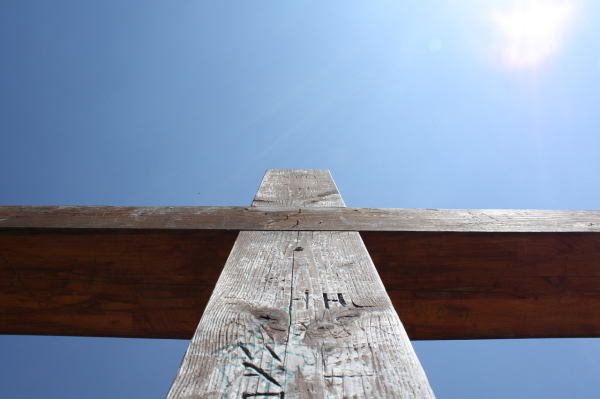
Sep 2, 2017 | Non categorizzato
 “That all may be one,” Those are amazing words! I believe it is impossible to think of words more beautiful and sublime than these. They make you dream of a world different from the one around us. It stirs your imagination to wonder what society would be like if this great ideal were fulfilled. Imagine a world where people love one another and where everyone shares the same feelings, where prisons have disappeared and the police are no longer needed. Imagine newspapers that do not report bad news – which is now out of fashion – but ‘golden news’ about divinely beautiful and deeply human events. It is a world where people sing, Yes, where they play, study, and work, but everything is done in harmony, where everyone does what they do to please God and their neighbours. I think we shall only see this world in Paradise. Yet Jesus spoke those words for us here, on earth. … I opened the Gospel and found another phrase that seemed uncannily like this one, as though a secret bond exists between it and our motto. It says, “When I am lifted up from the earth, I will draw all people to myself.” (Jn 12:32). “When I am lifted up from the earth…”. So Jesus did not make us “all one” through his wonderful words or his extraordinary miracles. The Cross was his secret. It was His suffering that solved the problem of making us all children of God and one amongst us. Could suffering, then, be the way, the key, and the secret to bringing unity among all people? Could it be the way to transform a boring and often wicked world into one that is joyful, shining with love and a foretaste of heaven? Yes, it is. As far as we know, the saints, who were genuinely intelligent, placed great value on suffering and the cross. They attracted huge numbers of followers and often left their mark on history — continuing to do good in future centuries. When I was a small child, a priest told me, “There is an empty place on the cross.” Turning over the crucifix that was on his table, he showed me the back and added, “This place is for you!” Okay then! If this is how it is, we are ready! What are we waiting for? In any case, large or small sufferings, accepted well or badly, will always be part of our life. We do not want to be opportunists! We are Christians! Is Jesus on the cross? I want to be there too. I will accept all the little crosses in my life joyfully. Yes, joyfully, even if I shed some tears. Nevertheless, deep down in my heart, I will tell Him who is listening to me: “I am happy. By suffering with You, I can help you draw all people to Yourself. In this way, we shall draw closer to the day when your great desire, ‘That all may be one,’ shall be fulfilled.”
“That all may be one,” Those are amazing words! I believe it is impossible to think of words more beautiful and sublime than these. They make you dream of a world different from the one around us. It stirs your imagination to wonder what society would be like if this great ideal were fulfilled. Imagine a world where people love one another and where everyone shares the same feelings, where prisons have disappeared and the police are no longer needed. Imagine newspapers that do not report bad news – which is now out of fashion – but ‘golden news’ about divinely beautiful and deeply human events. It is a world where people sing, Yes, where they play, study, and work, but everything is done in harmony, where everyone does what they do to please God and their neighbours. I think we shall only see this world in Paradise. Yet Jesus spoke those words for us here, on earth. … I opened the Gospel and found another phrase that seemed uncannily like this one, as though a secret bond exists between it and our motto. It says, “When I am lifted up from the earth, I will draw all people to myself.” (Jn 12:32). “When I am lifted up from the earth…”. So Jesus did not make us “all one” through his wonderful words or his extraordinary miracles. The Cross was his secret. It was His suffering that solved the problem of making us all children of God and one amongst us. Could suffering, then, be the way, the key, and the secret to bringing unity among all people? Could it be the way to transform a boring and often wicked world into one that is joyful, shining with love and a foretaste of heaven? Yes, it is. As far as we know, the saints, who were genuinely intelligent, placed great value on suffering and the cross. They attracted huge numbers of followers and often left their mark on history — continuing to do good in future centuries. When I was a small child, a priest told me, “There is an empty place on the cross.” Turning over the crucifix that was on his table, he showed me the back and added, “This place is for you!” Okay then! If this is how it is, we are ready! What are we waiting for? In any case, large or small sufferings, accepted well or badly, will always be part of our life. We do not want to be opportunists! We are Christians! Is Jesus on the cross? I want to be there too. I will accept all the little crosses in my life joyfully. Yes, joyfully, even if I shed some tears. Nevertheless, deep down in my heart, I will tell Him who is listening to me: “I am happy. By suffering with You, I can help you draw all people to Yourself. In this way, we shall draw closer to the day when your great desire, ‘That all may be one,’ shall be fulfilled.”
Chiara Lubich
From “Conversations with the Gen” 1966-1969, Citta’ Nuova, Roma, 1998 pp 35-36
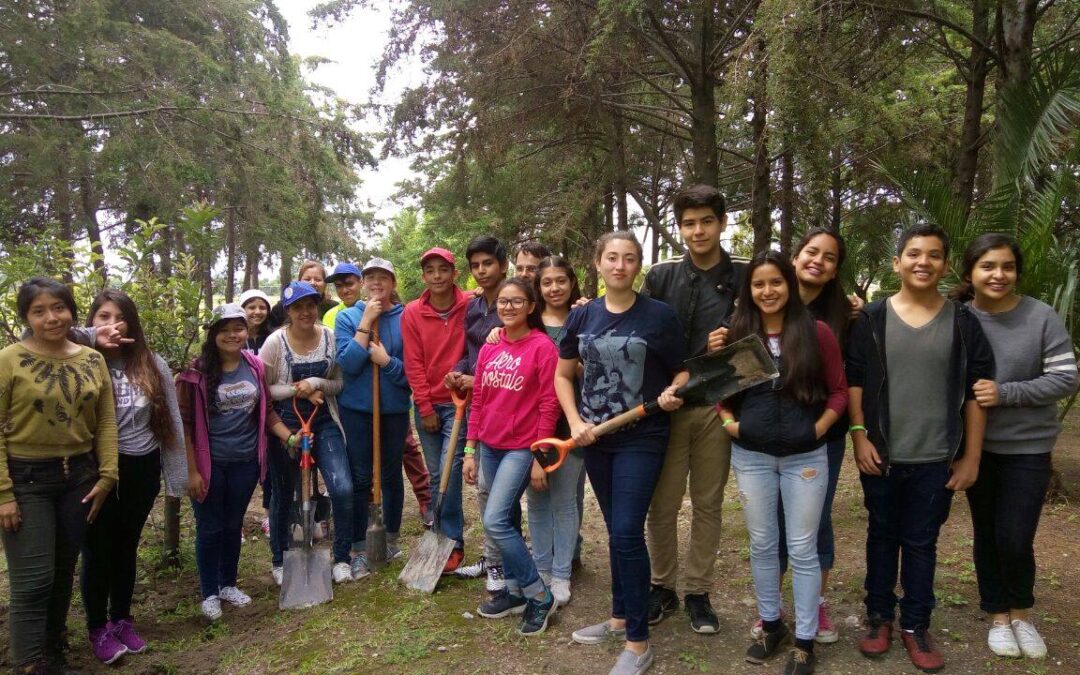
Sep 1, 2017 | Focolare Worldwide, Senza categoria
 From Central and South America, to Europe, Afica and Middle East, fifty laboratories for forming people who are open, inclusive, world citizens who wish to offer the wealth of their own cultures while being open to that of others. Every three years the Focolare’s Teens for Unity hold a series of international workshops in which they can be formed in a culture of fraternity as the antidote to division, intolerance and hate. Each workshop had two phases. The first phase consisted in learning to know and respect the other’s culture as one’s own. The second, to take concrete action, especially in the most needy peripheries with the most disadvantaged people: the homeless, orphans, immigrants and Rom. In Lithuania, the teenagers of the workshops – which included groups from Switzerland – visited a hospital for the disabled and mentally ill where they managed to engage a girl who was usually unresponsive to any kind of stimulation. In the small European state of Škofia Loka, Slovenia, their goal was to engage the homeless. In Bratisslava, German and Slovak teenagers volunteered to clean the shores of the Danube, where they collected six tons of trash. There were also concerts, flashmobs, and folk festivals on several public squares of Eastern Europe which caught the curiosity and intererst of the media. Several teenagers were interviewed on national television at Mariapolis Faro. The Mariapolis in Croatia was turned into an international microcosm with 280 teenagers from 22 nations, and twelve translations for teenagers from such places as Palestine, Israel, Lebanon, Jordan, Syria and Venezuela. “When I talked with the guys from Venezuela,” says a girl from the Holy Land, “I found out that there are problems in every country. We’re at war, but at least we have food to eat. In Venezuela, they don’t even have any. So, I brought a basket and suggested that we put what we had in common.” Another teenager: “From now on, when someone asks me how many brothers and sisters I have, I’ll say 280!” “A group of girls arriving from the United State lost their luggage at the airport. The luggage was located and returned to them a few days later. In the meantime – used as they were to always having everything they needed – they experienced what it’s like to depend on the love (and clothing) of others. In Serbia, the workshop opened in Cardak, an hour drive from Belgrade. The teenagers were hosted at a state institute, in a wooded area where hundreds of refugees had recently passed from the Balkans: a simbol of beauty and suffering in the tormented march toward the unity of peoples, Churches and religions. They also experienced the diversity of religions – many of them Christian and Muslim – and of different traditions – among them Catholic, Orthodox, Lutheran, Evangelical and Anglican. Some didn’t confess any particular creed, but everyone felt perfectly integrated.
From Central and South America, to Europe, Afica and Middle East, fifty laboratories for forming people who are open, inclusive, world citizens who wish to offer the wealth of their own cultures while being open to that of others. Every three years the Focolare’s Teens for Unity hold a series of international workshops in which they can be formed in a culture of fraternity as the antidote to division, intolerance and hate. Each workshop had two phases. The first phase consisted in learning to know and respect the other’s culture as one’s own. The second, to take concrete action, especially in the most needy peripheries with the most disadvantaged people: the homeless, orphans, immigrants and Rom. In Lithuania, the teenagers of the workshops – which included groups from Switzerland – visited a hospital for the disabled and mentally ill where they managed to engage a girl who was usually unresponsive to any kind of stimulation. In the small European state of Škofia Loka, Slovenia, their goal was to engage the homeless. In Bratisslava, German and Slovak teenagers volunteered to clean the shores of the Danube, where they collected six tons of trash. There were also concerts, flashmobs, and folk festivals on several public squares of Eastern Europe which caught the curiosity and intererst of the media. Several teenagers were interviewed on national television at Mariapolis Faro. The Mariapolis in Croatia was turned into an international microcosm with 280 teenagers from 22 nations, and twelve translations for teenagers from such places as Palestine, Israel, Lebanon, Jordan, Syria and Venezuela. “When I talked with the guys from Venezuela,” says a girl from the Holy Land, “I found out that there are problems in every country. We’re at war, but at least we have food to eat. In Venezuela, they don’t even have any. So, I brought a basket and suggested that we put what we had in common.” Another teenager: “From now on, when someone asks me how many brothers and sisters I have, I’ll say 280!” “A group of girls arriving from the United State lost their luggage at the airport. The luggage was located and returned to them a few days later. In the meantime – used as they were to always having everything they needed – they experienced what it’s like to depend on the love (and clothing) of others. In Serbia, the workshop opened in Cardak, an hour drive from Belgrade. The teenagers were hosted at a state institute, in a wooded area where hundreds of refugees had recently passed from the Balkans: a simbol of beauty and suffering in the tormented march toward the unity of peoples, Churches and religions. They also experienced the diversity of religions – many of them Christian and Muslim – and of different traditions – among them Catholic, Orthodox, Lutheran, Evangelical and Anglican. Some didn’t confess any particular creed, but everyone felt perfectly integrated.  At Paztún, in the Maya Kapchikel region of Guatamala, the workshop from Central America gathered 160 teenagers from Panama, Costa Rica, Honduras, El Salvador and Guatamala, along with some teenagers from the Quiché ethnic group in Santa Lucia Utatlán. The indiscriminate chopping down of entire forests – a real wound to the land – urged them to plant on a stretch of public land, thousands of fur trees that were donated by the state.In the Southern Cone, Global Citizen took on the color of social action with projects that favored knowing one another and valuing the richness of the South American people. In the workshop at Cunaco. Educational and recreational workshops were held in Chile, along with solidarity projects. In Paraguay there were seminars, visits to Guaraní communities of Ita and a day with the teenagers from Barrio Vida, a social centre animated by the Focolare periphery of Motevideo. It included activities for children, workshops, sport tournaments and games for the public. In Argentina they shared in the life of their peers from the Island of Margherita, in the region of the Tigre, north of Buenos Aires on the Rio de la Plata.
At Paztún, in the Maya Kapchikel region of Guatamala, the workshop from Central America gathered 160 teenagers from Panama, Costa Rica, Honduras, El Salvador and Guatamala, along with some teenagers from the Quiché ethnic group in Santa Lucia Utatlán. The indiscriminate chopping down of entire forests – a real wound to the land – urged them to plant on a stretch of public land, thousands of fur trees that were donated by the state.In the Southern Cone, Global Citizen took on the color of social action with projects that favored knowing one another and valuing the richness of the South American people. In the workshop at Cunaco. Educational and recreational workshops were held in Chile, along with solidarity projects. In Paraguay there were seminars, visits to Guaraní communities of Ita and a day with the teenagers from Barrio Vida, a social centre animated by the Focolare periphery of Motevideo. It included activities for children, workshops, sport tournaments and games for the public. In Argentina they shared in the life of their peers from the Island of Margherita, in the region of the Tigre, north of Buenos Aires on the Rio de la Plata.
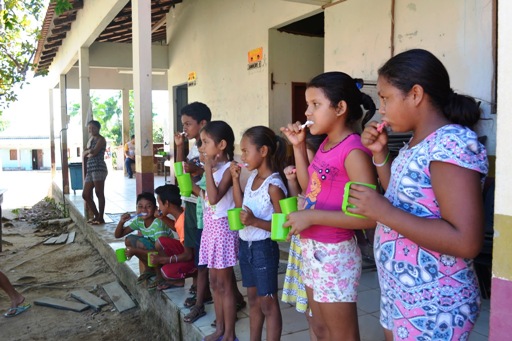
Aug 31, 2017 | Focolare Worldwide
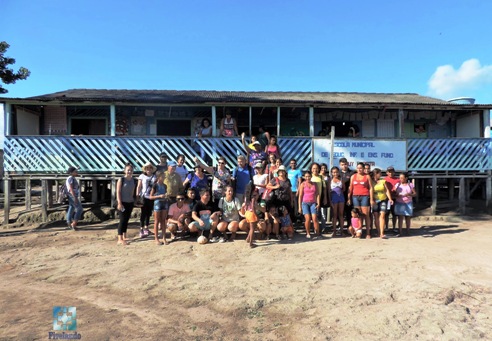 Óbidos, on the left bank of the Amazon River, about 682 miles from the capital, Belem, is a city of almost 50,000 inhabitants. There is only one hospital, which is run by the Third Order of St. Francis and absolutely insufficient to assist the most serious cases. After an appeal of the Brazilian Conference of Bishops, for some years now a big group of doctors, nurses and common people, have undertaken journeys to bring healthcare and support to the population, especially in the river communities. The Amazon Project is now known to many. Upon reaching Óbidos in July, the “missionaries” of this year consisting of about 40 people from various parts of Brazil, gathered during the recent Run4Unity of Belém, and enjoyed the cooperation and hospitality of the local families. Preparations for this event took several months, and dispatches were made – by air and river – of 15 big boxes of medicine, dentistry material and toys. The Mayor hosted four participants, placed at the disposal of the missionaries, a boat and a coach which was used to visit the communities in the interior of the “ribeirinhas” (three communities that never receive medical care and rarely go to the city), and paid for the services of a cook during their stay. The first community encountered were the 2,000 people living in an area next to a “lixão” (dumpsite). The group stayed there for three days. Much more than the figures (8 days, 611 medical checkups and 221 dental checkups) the remarks of the protagonists, doctors and local people stand out. A woman who was treated for a strong headache, returned after a few days to breathe that atmosphere which she described as “the air of paradise.” At the end of the “treatment” her headache had almost disappeared. Eliane comes from São Paulo: “Before coming here, I gathered information on the internet. But here, things are a completely different thing, a lesson I shall remember all my life. After the trauma I underwent – referring to the recent death of her husband – I thought I would remain indifferent to any other pain. Instead, I now am full of ideas and a great desire to help!”
Óbidos, on the left bank of the Amazon River, about 682 miles from the capital, Belem, is a city of almost 50,000 inhabitants. There is only one hospital, which is run by the Third Order of St. Francis and absolutely insufficient to assist the most serious cases. After an appeal of the Brazilian Conference of Bishops, for some years now a big group of doctors, nurses and common people, have undertaken journeys to bring healthcare and support to the population, especially in the river communities. The Amazon Project is now known to many. Upon reaching Óbidos in July, the “missionaries” of this year consisting of about 40 people from various parts of Brazil, gathered during the recent Run4Unity of Belém, and enjoyed the cooperation and hospitality of the local families. Preparations for this event took several months, and dispatches were made – by air and river – of 15 big boxes of medicine, dentistry material and toys. The Mayor hosted four participants, placed at the disposal of the missionaries, a boat and a coach which was used to visit the communities in the interior of the “ribeirinhas” (three communities that never receive medical care and rarely go to the city), and paid for the services of a cook during their stay. The first community encountered were the 2,000 people living in an area next to a “lixão” (dumpsite). The group stayed there for three days. Much more than the figures (8 days, 611 medical checkups and 221 dental checkups) the remarks of the protagonists, doctors and local people stand out. A woman who was treated for a strong headache, returned after a few days to breathe that atmosphere which she described as “the air of paradise.” At the end of the “treatment” her headache had almost disappeared. Eliane comes from São Paulo: “Before coming here, I gathered information on the internet. But here, things are a completely different thing, a lesson I shall remember all my life. After the trauma I underwent – referring to the recent death of her husband – I thought I would remain indifferent to any other pain. Instead, I now am full of ideas and a great desire to help!”  Tiago, a youth from Óbidos is participating for the second time in the Project. Since he couldn’t buy a pair of eyeglasses, a collection was made: “Seeing so much generosity made me want to do something myself!” Ana Carla (doctor): “I realised that our reality is not the worst one! Upon listening to some mothers that their son had never been visited by a doctor made me think: I may not be able to solve the problem, but I can love, listen, give comfort, or a drug. This is already something. I don’t feel tired, but my weariness lies in having to ask: “What does your child eat?” and hear them answer: “flour.” Amanda is studying medicine: “I now see medicine with another vision: in front of me is the sick person and not only his illness. We cannot be satisfied only by prescribing a drug, we have to treat the person.” Ereh is a boy from Óbidos: “It is difficult to live in this situation. Mateus and I do volunteer work with children.” Solange (Belém): “When I heard about the Project, I was very interested and I asked my family’s permission to participate. I only received criticisms, but when I got here, I found a family environment which I didn’t expect. I was surprised to see the youths who, in the month of July, give up their holidays.” Also Marcos is a student of medicine: “I found myself in the impossibility of resolving serious situations, since I didn’t have the means to cure them, but only give relief. We must have the courage to make a hands-on experience and help the youths who have turned to stone in their city. Drug addiction is not the only vice, but there are others: remaining closed up in ourselves, in one’s own ego.” Victor (Santarém): “in the name of the entire Amazon, I thank you all who have left your zones to come to our peripheries.” The Project now proceeds with the diffusion and gathering of useful material and finances, so that more can be done next year.
Tiago, a youth from Óbidos is participating for the second time in the Project. Since he couldn’t buy a pair of eyeglasses, a collection was made: “Seeing so much generosity made me want to do something myself!” Ana Carla (doctor): “I realised that our reality is not the worst one! Upon listening to some mothers that their son had never been visited by a doctor made me think: I may not be able to solve the problem, but I can love, listen, give comfort, or a drug. This is already something. I don’t feel tired, but my weariness lies in having to ask: “What does your child eat?” and hear them answer: “flour.” Amanda is studying medicine: “I now see medicine with another vision: in front of me is the sick person and not only his illness. We cannot be satisfied only by prescribing a drug, we have to treat the person.” Ereh is a boy from Óbidos: “It is difficult to live in this situation. Mateus and I do volunteer work with children.” Solange (Belém): “When I heard about the Project, I was very interested and I asked my family’s permission to participate. I only received criticisms, but when I got here, I found a family environment which I didn’t expect. I was surprised to see the youths who, in the month of July, give up their holidays.” Also Marcos is a student of medicine: “I found myself in the impossibility of resolving serious situations, since I didn’t have the means to cure them, but only give relief. We must have the courage to make a hands-on experience and help the youths who have turned to stone in their city. Drug addiction is not the only vice, but there are others: remaining closed up in ourselves, in one’s own ego.” Victor (Santarém): “in the name of the entire Amazon, I thank you all who have left your zones to come to our peripheries.” The Project now proceeds with the diffusion and gathering of useful material and finances, so that more can be done next year.
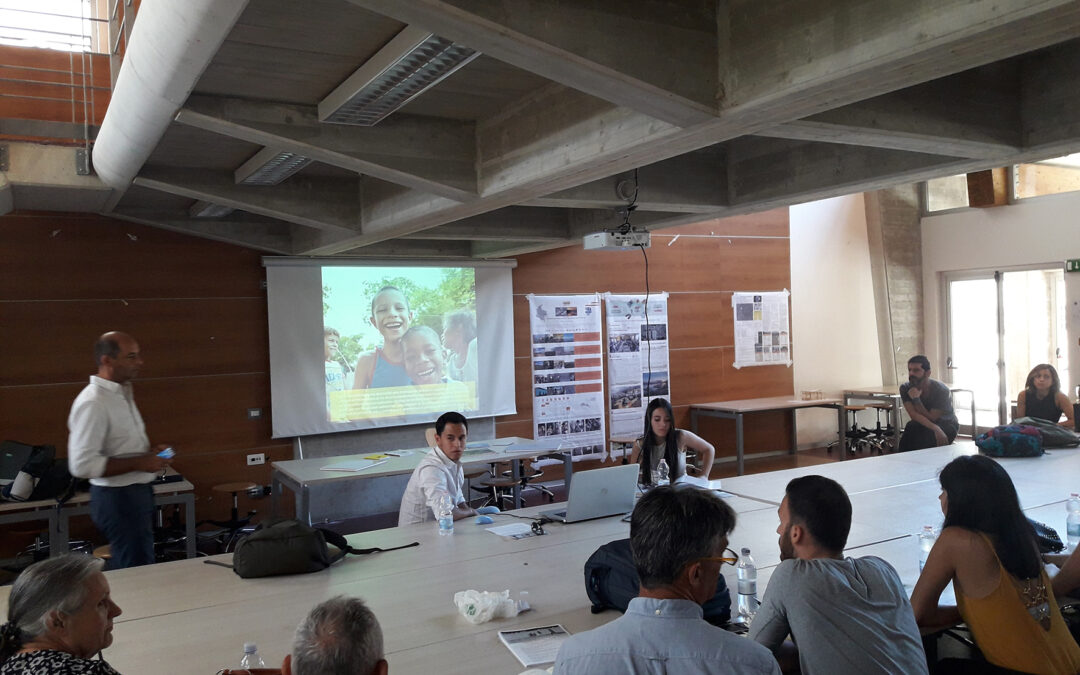
Aug 30, 2017 | Focolare Worldwide, Senza categoria
 To inhabit a place in just two weeks, a place that is geographically and culturally far away from your home. This was the challenge of Habitandando: to build new bridges between, and on the other hand, a young and contrasted people, whose richness and inequalities are reflected also in its territory – made of megalopolises and immense regions. However, how do you build a bridge between Italy and Colombia in just fifteen days? How can you get to inhabit a place, to become familiar with it as if it were your home? Travel as a method therefore: to get to know a place by experiencing it, using as a testing ground for generating new and challenging ideas. And even this year, the experiences were the most diverse: crossing Central Italy by car, to distinguish how landscapes change from the coast to the mountains; living at Piazza del Campo in Siena, to observe how a public space has been functioning perfectly for centuries; walking for many hours around the centre of Rome, to distinguish each epoch in the thousand layers composing the city; exploring Tor Bella Monaca, a neighbourhood in the Roman periphery where failed architecture projects add up to a fragile social condition.
To inhabit a place in just two weeks, a place that is geographically and culturally far away from your home. This was the challenge of Habitandando: to build new bridges between, and on the other hand, a young and contrasted people, whose richness and inequalities are reflected also in its territory – made of megalopolises and immense regions. However, how do you build a bridge between Italy and Colombia in just fifteen days? How can you get to inhabit a place, to become familiar with it as if it were your home? Travel as a method therefore: to get to know a place by experiencing it, using as a testing ground for generating new and challenging ideas. And even this year, the experiences were the most diverse: crossing Central Italy by car, to distinguish how landscapes change from the coast to the mountains; living at Piazza del Campo in Siena, to observe how a public space has been functioning perfectly for centuries; walking for many hours around the centre of Rome, to distinguish each epoch in the thousand layers composing the city; exploring Tor Bella Monaca, a neighbourhood in the Roman periphery where failed architecture projects add up to a fragile social condition.  The travel is the method and the territory is the classroom. Each stage of the travel was devoted to a specific issue: for example, the Tuscany countryside explains territory and landscape, the Amalfi Coast shows both the antique and the modern, the towns hit by earthquakes in Central Italy show the relationship between memory and catastrophe. Having the territory as classroom allows first-hand observation of each issue, but is it’s not simply a way of going beyond the simplistic explanations by tourist guides and school textbooks. Rather, it is an occasion to incrementally build by yourself the knowledge on a given place. In fact, the participants were asked to focus on each place that they visited by writing pieces for different audiences, taking photographs with different communicative aims, developing their own explanations on specific settings and phenomena. Day by day, the first ingenuous reactions leave space to deeper reasonings. Maybe Tor Bella Monaca, the neighbourhood in the Roman periphery, provides the most interesting example: the initial skepticism (“Is this a poor and degraded neighbourhood? If only all poor places in Colombia were like this!”) is replaced by all the new ideas that it can generate. The participants’ disorientated looks of the first days were gradually replaced by more relaxed ones, once a relationship was established with the visited places and also the challenges facing them. The tension between memory and innovation were the guiding thread behind this year’s initiative, and this emerged also from the comments made at the end of the travel. For a Colombian student, Italy carries with her centuries of history but does not know how to manage such heritage, does not understand how nowadays heritage can interact with the demands of the habitat. These reflections were developed in the last days of the travel, spent in Montefalcone Appennino, It was the beginning of a think-tank which can yield varying results, but which already demonstrates what can be achieved through a new way of studying the habitat, by going out of the classrooms into the territory, inhabiting it on the move so to speak: to inhabit a place is not just to know it, but also to start imagining it differently from what it is right now. Compiled by Dialogue in Architecture
The travel is the method and the territory is the classroom. Each stage of the travel was devoted to a specific issue: for example, the Tuscany countryside explains territory and landscape, the Amalfi Coast shows both the antique and the modern, the towns hit by earthquakes in Central Italy show the relationship between memory and catastrophe. Having the territory as classroom allows first-hand observation of each issue, but is it’s not simply a way of going beyond the simplistic explanations by tourist guides and school textbooks. Rather, it is an occasion to incrementally build by yourself the knowledge on a given place. In fact, the participants were asked to focus on each place that they visited by writing pieces for different audiences, taking photographs with different communicative aims, developing their own explanations on specific settings and phenomena. Day by day, the first ingenuous reactions leave space to deeper reasonings. Maybe Tor Bella Monaca, the neighbourhood in the Roman periphery, provides the most interesting example: the initial skepticism (“Is this a poor and degraded neighbourhood? If only all poor places in Colombia were like this!”) is replaced by all the new ideas that it can generate. The participants’ disorientated looks of the first days were gradually replaced by more relaxed ones, once a relationship was established with the visited places and also the challenges facing them. The tension between memory and innovation were the guiding thread behind this year’s initiative, and this emerged also from the comments made at the end of the travel. For a Colombian student, Italy carries with her centuries of history but does not know how to manage such heritage, does not understand how nowadays heritage can interact with the demands of the habitat. These reflections were developed in the last days of the travel, spent in Montefalcone Appennino, It was the beginning of a think-tank which can yield varying results, but which already demonstrates what can be achieved through a new way of studying the habitat, by going out of the classrooms into the territory, inhabiting it on the move so to speak: to inhabit a place is not just to know it, but also to start imagining it differently from what it is right now. Compiled by Dialogue in Architecture

Aug 29, 2017 | Non categorizzato
 We received this message from a member of the Focolare community in Houston: “We live near downtown Houston. Many of our streets have become like rivers. Images of our neighbourhood are shown with the city centre skyline in the background. Fortunately we live on an elevated street, but the people who live below are all being evacuated. Many of the homes of our community members are destroyed. One of us who is a nurse is stranded at the hospital, along with four others, and no one can have access because the streets around the district are flooded. Emergency teams are working round the clock, taking turns to eat and rest. The saddest thing is that many of the people who are affected are elderly. There is nothing we can do to help at the moment because we are totally isolated. Thank you for your prayers.”
We received this message from a member of the Focolare community in Houston: “We live near downtown Houston. Many of our streets have become like rivers. Images of our neighbourhood are shown with the city centre skyline in the background. Fortunately we live on an elevated street, but the people who live below are all being evacuated. Many of the homes of our community members are destroyed. One of us who is a nurse is stranded at the hospital, along with four others, and no one can have access because the streets around the district are flooded. Emergency teams are working round the clock, taking turns to eat and rest. The saddest thing is that many of the people who are affected are elderly. There is nothing we can do to help at the moment because we are totally isolated. Thank you for your prayers.”
Aug 29, 2017 | Non categorizzato
At the invitation of the Columbian bishops and of President of the Republic, Juan Manuel Santos Calderón, who received Nobel Peace Prize in 2016, Pope Francis will make an apostolic visit to the South American nation on September 6 – 11. The visit is a sign of support during the difficult peace process in a land that has been proven by years of civil war, and a gesture in favour of reconciliation. “The Pope’s presence will help discover that it is possible to come together as a nation learn how to see one another with new eyes of hope and forgiveness,” said Bishop Fabio Suescún Mutis, who heads the preperatory commitee. The symbolic dimension of the trip is provided by the Pope himself as he takes the first step, encouraging everyone to begin dreaming of and building a future of peace.
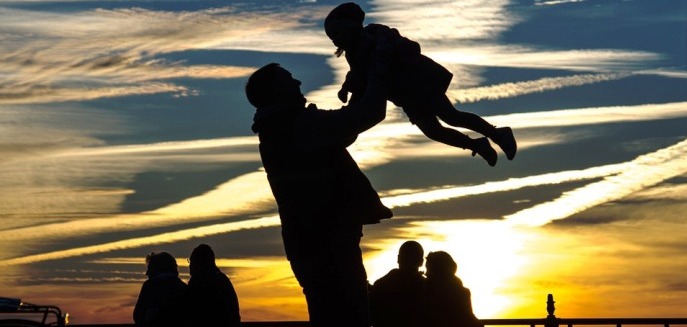
Aug 29, 2017 | Focolare Worldwide
 New flowering “As Christians, my wife and I decided to adopt two sisters. Unfortunately, due to bad company, both have ended up in the drug cycle. Since then, a Calvary began for us: abortions, undesired children, problems with the law. We undertook to make our home a place of peace where they are welcomed. Now, the elder one is slowly recovering and not only wants to take care of her baby girl but also the son of her sister who is still in the drug tunnel. We are witnessing life blooming again.” (M and D. H. – Switzerland) An innocent absolved «I am a lawyer by profession. Some months ago I took the defence of a Sudanese citizen accused of being a transporter of immigrants and even a member of a criminal organization. He was seen at the helm of a boat that was transporting 119 migrants, among which were women and children. In the interviews held with him in jail, I realized that he was a refugee like the others, and had been abandoned by the transporter, and had taken the courage to take the helm of the boat despite his lack of experience, to save himself along with the others. Unfortunately they did not believe his recount. On taking the defence of this youth’s suffering, I decided to demonstrate his innocence despite the fact that, due to his poverty, he couldn’t have paid my fees. Of course, I could have made use of the sponsorship of the State, which however, does not always pay and if ever, the payments are inadequate. But he was a brother, and during the trial I did my best to defend him. In the end, he was absolved.” (S. – Italy) The “agreement” «As always, dad had drunk more than necessary and there was tension at home. Since nobody said a word, I took the courage, and looking him straight in the eye, told him of the suffering and dismay he was causing us due to his vice. Then also the other brothers spoke up. Things then changed and in the family a sort of agreement was made and now dad is doing his best to be faithful to his promise not to drink. Closing our eyes had not been a way of helping him, and we had to tell him the truth, with love. And together we succeeded.” (N.N. – South America) A son’s gratitude «As time passes my gratitude towards my mom grows. After dad had abandoned us, she had continued to work hard so that we, the four children, wouldn’t lack in anything. One day she went to the funeral of her brother-in-law and returned with an eight-month-old baby in her arms. Her sister was not in the condition to care for him. This was how we were raised. I think that the goodness which now reigns in our families is a fruit of the grandeur of my mother, who did not think of herself, but always of the others.” (C. A. – Poland)
New flowering “As Christians, my wife and I decided to adopt two sisters. Unfortunately, due to bad company, both have ended up in the drug cycle. Since then, a Calvary began for us: abortions, undesired children, problems with the law. We undertook to make our home a place of peace where they are welcomed. Now, the elder one is slowly recovering and not only wants to take care of her baby girl but also the son of her sister who is still in the drug tunnel. We are witnessing life blooming again.” (M and D. H. – Switzerland) An innocent absolved «I am a lawyer by profession. Some months ago I took the defence of a Sudanese citizen accused of being a transporter of immigrants and even a member of a criminal organization. He was seen at the helm of a boat that was transporting 119 migrants, among which were women and children. In the interviews held with him in jail, I realized that he was a refugee like the others, and had been abandoned by the transporter, and had taken the courage to take the helm of the boat despite his lack of experience, to save himself along with the others. Unfortunately they did not believe his recount. On taking the defence of this youth’s suffering, I decided to demonstrate his innocence despite the fact that, due to his poverty, he couldn’t have paid my fees. Of course, I could have made use of the sponsorship of the State, which however, does not always pay and if ever, the payments are inadequate. But he was a brother, and during the trial I did my best to defend him. In the end, he was absolved.” (S. – Italy) The “agreement” «As always, dad had drunk more than necessary and there was tension at home. Since nobody said a word, I took the courage, and looking him straight in the eye, told him of the suffering and dismay he was causing us due to his vice. Then also the other brothers spoke up. Things then changed and in the family a sort of agreement was made and now dad is doing his best to be faithful to his promise not to drink. Closing our eyes had not been a way of helping him, and we had to tell him the truth, with love. And together we succeeded.” (N.N. – South America) A son’s gratitude «As time passes my gratitude towards my mom grows. After dad had abandoned us, she had continued to work hard so that we, the four children, wouldn’t lack in anything. One day she went to the funeral of her brother-in-law and returned with an eight-month-old baby in her arms. Her sister was not in the condition to care for him. This was how we were raised. I think that the goodness which now reigns in our families is a fruit of the grandeur of my mother, who did not think of herself, but always of the others.” (C. A. – Poland)
Aug 28, 2017 | Non categorizzato
A fourth interfaith summer school is underway from August 25th to August 30th in Tonadico, Italy. The title of the course is “Interfaith Engagement in Theory and Practice.” It os promoted by Sophia University Institute (SUI) in collaboration with the Islamic Institute of England and the Risalat Institute in Qum, Iran. Forty two Christian, Muslim and Shiite students have come together for the school, and instructors include SUI president, Dr Piero Coda and Mohammad Shomali, Director of the London Islamic Centre. The goal of the school is to provide a space for sharing and reflection on the cultural and religious patrimony of Christianity and Islam, as well as future plans for dialogue and mutual collaboration in the light of current challenges.
Aug 28, 2017 | Non categorizzato, Word of
Jesus was in the midst of his public life, proclaiming the kingdom of God was near, and he was preparing to go to Jerusalem. His disciples had some insight into the greatness of his mission. They realized he was the one sent by God, whom the whole people of Israel was waiting for. They looked forward to being freed from Roman rule, to the dawn of a better world where there would be peace and prosperity. But Jesus did not want to encourage these illusions. He said clearly that his journey to Jerusalem would not lead to triumph but rather to rejection, suffering and death. He also revealed that he would rise again on the third day. Those words were so hard to understand and accept that Peter protested and opposed such an absurd idea. He tried, in fact, to dissuade Jesus. After a firm rebuke to Peter, Jesus turned to the disciples with a shocking invitation. “If any want to become my followers, let them deny themselves and take up their cross and follow me.” (Mt 16:24) With these words, what was Jesus really asking from his disciples both then and now? Does he want us to despise ourselves? Does he want us to devote ourselves to a life of austerity and discipline? Is he asking us to seek out suffering so as to be more pleasing to God? This Word of Life exhorts us rather to walk in Jesus’ footsteps, to accept the values and demands of the Gospel in order to be ever more like him. This means living all of life fully, as he did, even when the shadow of the cross appears on our path. “If any want to become my followers, let them deny themselves and take up their cross and follow me.” We cannot deny it: each of us has our own cross. Suffering in its various forms is part of human life. Yet it seems beyond our understanding, the opposite of our desire for happiness. But it is precisely in this that Jesus teaches us to discover an unexpected light. It is like those times when you go into a dark church and discover how the stained-glass windows look so wonderful and bright, rather than dull and dreary as they did from the outside. If we want to follow him, Jesus asks us to reverse our value system, shifting ourselves away from the center of our world and rejecting the logic that seeks our own good. He suggests that we pay more attention to other people’s needs than our own, spending our energy in making them happy, as he did. He did not miss a chance to comfort and give hope to those he met. Following this path of liberation from egoism, we can grow in humanity, we can win the freedom that allows our personality to be completely fulfilled. “If any want to become my followers, let them deny themselves and take up their cross and follow me.” Jesus invites us to be witnesses to the Gospel, even when this faithfulness is tested by little or big misunderstandings within our social environments. Jesus is with us, and he wants us to be with him in staking our lives on the boldest of ideals: universal brotherhood and sisterhood, the civilization of love. This radicalness in love is a deep need of the human heart. We see it in key figures of non- Christian religions who followed the voice of their conscience right to the end. Gandhi wrote, as preserved in his secretary Pyarelal’s book, Gandhi: The Last Phase, vol. II: “If someone killed me and I died with prayer for the assassin on my lips, and God’s remembrance and consciousness of his living presence in the sanctuary of my heart, then alone would I be said to have had the non-violence of the brave” Chiara Lubich found, in the mystery of Jesus crucified and forsaken, the remedy for every personal wound and every disunity among persons, groups and peoples. She shared her discovery with many people. “Each one of us experiences sufferings in life that are at least a little like his,” she wrote in 2007 for an event organized by movements and communities from various churches held in Stuttgart, Germany. “When we feel these sufferings, we can remember that he made them his own. They are almost his presence, a sharing in his suffering. “Let us do what Jesus did. He was not paralyzed by suffering, but added these words to his cry, ‘Father, into your hands I commend my spirit’ (Lk 23:46), re-abandoning himself to the Father. Like him, we too can go beyond suffering and overcome trial by saying: ‘I love you in this, Jesus forsaken. I love you; it reminds me of you and is an expression of you, one of your faces.’ “And, if in the next moment we throw ourselves into loving our brother or sister and doing what God asks of us, we will almost always experience that suffering is transformed into joy… “In the small groups where we live … we can experience greater or smaller divisions. Even in these sufferings we can recognize his face, overcome the pain within ourselves, and do everything possible to become brothers and sisters again … The pathway and model of the culture of communion is Jesus crucified and forsaken.” Letizia Magri 1 M.K. Gandhi, Antiche come le montagne, Ed. di Comunità, Milano 1965, pp. 95-96. 2 C. Lubich, Per una cultura di comunione – Incontro Internazionale “Insieme per l’Europa” – Stoccarda, 12 maggio 2007 – sito web http://www.together4europe.org/
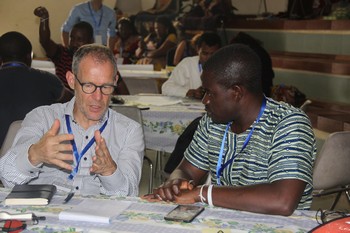
Aug 28, 2017 | Focolare Worldwide
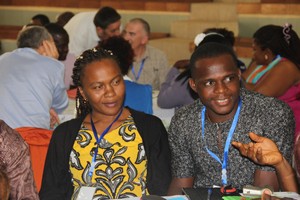 They were from a variety of countries: the Democratic Republic of the Congo, Angola, Uganda, Nigeria, Ivory Coast, Cameroon, Burkina-Faso, Madagascar, Benin and Holland. The fifty five entrepreneurs wanted to put their 30 innovative entrepreneurial projects to the test, with an international force of “mentors” (seven African, five European and one South American). The first African StartUp Lab 2017 was held last June, in the heart of the African forest in Fontem, Cameroon. It consisted of five days of learning how to practice the values of the Economy of Communion that are already being implemented by many entrepreneurs connected with the Economy of Communion around the world. The idea of a week for project development had been conceived two years earlier. In Nairobi, in 2015, during the international assembly of the EoC, several young people had shared with the first generation of EoC entrepreneurs their own dream of realizing several projects. This led to the launch of a two-year incubation period for those projects. In June 2017, during the StartUp Lab held at Mafua Ndem Mariapolis in Fontem, several of those dreams already began to move forward produce.
They were from a variety of countries: the Democratic Republic of the Congo, Angola, Uganda, Nigeria, Ivory Coast, Cameroon, Burkina-Faso, Madagascar, Benin and Holland. The fifty five entrepreneurs wanted to put their 30 innovative entrepreneurial projects to the test, with an international force of “mentors” (seven African, five European and one South American). The first African StartUp Lab 2017 was held last June, in the heart of the African forest in Fontem, Cameroon. It consisted of five days of learning how to practice the values of the Economy of Communion that are already being implemented by many entrepreneurs connected with the Economy of Communion around the world. The idea of a week for project development had been conceived two years earlier. In Nairobi, in 2015, during the international assembly of the EoC, several young people had shared with the first generation of EoC entrepreneurs their own dream of realizing several projects. This led to the launch of a two-year incubation period for those projects. In June 2017, during the StartUp Lab held at Mafua Ndem Mariapolis in Fontem, several of those dreams already began to move forward produce. 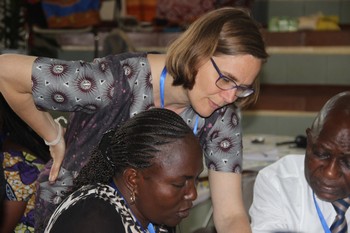 The workshop began with Anouk Grevin, French member of the faculty of the Polytech University of Nantes, and of the Economy and Management course at Sophia University Institute, who presented the fundamental values of the Economy of Communion. Argentinean, Forencia Locascio, expert in social communication, explained the “elevator pitch” that helps to present one’s own entrepreneurial approach to any possible client or investor, in a clear and succinct manner, and in a shor time. French entrepreneur, Pierre Chevalier, presented a workshop on innovative ideas and project analysis, as well as the resources required. The image of an iceberg is perhaps the best way to explain all the effort, work and sacrifice that lies hidden beneath the surface of any successful entrepreneurial project.
The workshop began with Anouk Grevin, French member of the faculty of the Polytech University of Nantes, and of the Economy and Management course at Sophia University Institute, who presented the fundamental values of the Economy of Communion. Argentinean, Forencia Locascio, expert in social communication, explained the “elevator pitch” that helps to present one’s own entrepreneurial approach to any possible client or investor, in a clear and succinct manner, and in a shor time. French entrepreneur, Pierre Chevalier, presented a workshop on innovative ideas and project analysis, as well as the resources required. The image of an iceberg is perhaps the best way to explain all the effort, work and sacrifice that lies hidden beneath the surface of any successful entrepreneurial project.  Topics such as budget, cash flow, sales, production cost and financial reporting were presented by Giampietro Parolin, business strategy instructor at SUI. The practical exercises on product and cost helped in understanding financial components such calculating and sales forecast. Markus Ressl, a consultant from Ressolution and an entrepreneur from the EoC, analyzed different business models with the young people. Markus Ressl, “Ressolution” consultant and EoC entrepreneur, analyzed the theory and practice of different EoC business models with young entrepreneurs. On the last day everyone was back with Locascio for a discussion on communication strategies: company names, logos, slogans and the use of communication tools with different groups of clientele. A symbolic image was presented to each person along with a certificate at the conclusion of the workshop. The symbol showed a network of people gathered around the Mafua Ndem Mariapolis in Cameroon, with a new to do economy. Their arms are raised and linked by a small cord that represents a pact of reciprocity.
Topics such as budget, cash flow, sales, production cost and financial reporting were presented by Giampietro Parolin, business strategy instructor at SUI. The practical exercises on product and cost helped in understanding financial components such calculating and sales forecast. Markus Ressl, a consultant from Ressolution and an entrepreneur from the EoC, analyzed different business models with the young people. Markus Ressl, “Ressolution” consultant and EoC entrepreneur, analyzed the theory and practice of different EoC business models with young entrepreneurs. On the last day everyone was back with Locascio for a discussion on communication strategies: company names, logos, slogans and the use of communication tools with different groups of clientele. A symbolic image was presented to each person along with a certificate at the conclusion of the workshop. The symbol showed a network of people gathered around the Mafua Ndem Mariapolis in Cameroon, with a new to do economy. Their arms are raised and linked by a small cord that represents a pact of reciprocity.
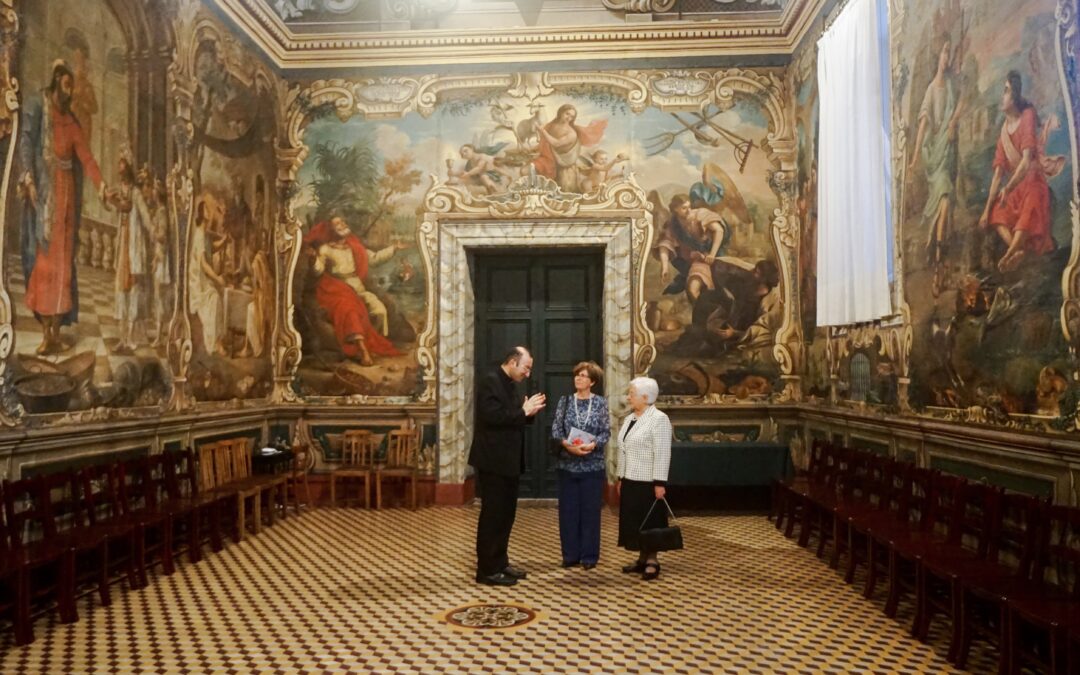
Aug 27, 2017 | Non categorizzato
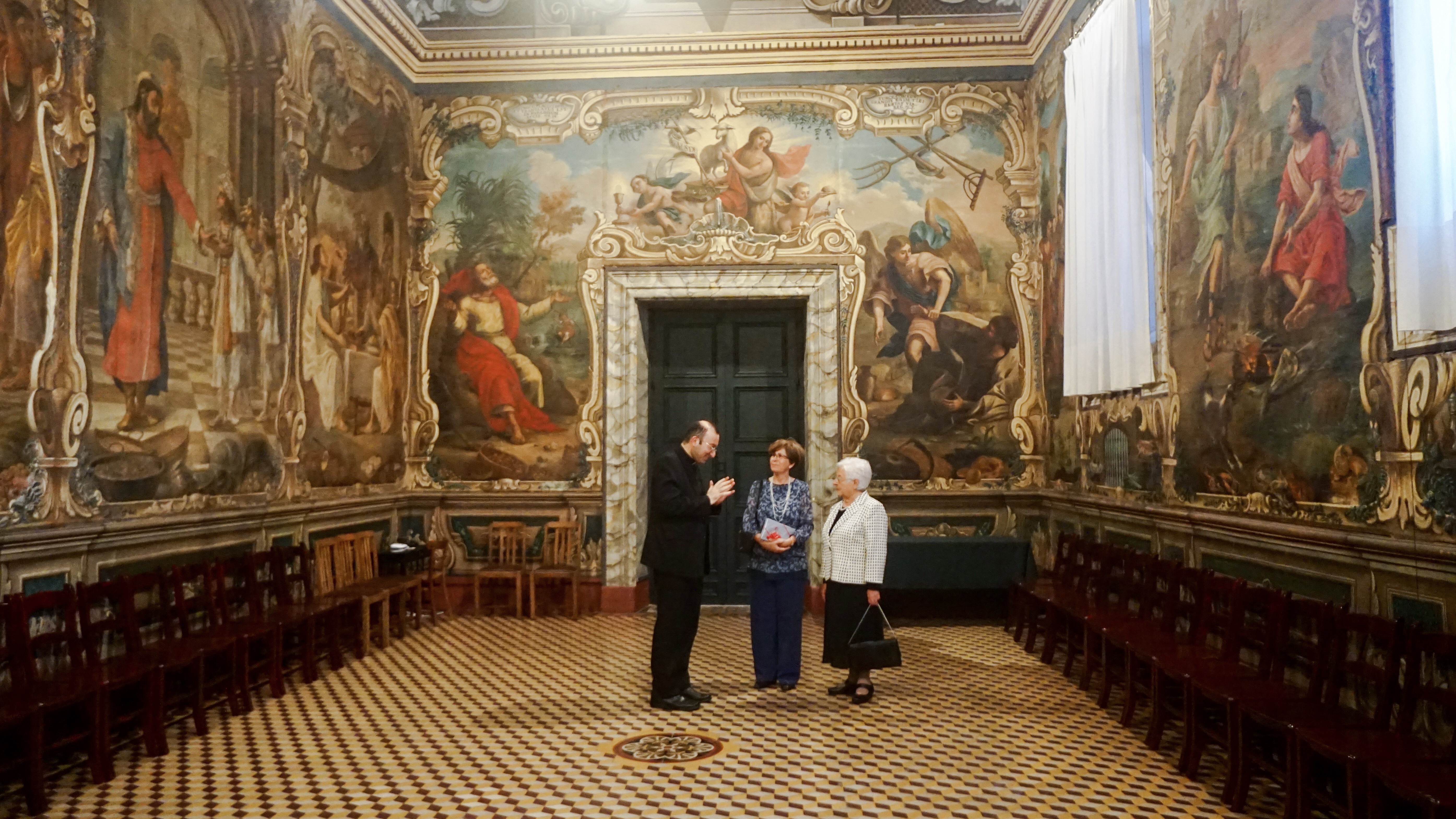 After describing the points of the Art of Loving, with the expressions that Chiara Lubich was fond of using, Maria Voce asked: “But how do you live this art which is not based on feelings or good intentions, but is practiced according to the measure intended by Jesus, which is to lay down one’s life? Is there a key, a secret that would help in making us more and more capable of living up to that measure?” Then she talked about the “culminating moment” of Jesus’s passion when he felt abandoned by the Father (Mt 27:46). Nevertheless, he placed himself in the Father’s hands (Lk 23:46), overcoming “that immense pain and with that he brought humankind into the bosom of the Father and into communion with one another.” “How can we live this mystery of the Forsaken-Risen Jesus? How are we to progress on the ecumenical journey when we clash over questions about truth? The Apostle Paul writes to the Philippians: ‘Have the same sentiments as Christ Jesus who even though he was in the form of God, did not consider equality with God something to be grasped at, but emptied himself and took on the form of a slave, being made in human likeness’ (cf Phil 2:5). With this attitude we are able to convey the truth of Christ in a way that is credible. Christ emptied himself of everything, as a gift of love.” She quoted from Pope Francis at the conclusion of the Week of Prayer for the Unity of Christians, on January 25th: “If we live this death to ourselves for Jesus, out old lifestyle is relegated to the past and, as happened to Paul, we enter into a new manner of life and of communion.” “Chiara Lubich calls this new manner of life: Jesus in our midst. She refers to Jesus’s promise to be in the midst of any who are united in his name, which means in his love (Mt 18:20). This presence of the Risen Lord amongst his own is determining for ecumenism.” From 1996, following an encounter with a thousand Anglicans and Catholics, Chiara began to talk about an “ecumenism of the people”. It was on that spirit that the journey of Together for Europe was begun, communion and collaboration among more than 300 movements and communities from different Churches. “Without authentic reconciliation,” Maria Voce affirmed, “we’ll never progress on the way towards unity. And this reconciliation characterizes the communion among the movements still today.” Finally, the president concludes: “In the light of the events in Lund on October 31, 2016 when Pope Francis and the President of the Lutheran World Federation, Bishop Dr Munib Younan, commemorated the beginning of the 500 years of the Reform, I felt I had to give a new push to the ecumenical involvement that marks our Movement.” The Declaration of Ottmaring was drawn up in the ecumenical community near Augsburg to “help us to think ecumenically, to remember that any brother or sister I meet, be they from my own Church or another Church, belong to the Body of Christ, to that body for which Christ gave his life. This is an absolute commitment we take on as Focolare Movement, and which can make us enter today into every aspect of human life. Ecumenism is a necessity of the times. It has to go forward. Because it corresponds to the need for God that everyone has, even unknowingly. If people are given the opportunity of an encounter with Jesus in the midst of Christians who love one another, their faith will be enkindled in them and their way of acting will change, they will seek justice and peace, and will work for solidarity among peoples. Only if we Christians are united will the world encounter God. See the full Italian text
After describing the points of the Art of Loving, with the expressions that Chiara Lubich was fond of using, Maria Voce asked: “But how do you live this art which is not based on feelings or good intentions, but is practiced according to the measure intended by Jesus, which is to lay down one’s life? Is there a key, a secret that would help in making us more and more capable of living up to that measure?” Then she talked about the “culminating moment” of Jesus’s passion when he felt abandoned by the Father (Mt 27:46). Nevertheless, he placed himself in the Father’s hands (Lk 23:46), overcoming “that immense pain and with that he brought humankind into the bosom of the Father and into communion with one another.” “How can we live this mystery of the Forsaken-Risen Jesus? How are we to progress on the ecumenical journey when we clash over questions about truth? The Apostle Paul writes to the Philippians: ‘Have the same sentiments as Christ Jesus who even though he was in the form of God, did not consider equality with God something to be grasped at, but emptied himself and took on the form of a slave, being made in human likeness’ (cf Phil 2:5). With this attitude we are able to convey the truth of Christ in a way that is credible. Christ emptied himself of everything, as a gift of love.” She quoted from Pope Francis at the conclusion of the Week of Prayer for the Unity of Christians, on January 25th: “If we live this death to ourselves for Jesus, out old lifestyle is relegated to the past and, as happened to Paul, we enter into a new manner of life and of communion.” “Chiara Lubich calls this new manner of life: Jesus in our midst. She refers to Jesus’s promise to be in the midst of any who are united in his name, which means in his love (Mt 18:20). This presence of the Risen Lord amongst his own is determining for ecumenism.” From 1996, following an encounter with a thousand Anglicans and Catholics, Chiara began to talk about an “ecumenism of the people”. It was on that spirit that the journey of Together for Europe was begun, communion and collaboration among more than 300 movements and communities from different Churches. “Without authentic reconciliation,” Maria Voce affirmed, “we’ll never progress on the way towards unity. And this reconciliation characterizes the communion among the movements still today.” Finally, the president concludes: “In the light of the events in Lund on October 31, 2016 when Pope Francis and the President of the Lutheran World Federation, Bishop Dr Munib Younan, commemorated the beginning of the 500 years of the Reform, I felt I had to give a new push to the ecumenical involvement that marks our Movement.” The Declaration of Ottmaring was drawn up in the ecumenical community near Augsburg to “help us to think ecumenically, to remember that any brother or sister I meet, be they from my own Church or another Church, belong to the Body of Christ, to that body for which Christ gave his life. This is an absolute commitment we take on as Focolare Movement, and which can make us enter today into every aspect of human life. Ecumenism is a necessity of the times. It has to go forward. Because it corresponds to the need for God that everyone has, even unknowingly. If people are given the opportunity of an encounter with Jesus in the midst of Christians who love one another, their faith will be enkindled in them and their way of acting will change, they will seek justice and peace, and will work for solidarity among peoples. Only if we Christians are united will the world encounter God. See the full Italian text
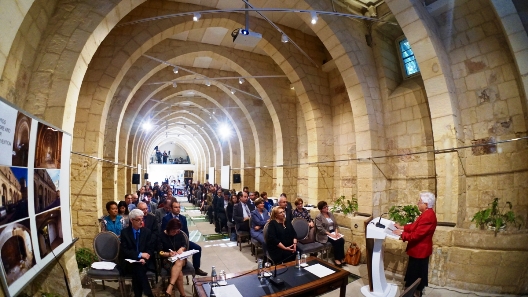
Aug 26, 2017 | Non categorizzato
 “In today’s globalised and interdependent world, dialogue seems to be the only way that humankind can survive. Either we fight one another to the point of mutual destruction, or we dialogue. In fact, only openness to others and dialogue create life and bring life, because every action is then founded on having recognised one another as brothers and sisters, as children of God. I feel the Holy Spirit is at work everywhere, pushing our Churches in this direction: to dialogue so as to re-establish the unity broken over the centuries, so that Christians can give a shared witness to the world according to Jesus’ prayer: “Father, that they may all be one, so that the world may believe” (Cf Jn 17:21-22)” This was Focolare president, Maria Voce’s, strong encouragement in her presentation. She began from her own personal ecumenical testimony up until her encounter with the spirituality of unity; “In the 1960’s, through the experience of Chiara Lubich, who had come into contact with members of the Brotherhood of the Common Life Germany, dialogue was opened to the Movement. The ecumenical community of Ottmaring was established in Germany, where Catholics and Evangelical Lutherans live together.” During the Second Vatican Council, Chiara entered into contact with several Observers from other Churches. This gave rise to the so-called “Ecumenical Weeks” in which Christians from different Churches gathered yearly to share their experiences of living the Word with particular emphasis on Jesus’s New Commandment: “This is my command: Love one another as I have loved you’” (Jn 13:34). At the historic encounter between the Ecumenical Patriarch Athenagoras I and Chiara Lubich, on June 13, 1967, Maria Voce was head of the local Focolare community in Istanbul. “It was the first of 25 meetings that Chiara would have with that charismatic figure. Athenagoras announced that he was “her disciple” and wanted a focolare to be established in Constantinople.” Other important ecumenical meetings would follow. “Christians from the most varied Churches have wished to share the spirituality of unity and many have embraced specific vocations of the Movement. In fact, Maria Voce recalled, “you don’t dialogue with cultures, but with people. Or rather, we live in dialogue.” She continues: “God is the foundation of dialogue, God who is Love and the Father of all of us and makes us is sons and daughters in the Son, all brothers and sisters in one big family. Right from the start, Chiara took Jesus’s prayer that all be one – which we can translate as ‘making humankind into one family – as her motto in life. She invited millions of people from around the world to live it and make it happen.” So, for the Focolare, “dialogue is a lifestyle, a new culture that the Movement can and wants to offer to all the people of today.” And it has to be “sustained and substantiated by mercy, compassion and love.” Maria Voce cited Chiara Lubich who writes in 1970: “If we don’t have love and charity, we’ll never have the light of God and dialogue. Generic dialogue can become sterile, unfruitful…”[i]. Chiara Lubich continues: “The [person] near me has been created as a gift given to me. On this earth everything is in loving relationship with everything…every thing with every thing. But you need to be Love in order to discover the golden thread among beings” [ii]. Then the Focolare president described the so-called Art of Loving, which is summarized in a few points: love everyone; love always; be the first to love; and make yourself one with your neighbor (see 1 Cor 9:22). (Part 1) [i] C. LUBICH, Discorso ai focolarini,1970. Testo non pubblicato cit. in Vera Araújo, Il quinto dialogo del Movimento dei Focolari. Cosa è, cosa vuole, cosa fa, 7 [ii] C. LUBICH, Scritti Spirituali 1, “L’attrattiva del tempo moderno”, Città Nuova, Rome 1978, 140.
“In today’s globalised and interdependent world, dialogue seems to be the only way that humankind can survive. Either we fight one another to the point of mutual destruction, or we dialogue. In fact, only openness to others and dialogue create life and bring life, because every action is then founded on having recognised one another as brothers and sisters, as children of God. I feel the Holy Spirit is at work everywhere, pushing our Churches in this direction: to dialogue so as to re-establish the unity broken over the centuries, so that Christians can give a shared witness to the world according to Jesus’ prayer: “Father, that they may all be one, so that the world may believe” (Cf Jn 17:21-22)” This was Focolare president, Maria Voce’s, strong encouragement in her presentation. She began from her own personal ecumenical testimony up until her encounter with the spirituality of unity; “In the 1960’s, through the experience of Chiara Lubich, who had come into contact with members of the Brotherhood of the Common Life Germany, dialogue was opened to the Movement. The ecumenical community of Ottmaring was established in Germany, where Catholics and Evangelical Lutherans live together.” During the Second Vatican Council, Chiara entered into contact with several Observers from other Churches. This gave rise to the so-called “Ecumenical Weeks” in which Christians from different Churches gathered yearly to share their experiences of living the Word with particular emphasis on Jesus’s New Commandment: “This is my command: Love one another as I have loved you’” (Jn 13:34). At the historic encounter between the Ecumenical Patriarch Athenagoras I and Chiara Lubich, on June 13, 1967, Maria Voce was head of the local Focolare community in Istanbul. “It was the first of 25 meetings that Chiara would have with that charismatic figure. Athenagoras announced that he was “her disciple” and wanted a focolare to be established in Constantinople.” Other important ecumenical meetings would follow. “Christians from the most varied Churches have wished to share the spirituality of unity and many have embraced specific vocations of the Movement. In fact, Maria Voce recalled, “you don’t dialogue with cultures, but with people. Or rather, we live in dialogue.” She continues: “God is the foundation of dialogue, God who is Love and the Father of all of us and makes us is sons and daughters in the Son, all brothers and sisters in one big family. Right from the start, Chiara took Jesus’s prayer that all be one – which we can translate as ‘making humankind into one family – as her motto in life. She invited millions of people from around the world to live it and make it happen.” So, for the Focolare, “dialogue is a lifestyle, a new culture that the Movement can and wants to offer to all the people of today.” And it has to be “sustained and substantiated by mercy, compassion and love.” Maria Voce cited Chiara Lubich who writes in 1970: “If we don’t have love and charity, we’ll never have the light of God and dialogue. Generic dialogue can become sterile, unfruitful…”[i]. Chiara Lubich continues: “The [person] near me has been created as a gift given to me. On this earth everything is in loving relationship with everything…every thing with every thing. But you need to be Love in order to discover the golden thread among beings” [ii]. Then the Focolare president described the so-called Art of Loving, which is summarized in a few points: love everyone; love always; be the first to love; and make yourself one with your neighbor (see 1 Cor 9:22). (Part 1) [i] C. LUBICH, Discorso ai focolarini,1970. Testo non pubblicato cit. in Vera Araújo, Il quinto dialogo del Movimento dei Focolari. Cosa è, cosa vuole, cosa fa, 7 [ii] C. LUBICH, Scritti Spirituali 1, “L’attrattiva del tempo moderno”, Città Nuova, Rome 1978, 140.
Aug 25, 2017 | Non categorizzato
The annual meeting of the Zone Directors of the Movement from all over the world, as well as the people responsible for 4 of the Focolare “little cities”.
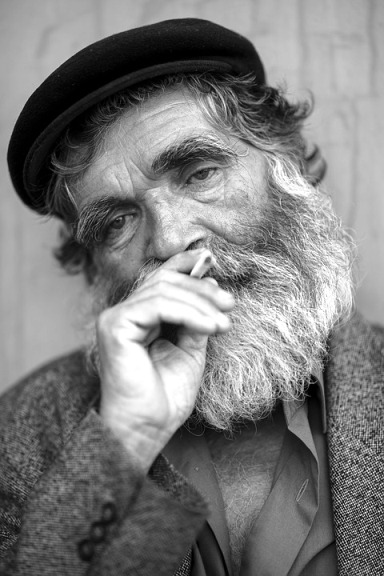
Aug 25, 2017 | Non categorizzato
The waiting room at the clinic was packed, and a number of doctors were taking in patients. There were only two free seats, one next to a stylishly dressed lady and the other near a man who smelled really bad – his clothes let on that his hygiene was questionable. Perhaps he was there taking shelter from the intense cold out on the street. My first instinct was to sit next to the lady, since that smell was making me nauseous. All the same, I couldn’t help but think that if Jesus is present in every neighbor, surely he was also in that poor man. There was no excuse: my place was next to him, and he was the person to favor, precisely because he was unkempt, because he was someone “rejected.” So I sat there, overcoming the natural disgust I felt, with people watching in surprise. The man immediately began to talk to me. “What a nice sweater, what nice pants! How nice it would be to have clothes like that!” I must admit, when he started to touch my pants to admire their quality and spoke even more enthusiastically about my clothes, I started to feel uncomfortable. People were watching and expected me to react. At that point I gave him all my attention, treating him with dignity, without judging him, and seeing him as a brother. It wasn’t important whether or not what he was telling me about his life was plausible… I gathered that he needed someone who would listen, value and make him feel important.  I tried not to mind that, as we talked, he was spraying saliva all over my clothes. I felt that this effort took me out of my comfortable life, and by doing so I’d be able to be compassionate toward that person. I proposed we meet the next day for a coffee. My new friend was surprised and happy. The many people around us obviously heard all of this. In the end, I heard my name called and went in for my medical visit. When I came out, “my” poor person was no longer there. By now the waiting room was almost empty, and only the stylish lady was left. She came up to me smiling. “I hope I’m not disturbing,” she said, “but I followed your entire conversation with that man. It seemed to me that your patience was unlimited. I would have liked to do the same, but I was not brave enough. I heard every word, and you really seemed interested in that unusual conversation. “When you went into the doctor, he got up and thanked all of us for our patience and told us: ‘He is a true friend. I had never seen him before, but he truly cared. For him, I am truly important!’ “Then he left. Tell me, why did you act that way with him?” I told her that I am a Christian, and that I would like to love and serve every neighbor, especially those who suffer most, like a father would to his son. The lady seemed surprised. She reflected a while and then told me, smiling, “If that is what living as a Christian means, perhaps I can too find myself once again in that faith I lost so long ago.” The day after, I went to have coffee with my new friend. I brought him some clean clothes. When we said goodbye, he hugged me. Through the tears he said, “It has been some time since someone treated me like a human being who needs love and affection.” Excerpted from Urs Kerber, La vida se hace camino (“Life goes ahead”), Buenos Aires: Ciudad Nueva, 2016, pp. 15–16.
I tried not to mind that, as we talked, he was spraying saliva all over my clothes. I felt that this effort took me out of my comfortable life, and by doing so I’d be able to be compassionate toward that person. I proposed we meet the next day for a coffee. My new friend was surprised and happy. The many people around us obviously heard all of this. In the end, I heard my name called and went in for my medical visit. When I came out, “my” poor person was no longer there. By now the waiting room was almost empty, and only the stylish lady was left. She came up to me smiling. “I hope I’m not disturbing,” she said, “but I followed your entire conversation with that man. It seemed to me that your patience was unlimited. I would have liked to do the same, but I was not brave enough. I heard every word, and you really seemed interested in that unusual conversation. “When you went into the doctor, he got up and thanked all of us for our patience and told us: ‘He is a true friend. I had never seen him before, but he truly cared. For him, I am truly important!’ “Then he left. Tell me, why did you act that way with him?” I told her that I am a Christian, and that I would like to love and serve every neighbor, especially those who suffer most, like a father would to his son. The lady seemed surprised. She reflected a while and then told me, smiling, “If that is what living as a Christian means, perhaps I can too find myself once again in that faith I lost so long ago.” The day after, I went to have coffee with my new friend. I brought him some clean clothes. When we said goodbye, he hugged me. Through the tears he said, “It has been some time since someone treated me like a human being who needs love and affection.” Excerpted from Urs Kerber, La vida se hace camino (“Life goes ahead”), Buenos Aires: Ciudad Nueva, 2016, pp. 15–16.
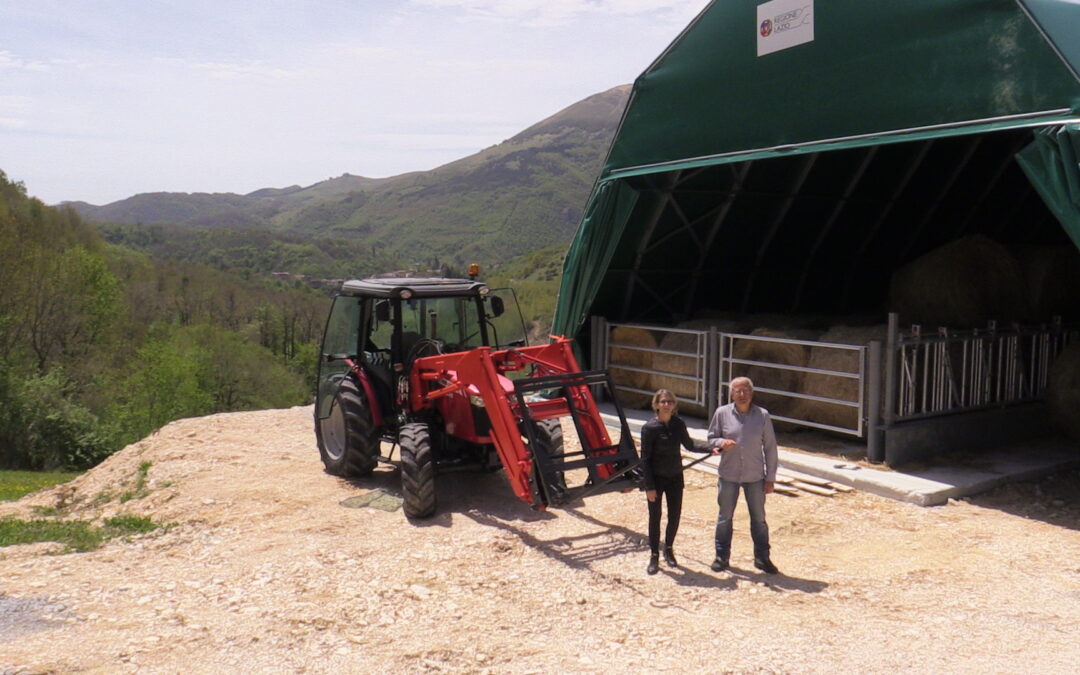
Aug 24, 2017 | Focolare Worldwide
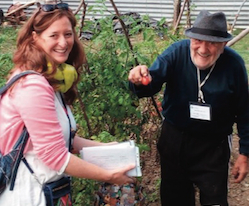 Many people have continued to work after the earthquake in central Italy last year, standing by those who were affected by those who were so awfully affected by that tragedy. It was such a vast catastrophe that it tested not only the physical infrastructure, but also the very social fabric and personal resistance of an entire generation of families. The Focolare Movement has a stable organism that works in collaboration with two associations: United World Project and New Families Association, but also other groups (AIPEC, B&F Foundation, Planetary Embrace, Dialogue in Architecture and local Focolare communities in Italy). They provide expertise in channelling the aid more effectively. “Our first objective was to come up with a way of linking and knowing the different projects so that we could keep awareness high and not forget…” says Cesare Borin from the Focolare’s Emergency Aid project. The financial aid that began to arrive immediately is only one part of many other forms of aid that have solidified the assistance, which involves many people from the Movement in being close to the people who have lost everything in this dramatic event.” The project is comprised of two complimentary efforts:
Many people have continued to work after the earthquake in central Italy last year, standing by those who were affected by those who were so awfully affected by that tragedy. It was such a vast catastrophe that it tested not only the physical infrastructure, but also the very social fabric and personal resistance of an entire generation of families. The Focolare Movement has a stable organism that works in collaboration with two associations: United World Project and New Families Association, but also other groups (AIPEC, B&F Foundation, Planetary Embrace, Dialogue in Architecture and local Focolare communities in Italy). They provide expertise in channelling the aid more effectively. “Our first objective was to come up with a way of linking and knowing the different projects so that we could keep awareness high and not forget…” says Cesare Borin from the Focolare’s Emergency Aid project. The financial aid that began to arrive immediately is only one part of many other forms of aid that have solidified the assistance, which involves many people from the Movement in being close to the people who have lost everything in this dramatic event.” The project is comprised of two complimentary efforts: 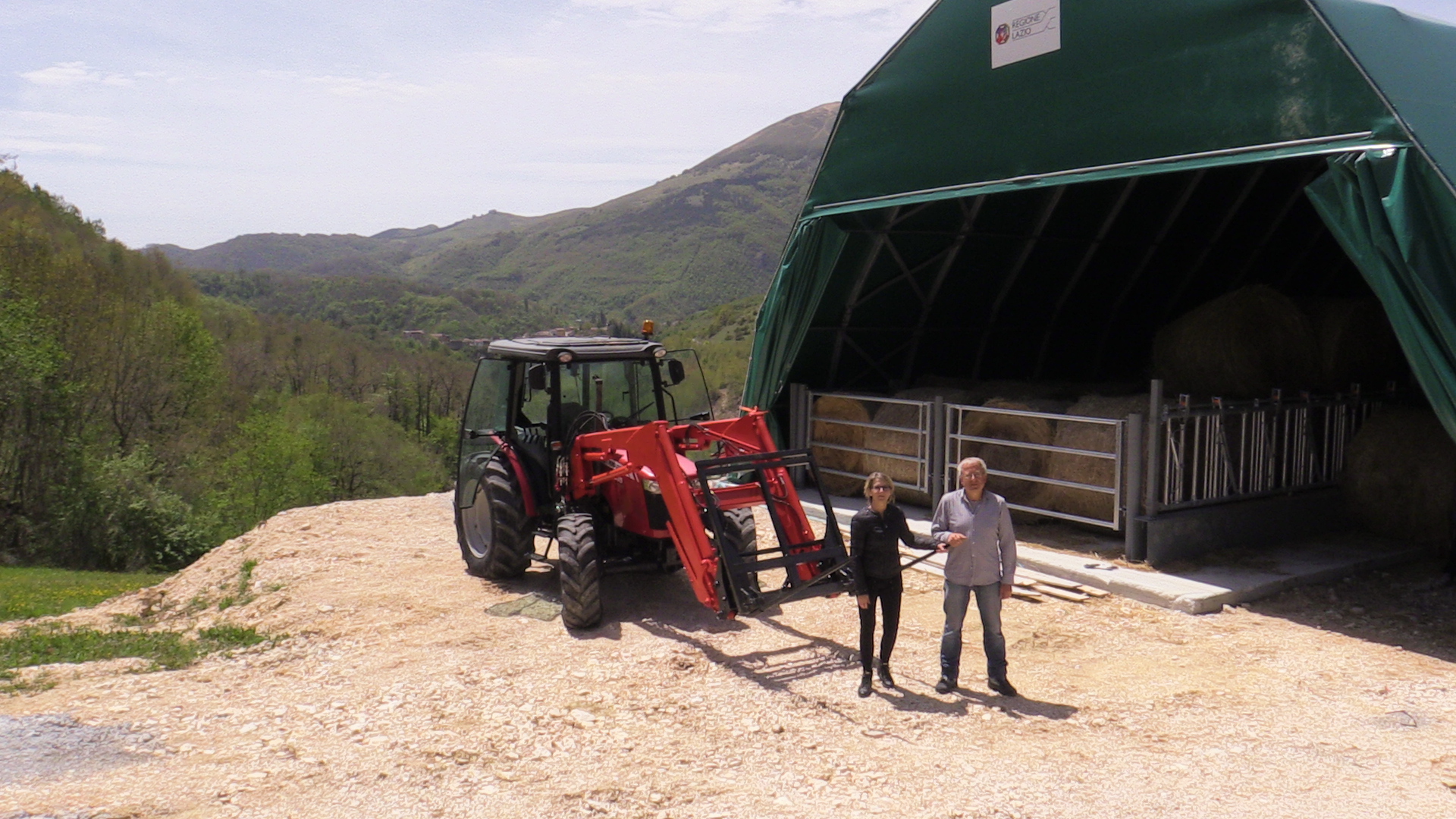 “RImPRESA Businesses” which consists in providing raw materials, machinery and small infrastructure to businesses and, where possible, to strengthen virtuous and ethical business processes and practices that allow for pairing with other businesses on a national level. This effort has focused on 60 small businesses in the four regions that were hit, and they are recently finishing the furnishing of 25 agricultural and handicraft businesses with equipment. The second activity: “RImPRESA GAS” promotes the purchase of products from businesses affected by the earthquake, through the creation of the Gruppi di Acquisto Solidale (GAS) that supports local tourism. Currently, there are 13 agribusinesses with a total of 90 enrolments with a total of 17,000 euros in orders. The response to the people in need was quick, like that for several families from Amatrice that had asked for a sheet metal container. In March they received 10 containers for themselves and many other families of Amatrice and the surrounding areas, at a total cost of 19,000 euros. A summer camp is being set up for the end of August in collaboration with the Italian Caritas, which will be based at Torrita di Amatrice. Activities will continue during the months of July and August with plans for a summer children’s community centre, recreational activities for teenagers from the area, and for the elderly in rehabilitation centres in Borbona. Borin concludes: “The people from these beautiful regions never ask us to rebuild their homes, but they do strongly ask that we don’t leave them all alone! Amongst the lessons learned has been the importance of never marginalising or suffocating the contribution from civil society. Alongside the competent intervention of these state agencies, we need a more vast and programmatic inclusion of social agencies and groups precisely because of their ability to make the work of institutions more efficacious also in restarting the process of production.” Contacts: emergenzaterremoto.italia@focolare.org
“RImPRESA Businesses” which consists in providing raw materials, machinery and small infrastructure to businesses and, where possible, to strengthen virtuous and ethical business processes and practices that allow for pairing with other businesses on a national level. This effort has focused on 60 small businesses in the four regions that were hit, and they are recently finishing the furnishing of 25 agricultural and handicraft businesses with equipment. The second activity: “RImPRESA GAS” promotes the purchase of products from businesses affected by the earthquake, through the creation of the Gruppi di Acquisto Solidale (GAS) that supports local tourism. Currently, there are 13 agribusinesses with a total of 90 enrolments with a total of 17,000 euros in orders. The response to the people in need was quick, like that for several families from Amatrice that had asked for a sheet metal container. In March they received 10 containers for themselves and many other families of Amatrice and the surrounding areas, at a total cost of 19,000 euros. A summer camp is being set up for the end of August in collaboration with the Italian Caritas, which will be based at Torrita di Amatrice. Activities will continue during the months of July and August with plans for a summer children’s community centre, recreational activities for teenagers from the area, and for the elderly in rehabilitation centres in Borbona. Borin concludes: “The people from these beautiful regions never ask us to rebuild their homes, but they do strongly ask that we don’t leave them all alone! Amongst the lessons learned has been the importance of never marginalising or suffocating the contribution from civil society. Alongside the competent intervention of these state agencies, we need a more vast and programmatic inclusion of social agencies and groups precisely because of their ability to make the work of institutions more efficacious also in restarting the process of production.” Contacts: emergenzaterremoto.italia@focolare.org
Aug 23, 2017 | Non categorizzato
Entitled “Neither victims nor brigands. Changing the rules of the game”, the much awaited LoppianoLab event will be held in Loppiano from 30 September to 1 October 2017. The expo, which focuses on the economy, culture, communication, training and innovation, is promoted annually by Città Nuova, Lionello Bonfanti Industrial Park, Sophia University Institute and the international town of Loppiano. Immigration, work, poverty, social integration, fighting corruption, commitment to the common good, family, youth, education and other topics will be discussed during the 8th edition of LoppianoLab.
Aug 23, 2017 | Non categorizzato
Established by the United Nations in 2005, with the intention of raising awareness of those who are disadvantaged, International Solidarity Day, which is celebrated on 31 August each year, reminds the international community that humanity’s innate attitude is not about hate, discrimination or indifference towards those unable to live with dignity and in freedom, but that of unconditional collaboration and support.
Aug 23, 2017 | Non categorizzato
During the week 26 August – 2 September, in Amatrice and Borbona, the two central Italian regions badly hit by the earthquake, various initiatives will be held for children, teenages and senior citizens. These are being organised by the young people of the Focolare Movement as part of an aid program promoted by Caritas which aims to give support to the local community. 25 young organisers are expected to arrive from around Italy.
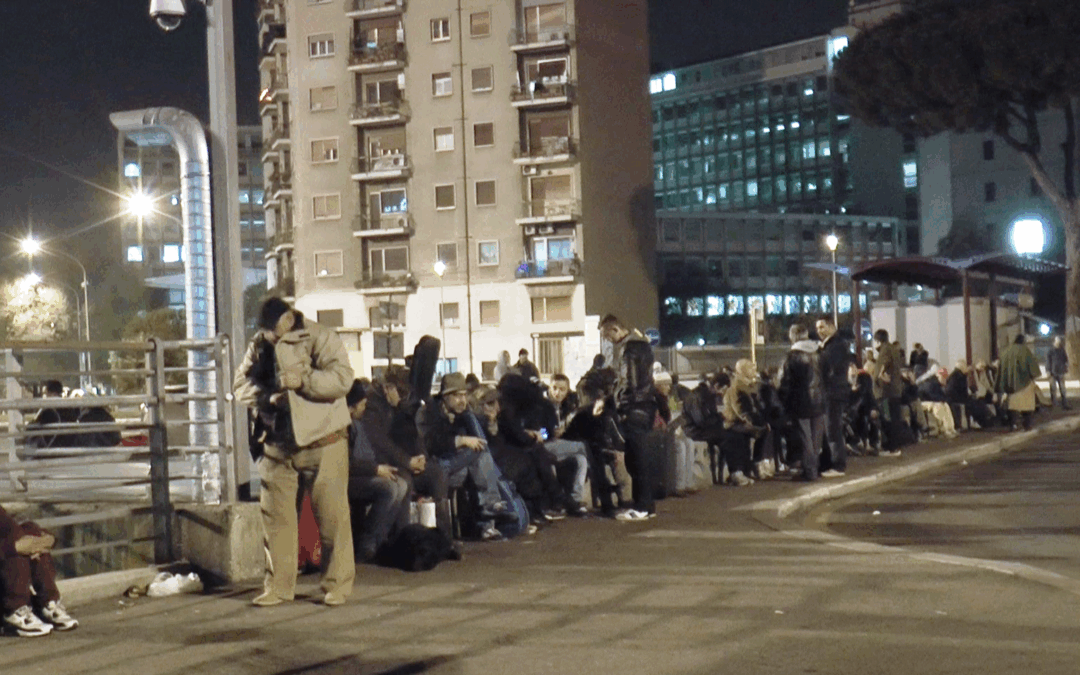
Aug 23, 2017 | Focolare Worldwide
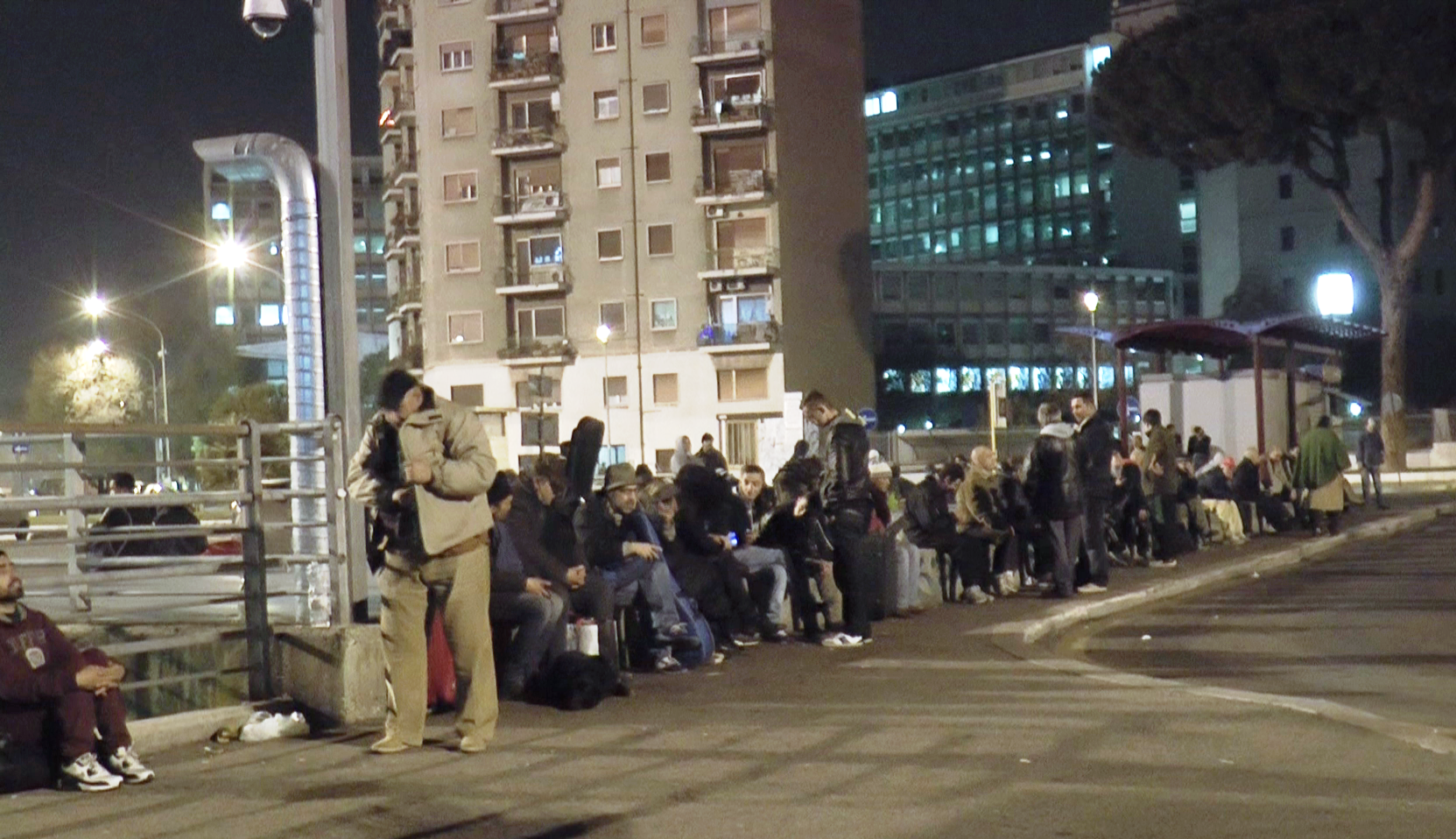 “Re”-turn, “Re”-cognize, “Re”-view, “Re”-embrace, “Re”-member. Going back to Ostiense, I have butterflies in my stomach. I look for my friends in desperation. These past months I left Rome behind with its great beauty (the kind around the train stations, that is). To console me, some have used reassuring expressions like “never mind, you’ll find the poor, the least among us, the homeless, wherever you go.”But I don’t love the poor or the least. I love Samir, Fulvio, Gian Paolo, Gabriele, Jazmin… Ladies and gentlemen, this is called friendship. Claudio treats me with the tenderness of a whisper, although he has a past that is more rough, harsh and violent than anyone. When I was an ocean away, I realized that friendship had changed him, but above all it had changed me. I talk, I listen, I sit down, and I feel truly at home. This sense of “re”-entry and “re”-turn is a bit of a taste of what they call heaven… “re”-acquired after it had been lost. I “re”-listen to their stories and absurdities. Inside myself these past months, I found some pressing questions about the sense of life paths, the paradox of decisions, disrupted plans, and trepidation about my own mission. I tend to get lost in these pretentions, but I see that my friends do not have a path, mission, choices nor even know how to tell their stories. I had become lost in all these middle-class demands, but here and now, I stop getting lost. These are my friends, and it wouldn’t be right to have something for myself that they cannot have. Ladies and gentlemen, this is friendship. As I come out of myself, out of my will, my demands, I continually ask – for them, for me – for the thread… the thread that connects everything under heaven, our stories and all the stories, in a single plan. I ask for it humbly. I “re”-embrace myself, greet myself with wet eyes and say, “Hi Paula, welcome back!”
“Re”-turn, “Re”-cognize, “Re”-view, “Re”-embrace, “Re”-member. Going back to Ostiense, I have butterflies in my stomach. I look for my friends in desperation. These past months I left Rome behind with its great beauty (the kind around the train stations, that is). To console me, some have used reassuring expressions like “never mind, you’ll find the poor, the least among us, the homeless, wherever you go.”But I don’t love the poor or the least. I love Samir, Fulvio, Gian Paolo, Gabriele, Jazmin… Ladies and gentlemen, this is called friendship. Claudio treats me with the tenderness of a whisper, although he has a past that is more rough, harsh and violent than anyone. When I was an ocean away, I realized that friendship had changed him, but above all it had changed me. I talk, I listen, I sit down, and I feel truly at home. This sense of “re”-entry and “re”-turn is a bit of a taste of what they call heaven… “re”-acquired after it had been lost. I “re”-listen to their stories and absurdities. Inside myself these past months, I found some pressing questions about the sense of life paths, the paradox of decisions, disrupted plans, and trepidation about my own mission. I tend to get lost in these pretentions, but I see that my friends do not have a path, mission, choices nor even know how to tell their stories. I had become lost in all these middle-class demands, but here and now, I stop getting lost. These are my friends, and it wouldn’t be right to have something for myself that they cannot have. Ladies and gentlemen, this is friendship. As I come out of myself, out of my will, my demands, I continually ask – for them, for me – for the thread… the thread that connects everything under heaven, our stories and all the stories, in a single plan. I ask for it humbly. I “re”-embrace myself, greet myself with wet eyes and say, “Hi Paula, welcome back!”
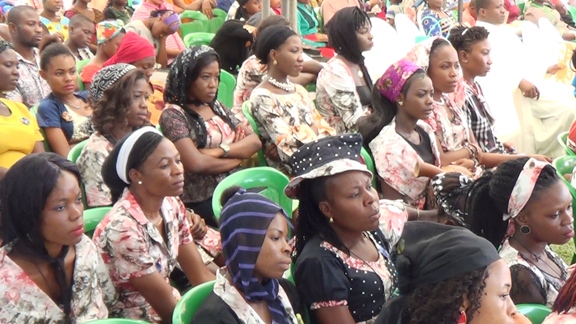
Aug 22, 2017 | Focolare Worldwide
“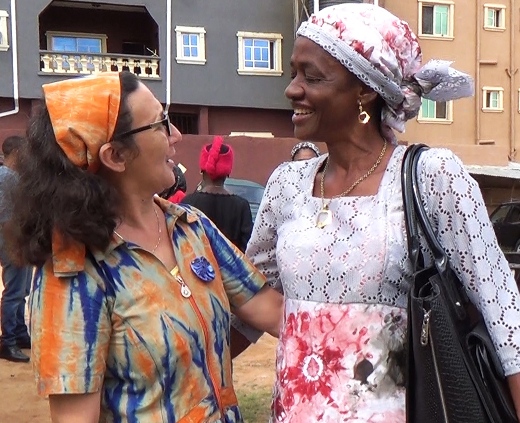 I had only been married a short while when my husband fell gravely ill. At the same time I discovered I was pregnant.” This is how one Nigerian woman’s story begins. Far from her own family and alone, she asked her husband’s family for help, but only found closed doors. “We lived through hell,” she said. Fortunately other doors opened soon after: those of Casa Alba. And for her, like many other young women in difficulty, a new day began. “I don’t know how I would have survived otherwise. Now, thanks to God, things have gotten better.” Casa Alba is one of the Focolare Movement’s projects in Nigeria. For many years, it was once just called a “gen house” (for “new generation”, the young people of the Focolare). Only later did Chiara Lubich propose naming it “Alba” (“dawn”), with the hope that it might become a true house for many vulnerable girls from all over Nigeria. Here many – some were living on the street – have been welcomed and learned a trade. Both sewing work (which became a course in itself) and batik (the art of dying fabric), which at first were just a way to earn some money, have become a true recovery project. Spiritual and ethical training are also integral parts of the program. In May Casa Alba celebrated its 25th anniversary at the Mariapolis Center of Onitsha – an entire weekend with a concluding mass outdoors. Four hundred people were invited, many of whom donned typical brightly colored African coloring, decorated with batik techniques. Auxiliary Bishop Denis Chidi Isizoh, celebrated the mass. “Focolare means fire,” he said during the homily. “It is the fire of encouragement, of evangelization, of love.” He described the times he had met Chiara Lubich personally, when he worked with Cardinal Arinze at the Pontifical Council for Interreligious Dialogue. “A French scholar once wrote, ‘I think therefore I am.’ No African would ever say this. Africans would say ‘We are, therefore I am.’ I am a person because I belong to a community, to a group. This is what the members of the Focolare Movement tell us: when we are united like a community, that is when we find ourselves.”
I had only been married a short while when my husband fell gravely ill. At the same time I discovered I was pregnant.” This is how one Nigerian woman’s story begins. Far from her own family and alone, she asked her husband’s family for help, but only found closed doors. “We lived through hell,” she said. Fortunately other doors opened soon after: those of Casa Alba. And for her, like many other young women in difficulty, a new day began. “I don’t know how I would have survived otherwise. Now, thanks to God, things have gotten better.” Casa Alba is one of the Focolare Movement’s projects in Nigeria. For many years, it was once just called a “gen house” (for “new generation”, the young people of the Focolare). Only later did Chiara Lubich propose naming it “Alba” (“dawn”), with the hope that it might become a true house for many vulnerable girls from all over Nigeria. Here many – some were living on the street – have been welcomed and learned a trade. Both sewing work (which became a course in itself) and batik (the art of dying fabric), which at first were just a way to earn some money, have become a true recovery project. Spiritual and ethical training are also integral parts of the program. In May Casa Alba celebrated its 25th anniversary at the Mariapolis Center of Onitsha – an entire weekend with a concluding mass outdoors. Four hundred people were invited, many of whom donned typical brightly colored African coloring, decorated with batik techniques. Auxiliary Bishop Denis Chidi Isizoh, celebrated the mass. “Focolare means fire,” he said during the homily. “It is the fire of encouragement, of evangelization, of love.” He described the times he had met Chiara Lubich personally, when he worked with Cardinal Arinze at the Pontifical Council for Interreligious Dialogue. “A French scholar once wrote, ‘I think therefore I am.’ No African would ever say this. Africans would say ‘We are, therefore I am.’ I am a person because I belong to a community, to a group. This is what the members of the Focolare Movement tell us: when we are united like a community, that is when we find ourselves.”  Let’s go back for a moment. Some time ago Elde de Souza, who directs Casa Alba, visited Bishop Denis to inform him of funding difficulties that the project was having and that activities would have to be suspended. In response, the bishop renewed his faith in the program and relaunched it. Instead of its closing, he proposed celebrating Casa Alba’s 25th anniversary in grand style. “The Focolare in Nigeria is too quiet!” he said. His proposal was too good to ignore, and the entire community mobilized. Everyone, old and young, got to work. Bishop Denis’s enthusiasm is contagious. “Nigeria is a happy place. We are happy people. Yet some are not, and are in really difficult situations. This is what life is about,” he says, concluding that we are all able to unite our sufferings to those of Jesus on the cross. At the celebration, all the Casa Alba “girls” are present. Some are teens; others are already grandmothers. The celebration is a chance to retrace paths and stories. “It changed me and my life.” “Before I had a short temper, but here I calmed down.” “It is wonderful to hear how this small seed produced so much fruit,” says Mama Regina, 83, one of the early teachers. The next day, the newspaper of the archdiocese (which has 2 million Catholics), called the anniversary “a colorful spectacular.” “The Focolare Movement has dried the tears of hopeless young people, who today live above the poverty line thanks to the skills acquired at Casa Alba.” The event was covered on radio and television, and the regional newspaper printed a call to raise funds to relaunch the project. A new day is beginning for Casa Alba as well.
Let’s go back for a moment. Some time ago Elde de Souza, who directs Casa Alba, visited Bishop Denis to inform him of funding difficulties that the project was having and that activities would have to be suspended. In response, the bishop renewed his faith in the program and relaunched it. Instead of its closing, he proposed celebrating Casa Alba’s 25th anniversary in grand style. “The Focolare in Nigeria is too quiet!” he said. His proposal was too good to ignore, and the entire community mobilized. Everyone, old and young, got to work. Bishop Denis’s enthusiasm is contagious. “Nigeria is a happy place. We are happy people. Yet some are not, and are in really difficult situations. This is what life is about,” he says, concluding that we are all able to unite our sufferings to those of Jesus on the cross. At the celebration, all the Casa Alba “girls” are present. Some are teens; others are already grandmothers. The celebration is a chance to retrace paths and stories. “It changed me and my life.” “Before I had a short temper, but here I calmed down.” “It is wonderful to hear how this small seed produced so much fruit,” says Mama Regina, 83, one of the early teachers. The next day, the newspaper of the archdiocese (which has 2 million Catholics), called the anniversary “a colorful spectacular.” “The Focolare Movement has dried the tears of hopeless young people, who today live above the poverty line thanks to the skills acquired at Casa Alba.” The event was covered on radio and television, and the regional newspaper printed a call to raise funds to relaunch the project. A new day is beginning for Casa Alba as well.
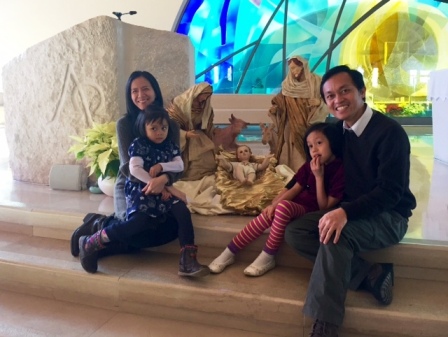
Aug 21, 2017 | Focolare Worldwide, Senza categoria
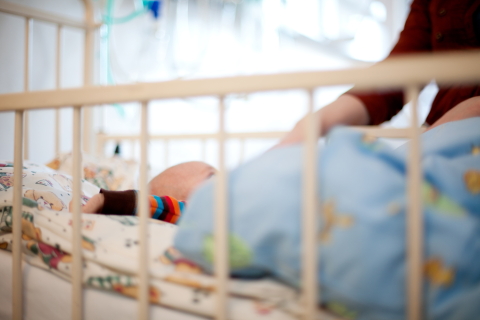 Eugene: My name is Eugene, and this is my wife Ann. We have been married for almost nine years, and have two children; Erin is seven and Anica is almost five. We come from the Philippines and we are here in Italy for a year, to make an experience in the school of families in Loppiano. I am an engineer by profession, and before coming here, I was working in the supply chain department in a power generation company. Ann: I have a degree in Information Technology. When we got married, I was then working in the IT industry. I had what I could say was a successful and flourishing career, and I was going up the corporate ladder. But it was a job that demanded much from me; at a certain point, I felt that to love Eugene and to make our desire of starting a family a reality, I had to put my family above my career. We talked about it together. Around that time, the global financial meltdown was being felt. We had doubts about being able to raise a family with only one income. It was a big risk. But we felt strongly that it was what God was asking from us, and we said our yes, trusting that God would always take care of us. I left my 10-year IT career and became a housewife, and Eugene became the sole provider for our family. Soon after, we found out that we were going to have our first baby and we were very excited. Erin was born. It was a joyful an exciting moment for us. But our joy was short-lived. Two weeks later, on December 6, we had difficulty feeding her. We brought her to the hospital, and the doctor told us that she had sepsis and meningitis, which was potentially fatal. December 7 was a special day for us. We started the day renewing our ‘yes’ to God’s will, believing that everything was part of His great love for our family. Very early that morning, the doctor called to inform us that the infection was apparently at an advanced stage and that Erin was in a very critical condition. That afternoon, we had Erin’s emergency baptism at the neonatal ICU.
Eugene: My name is Eugene, and this is my wife Ann. We have been married for almost nine years, and have two children; Erin is seven and Anica is almost five. We come from the Philippines and we are here in Italy for a year, to make an experience in the school of families in Loppiano. I am an engineer by profession, and before coming here, I was working in the supply chain department in a power generation company. Ann: I have a degree in Information Technology. When we got married, I was then working in the IT industry. I had what I could say was a successful and flourishing career, and I was going up the corporate ladder. But it was a job that demanded much from me; at a certain point, I felt that to love Eugene and to make our desire of starting a family a reality, I had to put my family above my career. We talked about it together. Around that time, the global financial meltdown was being felt. We had doubts about being able to raise a family with only one income. It was a big risk. But we felt strongly that it was what God was asking from us, and we said our yes, trusting that God would always take care of us. I left my 10-year IT career and became a housewife, and Eugene became the sole provider for our family. Soon after, we found out that we were going to have our first baby and we were very excited. Erin was born. It was a joyful an exciting moment for us. But our joy was short-lived. Two weeks later, on December 6, we had difficulty feeding her. We brought her to the hospital, and the doctor told us that she had sepsis and meningitis, which was potentially fatal. December 7 was a special day for us. We started the day renewing our ‘yes’ to God’s will, believing that everything was part of His great love for our family. Very early that morning, the doctor called to inform us that the infection was apparently at an advanced stage and that Erin was in a very critical condition. That afternoon, we had Erin’s emergency baptism at the neonatal ICU.  Eugene: The next day, Erin’s pulse started to drop. She was pale and weak, and her eyes were not responding to movement and light. At once, the doctor advised us to transfer her to a better-equipped hospital, which, naturally, was also more expensive. At first, I was worried because we could not afford the rates of that hospital. But Ann helped me make a leap of faith, and we agreed to do everything for Erin and worry about the expenses later. That morning, I couldn’t accept what was happening to our family. I asked God, “WHY?” but later, entrusting everything to Him, I gave Him my ‘yes.’ In the ambulance on the way to the new hospital, I was asked to stimulate Erin by touching her and singing her favorite lullaby because her pulse was dropping. It was hard to understand why our young family had to go through all this. But we continued to believe that there was a reason for everything, even if we could not understand it at that moment. Once again, Ann and I said our ‘yes’ to His will. Arriving at the emergency room, we watched as Erin was pierced with needles, connected to tubes and surrounded by machines. We watched her go into a seizure. We could not help but cry, seeing everything that was being done to her and realizing the gravity of her illness. I was at a loss and couldn’t understand why our baby had to go through all those painful medical procedures. That day was December 8, the feast of Mary’s Immaculate Conception. We went to the hospital chapel and entrusted Erin to our Lady. Ann: The doctors told us right away that Erin’s condition was very critical, that the infection seemed to have already reached her brain and that she had meningitis. They also told us that upfront that in cases as grave as this, they had only seen two outcomes in the past—either the patient did not live, or the patient survived but with a handicap. They assured us that they would do everything they could, but that we could only hope and pray. Various tests were run on her the entire day. Again, Erin had to undergo the ordeal of being pierced many times with needles while tubes and machines were connected to her arms and feet. Transfusions were ordered for platelets, fresh frozen plasma and red blood cells. She resembled a small Jesus being crucified, suffering and helpless. It was hard to see her go through this, but we also felt how special she was to Jesus, who had chosen her, at such a tender age, to be an innocent victim like Him on the cross. There was really nothing we could do but be there for her, staying “at the foot of her cross” as Mary had done when Jesus was on the cross. Eugene: While Erin was going through physical pain, Ann and I underwent a great deal of emotional pain. Many times, Ann and I would look at each other, assuring one another of our love and unity in this suffering. Though we couldn’t understand why we had to go through this, we continued to believe that it was part of God’s great design for our baby and our family. Absurd as it was, we still believed that this suffering was the immense love of God for us. That night, Ann and I asked ourselves if we were ready for anything: for the possibility of raising a handicapped child, even for the possibility that she would not make it at all, and we would lose her. I asked God, “Are You asking me to give You even my only daughter?” Ann remembered Abraham, who continued to trust, even when he was asked to sacrifice Isaac. She also remembered Job, who remained faithful even when he had lost everything, peacefully saying, “The Lord gives, the Lord takes away.” It was not easy to accept these harsh possibilities, but together, we accepted His will, realizing in that moment that Erin was not ours; she belonged to God. Ann: We prepared ourselves for the worst. But as days passed, we found each day giving us more and more reasons to hope. Erin responded remarkably to the treatment that was given to her. Her color returned, and her skin quality improved. Her eyes started to respond again. She became more mobile. Her cranial ultrasound showed that her brain was normal despite the gravity of the infection. All other tests done on her showed normal results, without a trace of the infection. Soon, the doctors and the nurses were calling her “a miracle baby.” Day after day, she became better and stronger. We watched our little woman bravely fight to live, and as we went through the experience with her, we re-learned important things in life which we might have started to take for granted. In a way, she was teaching us to “BE” more rather than to HAVE or DO more. She was teaching us what life was all about. Eugene: It was Christmas time, and in the midst of the many uncertainties, I was reminded of what Chiara Lubich affirmed one Christmas–that God alone is the source of joy and complete happiness. I also read the Pope’s message–that Christmas is a reminder of that little family of Nazareth, a seemingly unfortunate family that had to go through a lot of difficulties when Jesus was born. As we lived the experience with Erin, it was like a real-life meditation, a constant chance to meet Jesus and choose Him again and again, sometimes on the cross, sometimes in the resurrection. We were not always strong. But what sustained us was the presence of Jesus in our midst, with the Focolare community, and also the support of our family and friends. We felt God’s concrete love through the many people who came forward to help us–practically, financially, emotionally, spiritually–and through countless others who prayed for Erin and for us. Ann: Erin stayed in the hospital for 23 days. We had many celebrations in the hospital: my birthday, Erin’s first month, and our first Christmas as a family of three. But if there was anything worth celebrating and being grateful for, it was the gift of a new life for Erin. We went home on December 29, just in time for the New Year. During her first year of life, we continued to go to different doctors for follow-up check-ups, with consistently normal results. Just before she turned one-year old, she passed her neurological evaluation with flying colors, exceeding her neurologist’s expectations. Now, Erin is seven years old, living life spiritedly with our second daughter Anica who is almost five years old. We are here in Italy for one year to make an experience in the school for families in Loppiano. Like most parents, we also have our concerns, challenges and worries about our children. But we have already entrusted them and their future to God to whom they belong in the first place. We realize that as parents, we are only stewards with a role to accompany these children as they grow up, helping them to correspond to God’s beautiful plan of love for their lives.
Eugene: The next day, Erin’s pulse started to drop. She was pale and weak, and her eyes were not responding to movement and light. At once, the doctor advised us to transfer her to a better-equipped hospital, which, naturally, was also more expensive. At first, I was worried because we could not afford the rates of that hospital. But Ann helped me make a leap of faith, and we agreed to do everything for Erin and worry about the expenses later. That morning, I couldn’t accept what was happening to our family. I asked God, “WHY?” but later, entrusting everything to Him, I gave Him my ‘yes.’ In the ambulance on the way to the new hospital, I was asked to stimulate Erin by touching her and singing her favorite lullaby because her pulse was dropping. It was hard to understand why our young family had to go through all this. But we continued to believe that there was a reason for everything, even if we could not understand it at that moment. Once again, Ann and I said our ‘yes’ to His will. Arriving at the emergency room, we watched as Erin was pierced with needles, connected to tubes and surrounded by machines. We watched her go into a seizure. We could not help but cry, seeing everything that was being done to her and realizing the gravity of her illness. I was at a loss and couldn’t understand why our baby had to go through all those painful medical procedures. That day was December 8, the feast of Mary’s Immaculate Conception. We went to the hospital chapel and entrusted Erin to our Lady. Ann: The doctors told us right away that Erin’s condition was very critical, that the infection seemed to have already reached her brain and that she had meningitis. They also told us that upfront that in cases as grave as this, they had only seen two outcomes in the past—either the patient did not live, or the patient survived but with a handicap. They assured us that they would do everything they could, but that we could only hope and pray. Various tests were run on her the entire day. Again, Erin had to undergo the ordeal of being pierced many times with needles while tubes and machines were connected to her arms and feet. Transfusions were ordered for platelets, fresh frozen plasma and red blood cells. She resembled a small Jesus being crucified, suffering and helpless. It was hard to see her go through this, but we also felt how special she was to Jesus, who had chosen her, at such a tender age, to be an innocent victim like Him on the cross. There was really nothing we could do but be there for her, staying “at the foot of her cross” as Mary had done when Jesus was on the cross. Eugene: While Erin was going through physical pain, Ann and I underwent a great deal of emotional pain. Many times, Ann and I would look at each other, assuring one another of our love and unity in this suffering. Though we couldn’t understand why we had to go through this, we continued to believe that it was part of God’s great design for our baby and our family. Absurd as it was, we still believed that this suffering was the immense love of God for us. That night, Ann and I asked ourselves if we were ready for anything: for the possibility of raising a handicapped child, even for the possibility that she would not make it at all, and we would lose her. I asked God, “Are You asking me to give You even my only daughter?” Ann remembered Abraham, who continued to trust, even when he was asked to sacrifice Isaac. She also remembered Job, who remained faithful even when he had lost everything, peacefully saying, “The Lord gives, the Lord takes away.” It was not easy to accept these harsh possibilities, but together, we accepted His will, realizing in that moment that Erin was not ours; she belonged to God. Ann: We prepared ourselves for the worst. But as days passed, we found each day giving us more and more reasons to hope. Erin responded remarkably to the treatment that was given to her. Her color returned, and her skin quality improved. Her eyes started to respond again. She became more mobile. Her cranial ultrasound showed that her brain was normal despite the gravity of the infection. All other tests done on her showed normal results, without a trace of the infection. Soon, the doctors and the nurses were calling her “a miracle baby.” Day after day, she became better and stronger. We watched our little woman bravely fight to live, and as we went through the experience with her, we re-learned important things in life which we might have started to take for granted. In a way, she was teaching us to “BE” more rather than to HAVE or DO more. She was teaching us what life was all about. Eugene: It was Christmas time, and in the midst of the many uncertainties, I was reminded of what Chiara Lubich affirmed one Christmas–that God alone is the source of joy and complete happiness. I also read the Pope’s message–that Christmas is a reminder of that little family of Nazareth, a seemingly unfortunate family that had to go through a lot of difficulties when Jesus was born. As we lived the experience with Erin, it was like a real-life meditation, a constant chance to meet Jesus and choose Him again and again, sometimes on the cross, sometimes in the resurrection. We were not always strong. But what sustained us was the presence of Jesus in our midst, with the Focolare community, and also the support of our family and friends. We felt God’s concrete love through the many people who came forward to help us–practically, financially, emotionally, spiritually–and through countless others who prayed for Erin and for us. Ann: Erin stayed in the hospital for 23 days. We had many celebrations in the hospital: my birthday, Erin’s first month, and our first Christmas as a family of three. But if there was anything worth celebrating and being grateful for, it was the gift of a new life for Erin. We went home on December 29, just in time for the New Year. During her first year of life, we continued to go to different doctors for follow-up check-ups, with consistently normal results. Just before she turned one-year old, she passed her neurological evaluation with flying colors, exceeding her neurologist’s expectations. Now, Erin is seven years old, living life spiritedly with our second daughter Anica who is almost five years old. We are here in Italy for one year to make an experience in the school for families in Loppiano. Like most parents, we also have our concerns, challenges and worries about our children. But we have already entrusted them and their future to God to whom they belong in the first place. We realize that as parents, we are only stewards with a role to accompany these children as they grow up, helping them to correspond to God’s beautiful plan of love for their lives.
Aug 20, 2017 | Non categorizzato
The World Day of Prayer for the Care of Creation (September 1) was instituted by the Orthodox Church in 1989. Since then, many other Christian Churches have joined the celebration, including the Catholic Church in the wake of Pope Francis’ Encyclical Letter Laudato Si’ on the care of our common home. The protection and safeguarding of the environment, the care and attention given to all people and to the environment which they inhabit, with particular regard to the poor and marginalized members of society, will be the central theme of the various initiatives and joint prayer meetings that will take place in different countries.
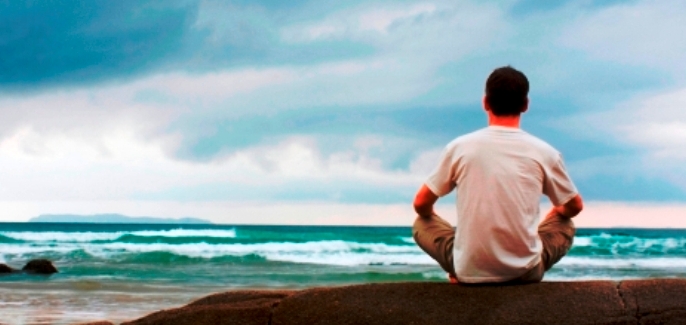
Aug 19, 2017 | Non categorizzato
 Praying does not consist specifically in dedicating time to meditation during the day, or in reading some passages of the Holy Scriptures or the writings of saints, and in trying to think of God or of ourselves for our own interior renewal. This is not the essence of prayer. Neither is it only the recitation of the rosary or morning and evening prayers. These are certainly expressions that help us to come in contact with God and express this intimate reality, which however never coincides completely with it. At most, a person can do all this during the day and may not have even prayed for an instant. In fact, there’s a substantial difference between prayer and prayers, which I shall try to explain, starting from the prayer that is mostly unconscious, but not less essential because of this. When, at night, we look up to watch the starry sky, we see a universe of unending beauty which enchants and amazes us in its silent obedience to a law: the law of life and harmony which from the beginning created it and sustains it in every moment: This law alone testifies to the Creator. The same goes for the stars in the sky, and the plants and flowers that “know” when it is time to blossom, when to bear fruit and die. A profound rapport thus binds all living creatures to God, a relation that – I dare say – is also a profound prayer because, with their beings and their sole existence, they unconsciously recognise and follow that law, “narrating the glory.” (Psalm 18.2). But this hidden prayer finds its highest expression – because it is free and conscious – also in man. It is that prayer which arises when man, even before entering into a dialogue with God, acknowledges him as the Father who created and sustains his being, on par with the entire universe. The relationship with God therefore stands out in its reality as the vital and together healing fundament all in one. And so, a relationship which man is called to establish daily with him, or to request from him, as some masters of the spirit do, in an original interpretation of the Our Father: “Give us today our daily bread,” is the request. Prayer, in order to be such, firstly demands a relationship with Jesus: to go with him, in spirit beyond our human condition, our worries, our prayers, though beautiful and necessary, and establish this intimate relationship with him. […] Let us now see some other ways through which this relationship can develop. I shall start from a type of prayer which apparently may not seem to such, and this is the prayer of offering. This is experienced by those who, prostrated by physical or spiritual sufferings, are unable to do anything, even to speak, and who offer to God, even if for the span of just an instant, all their existence. This type of prayer may thus be considered as the deepest type, since it embeds the soul in that point where our contact with God is immediate and direct. But also work can assume the type of a prayer of offering. I am thinking particularly of those who, during the day, are overcome by physical fatigue, and are almost unable to gather the necessary energy to dedicate themselves to prayer. Well, also they, if in the morning place an intention to offer their day to God, will feel that they are living in a continual dialogue with him, and in the evening, in the silence of even a brief moment of reflection will find union with him. And in the end, this is what humanity today is particularly sensitive to, the fact that the entire universe and all that it does, can be transformed into an immense, unceasing prayer that lifts up to God. Pasquale Foresi, from “Luce che si incarna” ( “Incarnated Light ”)– Ed.Città Nuova, Rome 2014, p. 31-32-33.
Praying does not consist specifically in dedicating time to meditation during the day, or in reading some passages of the Holy Scriptures or the writings of saints, and in trying to think of God or of ourselves for our own interior renewal. This is not the essence of prayer. Neither is it only the recitation of the rosary or morning and evening prayers. These are certainly expressions that help us to come in contact with God and express this intimate reality, which however never coincides completely with it. At most, a person can do all this during the day and may not have even prayed for an instant. In fact, there’s a substantial difference between prayer and prayers, which I shall try to explain, starting from the prayer that is mostly unconscious, but not less essential because of this. When, at night, we look up to watch the starry sky, we see a universe of unending beauty which enchants and amazes us in its silent obedience to a law: the law of life and harmony which from the beginning created it and sustains it in every moment: This law alone testifies to the Creator. The same goes for the stars in the sky, and the plants and flowers that “know” when it is time to blossom, when to bear fruit and die. A profound rapport thus binds all living creatures to God, a relation that – I dare say – is also a profound prayer because, with their beings and their sole existence, they unconsciously recognise and follow that law, “narrating the glory.” (Psalm 18.2). But this hidden prayer finds its highest expression – because it is free and conscious – also in man. It is that prayer which arises when man, even before entering into a dialogue with God, acknowledges him as the Father who created and sustains his being, on par with the entire universe. The relationship with God therefore stands out in its reality as the vital and together healing fundament all in one. And so, a relationship which man is called to establish daily with him, or to request from him, as some masters of the spirit do, in an original interpretation of the Our Father: “Give us today our daily bread,” is the request. Prayer, in order to be such, firstly demands a relationship with Jesus: to go with him, in spirit beyond our human condition, our worries, our prayers, though beautiful and necessary, and establish this intimate relationship with him. […] Let us now see some other ways through which this relationship can develop. I shall start from a type of prayer which apparently may not seem to such, and this is the prayer of offering. This is experienced by those who, prostrated by physical or spiritual sufferings, are unable to do anything, even to speak, and who offer to God, even if for the span of just an instant, all their existence. This type of prayer may thus be considered as the deepest type, since it embeds the soul in that point where our contact with God is immediate and direct. But also work can assume the type of a prayer of offering. I am thinking particularly of those who, during the day, are overcome by physical fatigue, and are almost unable to gather the necessary energy to dedicate themselves to prayer. Well, also they, if in the morning place an intention to offer their day to God, will feel that they are living in a continual dialogue with him, and in the evening, in the silence of even a brief moment of reflection will find union with him. And in the end, this is what humanity today is particularly sensitive to, the fact that the entire universe and all that it does, can be transformed into an immense, unceasing prayer that lifts up to God. Pasquale Foresi, from “Luce che si incarna” ( “Incarnated Light ”)– Ed.Città Nuova, Rome 2014, p. 31-32-33.
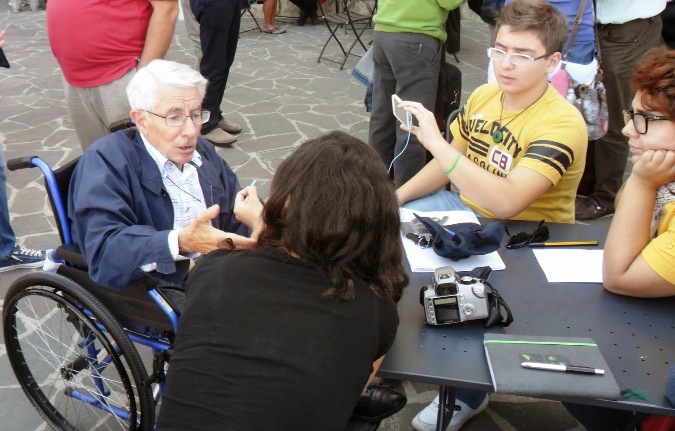
Aug 18, 2017 | Focolare Worldwide
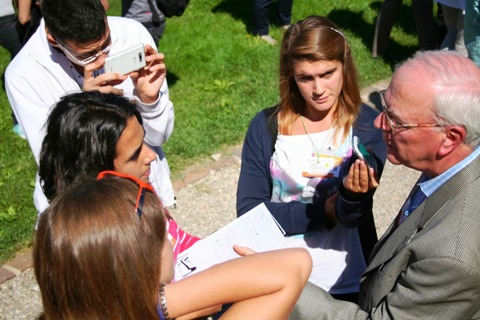 Who like me, while wanting to give the best of themselves, has found it a little difficult at times? We wanted to treat the people around us well, but we spoke badly; we wanted to help, but our egoism got in the way. That’s why several of my friends and I came up with a solution. It all began with two of us who were finding it hard to always give the best of themselves, and they realized they needed to find a way to support one another’s efforts, since it’s easier to love and respect others when you know that there’s someone else on your side that’s trying to do the same. A “pact” was beginning to be born that would help each of us to be more constant with the challenge of giving the best of ourselves in our relationships with other people. But that promise didn’t end with us. In fact, they told others about it, and those people found themselves in the same predicament.
Who like me, while wanting to give the best of themselves, has found it a little difficult at times? We wanted to treat the people around us well, but we spoke badly; we wanted to help, but our egoism got in the way. That’s why several of my friends and I came up with a solution. It all began with two of us who were finding it hard to always give the best of themselves, and they realized they needed to find a way to support one another’s efforts, since it’s easier to love and respect others when you know that there’s someone else on your side that’s trying to do the same. A “pact” was beginning to be born that would help each of us to be more constant with the challenge of giving the best of ourselves in our relationships with other people. But that promise didn’t end with us. In fact, they told others about it, and those people found themselves in the same predicament.  At that point we took the promise too, and really put our selves into it. We even found a “sign” that would help ut remember the daily “pact” and that would support us: a wristband of white twine. We interiorized the “pact” and made it part of our life. Since it helped us so much, we decided to spread it around the city, telling everyone we knew about our experience with it. This set off a chain reaction and the news about the “pact” began to spread all over Italy. In recent months we’ve received so many pictures and expriences of people who have accepted the challenge; so now we’d like to invite everyone who would be interested to put on a white wristband and take the challenge with us. If you’d like more information, or would like to tell us about yourself , the good things that have happened when you tried to give the best of yourself in every moment, write to us at: ilpattobraccialetto@gmail.com Some of your testimonies will be published in our Teens Magazine. From: Teens online
At that point we took the promise too, and really put our selves into it. We even found a “sign” that would help ut remember the daily “pact” and that would support us: a wristband of white twine. We interiorized the “pact” and made it part of our life. Since it helped us so much, we decided to spread it around the city, telling everyone we knew about our experience with it. This set off a chain reaction and the news about the “pact” began to spread all over Italy. In recent months we’ve received so many pictures and expriences of people who have accepted the challenge; so now we’d like to invite everyone who would be interested to put on a white wristband and take the challenge with us. If you’d like more information, or would like to tell us about yourself , the good things that have happened when you tried to give the best of yourself in every moment, write to us at: ilpattobraccialetto@gmail.com Some of your testimonies will be published in our Teens Magazine. From: Teens online

Aug 17, 2017 | Focolare Worldwide
 Builders of peace “In a situation of extreme crisis which the country is undergoing, we want to help each other lives as authentic Christians. In Valencia, the city most struck by plunders, we experienced days of confusion and mass hysteria. Many industrial zones were savagely ransacked without the intervention of the police. We even saw the same army incite the plunder of shops, even bringing trucks and equipment. The city is blocked, there are arrests and a tense climate, anger and hunger. In the meantime, in the family and with other friends we are trying to support to one another and convey hope, without judging those who have taken away all sorts of items from the stores, even kitchen appliance and auto components. But we are also witnessing the help of Divine Providence with the arrival of medicine and food for entire families. It is amazing how God’s love watches over us, his children.” (O.T. – Venezuela) Cook “As a cook, I like to imagine life as an exercise to reach the banquet in Heaven, Didn’t Jesus start his public life with a wedding banquet in Cana? Didn’t he take part in many banquets, up to the last supper, and promised a final banquet in which, certainly, many cooks like will find their seats? In my service in the kitchen, the objective is not so much the dish in itself, but the people who will taste the fruit of my work. I try not to work only in view of my career, but to be a good husband and father, but for God.” (V. – Italy) The “trick” «In the apartment I share with other students, cohabitation isn’t always easy t because their habits are very different from mine. One day, discouraged, I was thinking of finding another lodging, when my girlfriend suggested that I take the initiative to do something for my co-boarders. She herself helped me bake a cake. Such a simple gesture! And yet, it helped to ease our relationships, in such a way that a kind of competition to help one another started among us. Now I know the “trick” whenever some difficulties arise: I can start by being the first to love.” (B. C. – Czech Republic) Real poverty “I have a disabled friend who gets a minimum pension and is isolated by his brothers and sisters. One day he told me: “I bought a pair of shoes for G. and every day I offer him breakfast at the bar. Now I am thinking of paying for his denture.” He does such acts daily and yet they say he is antisocial and that he is even short of mind. Instead the goodness of this man, in his conditions, is able to pay attention to others’ needs, always moves me. One day he said “When someone suffers, I feel that he resembles me a lot. And being able to help him makes me feel alive and fulfilled.” (T. – Italy)
Builders of peace “In a situation of extreme crisis which the country is undergoing, we want to help each other lives as authentic Christians. In Valencia, the city most struck by plunders, we experienced days of confusion and mass hysteria. Many industrial zones were savagely ransacked without the intervention of the police. We even saw the same army incite the plunder of shops, even bringing trucks and equipment. The city is blocked, there are arrests and a tense climate, anger and hunger. In the meantime, in the family and with other friends we are trying to support to one another and convey hope, without judging those who have taken away all sorts of items from the stores, even kitchen appliance and auto components. But we are also witnessing the help of Divine Providence with the arrival of medicine and food for entire families. It is amazing how God’s love watches over us, his children.” (O.T. – Venezuela) Cook “As a cook, I like to imagine life as an exercise to reach the banquet in Heaven, Didn’t Jesus start his public life with a wedding banquet in Cana? Didn’t he take part in many banquets, up to the last supper, and promised a final banquet in which, certainly, many cooks like will find their seats? In my service in the kitchen, the objective is not so much the dish in itself, but the people who will taste the fruit of my work. I try not to work only in view of my career, but to be a good husband and father, but for God.” (V. – Italy) The “trick” «In the apartment I share with other students, cohabitation isn’t always easy t because their habits are very different from mine. One day, discouraged, I was thinking of finding another lodging, when my girlfriend suggested that I take the initiative to do something for my co-boarders. She herself helped me bake a cake. Such a simple gesture! And yet, it helped to ease our relationships, in such a way that a kind of competition to help one another started among us. Now I know the “trick” whenever some difficulties arise: I can start by being the first to love.” (B. C. – Czech Republic) Real poverty “I have a disabled friend who gets a minimum pension and is isolated by his brothers and sisters. One day he told me: “I bought a pair of shoes for G. and every day I offer him breakfast at the bar. Now I am thinking of paying for his denture.” He does such acts daily and yet they say he is antisocial and that he is even short of mind. Instead the goodness of this man, in his conditions, is able to pay attention to others’ needs, always moves me. One day he said “When someone suffers, I feel that he resembles me a lot. And being able to help him makes me feel alive and fulfilled.” (T. – Italy)
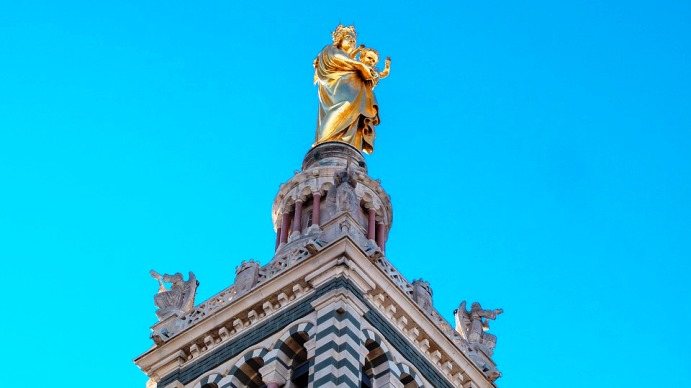
Aug 15, 2017 | Non categorizzato
 “The very thought of talking about Mary makes my soul tremble and my heart patter. This is a topic that lies beyond our faculties and silence would be more appropriate than words. Mary! The most extraordinary among all created beings, exalted to the point of being clothed with the title and reality Mother of God and therefore Immaculate, Assumed into Heaven, Queen and Mother of the Church. Mary is closer to God than to human creatures, and yet she’s a creature just like us, and that’s how she stands in front of the Creator. This is why it’s possible for her to be like an inclined plane for us, which touches heaven and earth. And so, even in her extraordinary state, she can be: a girl, young woman, fiance, mother, spouse, widow… just like us who at any age or in any condition in life can find a connection with her and therefore a model. […] As for having a true devotion to her – while recognizing the many devotions that have blossomed down through the ages to provide the Christian people with the sense of her maternal love, bearing in mind all the large and small woes in life – I would advise a way that brings to life in our hearts a love for Mary that’s like the kind Jesus has for her. While Mary has all those magnificent and extraordinary qualities that you know about, she’s also ‘the perfect Christian’. And, as you can see from the Gospel, she doesn’t live her own life but lets God’s law live in her. She’s the one who can say better than any other: ‘It is no longer I who live, but Christ living in me” (Gal 2:20). Mary is the living Word of God. If you really want to love her, ‘imitate her’. You be living Word of God! Imitating her makes you similar to her and leads you to love her because, as the saying goes, ‘Love either finds or makes equals,’ and it’s also true that equals love each other. […] So let’s imitate Mary, let’s become like her and love for her will suddenly blossom in our own hearts.” Chiara Lubich “Dialogo aperto”. Pubblicato in Città Nuova, 1976, n. 9, p. 33. See Centro Chiara Lubich
“The very thought of talking about Mary makes my soul tremble and my heart patter. This is a topic that lies beyond our faculties and silence would be more appropriate than words. Mary! The most extraordinary among all created beings, exalted to the point of being clothed with the title and reality Mother of God and therefore Immaculate, Assumed into Heaven, Queen and Mother of the Church. Mary is closer to God than to human creatures, and yet she’s a creature just like us, and that’s how she stands in front of the Creator. This is why it’s possible for her to be like an inclined plane for us, which touches heaven and earth. And so, even in her extraordinary state, she can be: a girl, young woman, fiance, mother, spouse, widow… just like us who at any age or in any condition in life can find a connection with her and therefore a model. […] As for having a true devotion to her – while recognizing the many devotions that have blossomed down through the ages to provide the Christian people with the sense of her maternal love, bearing in mind all the large and small woes in life – I would advise a way that brings to life in our hearts a love for Mary that’s like the kind Jesus has for her. While Mary has all those magnificent and extraordinary qualities that you know about, she’s also ‘the perfect Christian’. And, as you can see from the Gospel, she doesn’t live her own life but lets God’s law live in her. She’s the one who can say better than any other: ‘It is no longer I who live, but Christ living in me” (Gal 2:20). Mary is the living Word of God. If you really want to love her, ‘imitate her’. You be living Word of God! Imitating her makes you similar to her and leads you to love her because, as the saying goes, ‘Love either finds or makes equals,’ and it’s also true that equals love each other. […] So let’s imitate Mary, let’s become like her and love for her will suddenly blossom in our own hearts.” Chiara Lubich “Dialogo aperto”. Pubblicato in Città Nuova, 1976, n. 9, p. 33. See Centro Chiara Lubich
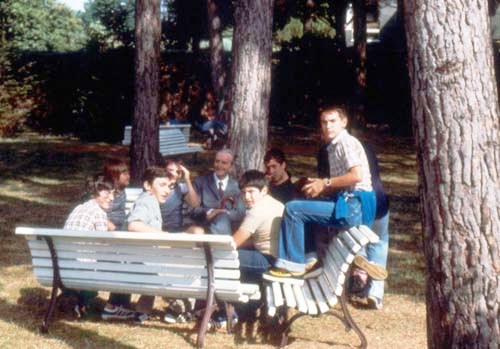
Aug 13, 2017 | Non categorizzato
 Igino Giordani treated young people with the love that emerges from the unity among generations. He was a brother to everyone, child or grown-up, because fraternity gathers us into one in the sight of the one Father: “Jesus used very vivid words to express his close kinship with people. One can only imagine how he loved his mother and cousins, childhood friends and the confidants of his youth. Yet, one time, when their arrival was announced to him as he was teaching, he responded: ‘Who is my mother and who are my brothers and sisters?’ And extending his hand towards his disciples, he said: ‘There is my mother, there are my brothers: whoever does the will of my Father in heaven is my brother, sister and mother’ (see Mt 12:48-50). The meaning of his answer is obvious: whoever accepts God’s fatherhood, becomes brother, sister and mother of Jesus. Christianity relates us to Christ and, through Him, to God, with the first degree of kinship which is brotherhood” [Igino Giordani, Il messaggio sociale del cristianesimo, 2001, p. 87]. Giordani compared the unity among generations to driving a car: youth is like the engine; old age like a prudent guide; both of them are required for arriving at the goal! From among his many letters, in 1979, a year before his death, there is one from a nine year old boy nicknamed Sandokan, who establishes a profound relationship with Igino, whom he calls ‘Little Grandpa with the heart of a Gen.” “Dear Grandpa, ever since I heard that you were sick, I’ve been trying to pray more for you. Today Mom, Dad and I asked the priest to remember you at Mass. And I asked Jesus in my heart to help and be close to you in this moment. I remember that in one letter I told you I’d visit you at home, but I couldn’t – but the important thing is to have you in my heart and [for me to be] in yours. When you’ve left us all, would you say hi to Jesus for us? You know, I’m sad that you’re going because I love you very much – but I’m glad that you’re going to be able to see Jesus who was everything for you. A big kiss from your Sandokan.” “Dearest Sandokan, also known as Fernando, I remember you very well. You and I are sons of the same Father, Jesus. And I spend my days alongside you, without a care for the fact that we live far from one another. Dad told you well: I’m a grandpa with the heart of a Gen. So that means we’re the same age as brothers. Just remember me to your little brothers who are also Jesus’s sons; and love them as you love Mom and Dad and as you love Jesus… A kiss on the nose from your Grandpa.” On the benches of the Mariapolis Centre, during the congresses that were offered to them by the Focolare Movement, the young people crowded around him, singing, dancing and discussing their lives with him. Each of them felt loved and made pacts with him to follow and live the Ideal of unity that Chiara Lubich had proposed. Giordani made a note of one of those joyful encounters in his diary: “Even though I’m without voice today, they asked me to say something at the school for the Gen boys and girls – three hundred people. I improvised, talking about different things, but focusing them on the mystery of love that is contained in the God-Brother-Me triad. There was an explosion of enthusiasm among the Gen boys and girls that was enhanced by songs and demonstrations of joy and unity among all” [from: Diario di fuoco, April 25, 1979].
Igino Giordani treated young people with the love that emerges from the unity among generations. He was a brother to everyone, child or grown-up, because fraternity gathers us into one in the sight of the one Father: “Jesus used very vivid words to express his close kinship with people. One can only imagine how he loved his mother and cousins, childhood friends and the confidants of his youth. Yet, one time, when their arrival was announced to him as he was teaching, he responded: ‘Who is my mother and who are my brothers and sisters?’ And extending his hand towards his disciples, he said: ‘There is my mother, there are my brothers: whoever does the will of my Father in heaven is my brother, sister and mother’ (see Mt 12:48-50). The meaning of his answer is obvious: whoever accepts God’s fatherhood, becomes brother, sister and mother of Jesus. Christianity relates us to Christ and, through Him, to God, with the first degree of kinship which is brotherhood” [Igino Giordani, Il messaggio sociale del cristianesimo, 2001, p. 87]. Giordani compared the unity among generations to driving a car: youth is like the engine; old age like a prudent guide; both of them are required for arriving at the goal! From among his many letters, in 1979, a year before his death, there is one from a nine year old boy nicknamed Sandokan, who establishes a profound relationship with Igino, whom he calls ‘Little Grandpa with the heart of a Gen.” “Dear Grandpa, ever since I heard that you were sick, I’ve been trying to pray more for you. Today Mom, Dad and I asked the priest to remember you at Mass. And I asked Jesus in my heart to help and be close to you in this moment. I remember that in one letter I told you I’d visit you at home, but I couldn’t – but the important thing is to have you in my heart and [for me to be] in yours. When you’ve left us all, would you say hi to Jesus for us? You know, I’m sad that you’re going because I love you very much – but I’m glad that you’re going to be able to see Jesus who was everything for you. A big kiss from your Sandokan.” “Dearest Sandokan, also known as Fernando, I remember you very well. You and I are sons of the same Father, Jesus. And I spend my days alongside you, without a care for the fact that we live far from one another. Dad told you well: I’m a grandpa with the heart of a Gen. So that means we’re the same age as brothers. Just remember me to your little brothers who are also Jesus’s sons; and love them as you love Mom and Dad and as you love Jesus… A kiss on the nose from your Grandpa.” On the benches of the Mariapolis Centre, during the congresses that were offered to them by the Focolare Movement, the young people crowded around him, singing, dancing and discussing their lives with him. Each of them felt loved and made pacts with him to follow and live the Ideal of unity that Chiara Lubich had proposed. Giordani made a note of one of those joyful encounters in his diary: “Even though I’m without voice today, they asked me to say something at the school for the Gen boys and girls – three hundred people. I improvised, talking about different things, but focusing them on the mystery of love that is contained in the God-Brother-Me triad. There was an explosion of enthusiasm among the Gen boys and girls that was enhanced by songs and demonstrations of joy and unity among all” [from: Diario di fuoco, April 25, 1979].
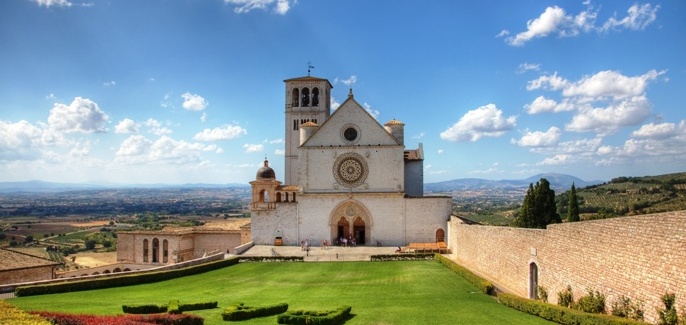
Aug 11, 2017 | Non categorizzato
 The first event in Mary’s life mentioned in the New Testament is the Annunciation (cf. Lk 1:25ff). Mary had been chosen by God from eternity, but something very special happened to her at the Annunciation. The angel appeared to her with a message from God, and Mary accepted it. Because of her yes, a new reality was immediately born within her: the incarnation of Jesus in her womb. If we try to understand the lives of some saints, we can see that something analogous to what took place in Mary happens spiritually in them as well, when, for example, they come across a charism that God has given for the good of the Church. We know the story of Saint Clare of Assisi, the most perfect disciple of Saint Francis. It sometimes happens that, while visiting the Church of Saint Damian in Assisi, where she lived, the tour guide describes that sacred place by saying, “Here is where Christ was incarnated in the heart of Clare.” And these are not just words; they reveal a profound truth. Even though Clare of Assisi had, we may assume, lived in a state of grace, her meeting with Francis brought about something new in her. Francis was the personification of a word of God addressed to the world anew — the word “poverty.” Meeting him caused Christ to develop and grow in Clare, to the extent that she became one of the greatest saints of the universal Church. And is it not indeed the thought of popes, saints and Church Fathers, that the Word generates Christ in souls? Likewise, when at a certain point in our lives we come to know the charism of unity, through another person, a publication or a meeting, and we feel God’s call to make it our own, if we say our yes, something similar to that which happened to Mary and the saints happens to us. Christ can truly begin to develop and grow spiritually in our hearts, as though by an actualization of our baptism. I read that Clare of Assisi before dying said these marvellous words, “I thank you, Lord, for having created me,” meaning, by creating me you have acquired your own glory. Hers was a death of love. If only heaven would wish something like this for us! If we remain faithful, our own death too will not be simply a physical death, but a death of love. We too will rise up to meet our mother, our saint, our model, the one who on this earth was our head, our queen, and our mother. And we will see the glory of Mary, queen of heaven and of earth. Above all, we will see her surrounded by those who loved her in a special way. From Chiara Lubich, “Mary – Transparency of God”, New City, London, 2003 – pp. 52-53, 67.
The first event in Mary’s life mentioned in the New Testament is the Annunciation (cf. Lk 1:25ff). Mary had been chosen by God from eternity, but something very special happened to her at the Annunciation. The angel appeared to her with a message from God, and Mary accepted it. Because of her yes, a new reality was immediately born within her: the incarnation of Jesus in her womb. If we try to understand the lives of some saints, we can see that something analogous to what took place in Mary happens spiritually in them as well, when, for example, they come across a charism that God has given for the good of the Church. We know the story of Saint Clare of Assisi, the most perfect disciple of Saint Francis. It sometimes happens that, while visiting the Church of Saint Damian in Assisi, where she lived, the tour guide describes that sacred place by saying, “Here is where Christ was incarnated in the heart of Clare.” And these are not just words; they reveal a profound truth. Even though Clare of Assisi had, we may assume, lived in a state of grace, her meeting with Francis brought about something new in her. Francis was the personification of a word of God addressed to the world anew — the word “poverty.” Meeting him caused Christ to develop and grow in Clare, to the extent that she became one of the greatest saints of the universal Church. And is it not indeed the thought of popes, saints and Church Fathers, that the Word generates Christ in souls? Likewise, when at a certain point in our lives we come to know the charism of unity, through another person, a publication or a meeting, and we feel God’s call to make it our own, if we say our yes, something similar to that which happened to Mary and the saints happens to us. Christ can truly begin to develop and grow spiritually in our hearts, as though by an actualization of our baptism. I read that Clare of Assisi before dying said these marvellous words, “I thank you, Lord, for having created me,” meaning, by creating me you have acquired your own glory. Hers was a death of love. If only heaven would wish something like this for us! If we remain faithful, our own death too will not be simply a physical death, but a death of love. We too will rise up to meet our mother, our saint, our model, the one who on this earth was our head, our queen, and our mother. And we will see the glory of Mary, queen of heaven and of earth. Above all, we will see her surrounded by those who loved her in a special way. From Chiara Lubich, “Mary – Transparency of God”, New City, London, 2003 – pp. 52-53, 67.
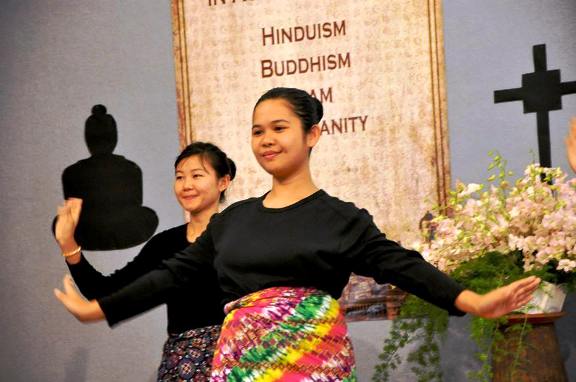
Aug 10, 2017 | Focolare Worldwide
Arr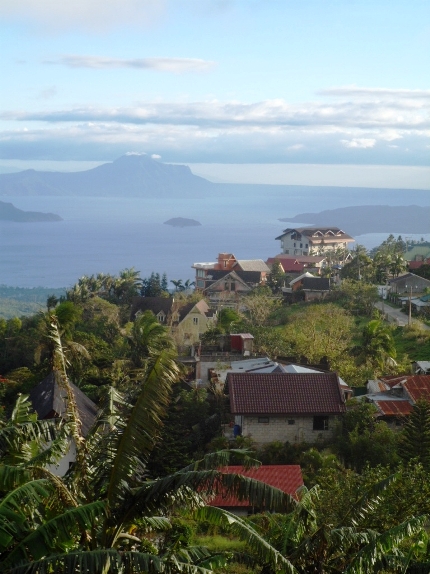 iving from Manila 60 km away, your first sensation as you come upon the region of Lake Taal on the island of Luzon is one of deep peace. Visitors are enchanted by such a unique sight: a lake whose waters have filled an ancient caldera with an island in its midst. That island, in turn, which is set in a more recent crater, has another much smaller lake. And at the centre of that small water mirror sits another island. It has that Russian doll effect with one lake contained inside the other. From the top of the volcano the view extends over green hills of fields and forests, pineapple, coffee and endless varieties of banana plantations and tropical flowers.
iving from Manila 60 km away, your first sensation as you come upon the region of Lake Taal on the island of Luzon is one of deep peace. Visitors are enchanted by such a unique sight: a lake whose waters have filled an ancient caldera with an island in its midst. That island, in turn, which is set in a more recent crater, has another much smaller lake. And at the centre of that small water mirror sits another island. It has that Russian doll effect with one lake contained inside the other. From the top of the volcano the view extends over green hills of fields and forests, pineapple, coffee and endless varieties of banana plantations and tropical flowers. 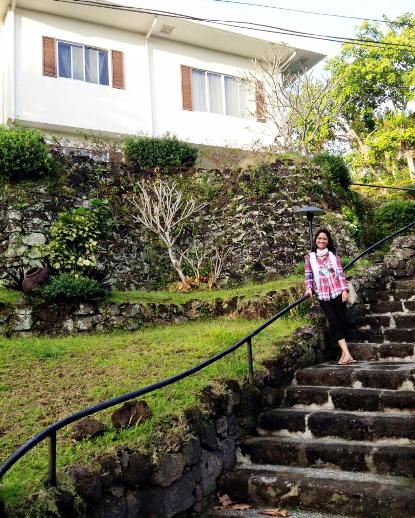 Ever since 1982 visitors have had the same sensation among the streets and buildings of Mariapolis Peace in Tagaytay, which was the first permanent Mariapolis in Asia. “I have a dream,” exclaimed Chiara Lubich that year, as she observed the hills of Tagaytay: “that precisely there, a Focolare town would rise where the Gospel would be lived out in a steady way in order to give a picture of what the world would be like if we all lived the Gospel. The presence of the Focolare in Tagaytay is, however, far farther in time. The Focolare’s presence in the Philippines goes back much further in time. Already in 1966, the first meetings of Focolare members were being held in Tagaytay. Taken by the beauty of the natural surroundings, those members had prayed that one day there would be a centre for gatherings of Focolare members in that place, a “home for all of them”. Thanks to a generous donation the following year, that dream began to come true and take shape in 1975. Then came the events and dream in 1982, with the coincidental invitation to the Focolare Movement by the Philippine Bishops Conference to build, right there in the vicinity of Tagaytay, a “school” for Asian priests. Ever since then the development has been unexpectedly surprising. In particular, among the ten constructions that have been erected, there is a school of dialogue with the Great Religions of Asia, geared particularly towards Muslims and Buddhists, but also Hindus and Shintoists. Every year Buddhist youths from a lay Japanese association converge on the property to experience the joy of living living life together. Recently, in May, 200 members of the Great Religions from 13 Asian countries attended the School of Oriental Religions (SOR).
Ever since 1982 visitors have had the same sensation among the streets and buildings of Mariapolis Peace in Tagaytay, which was the first permanent Mariapolis in Asia. “I have a dream,” exclaimed Chiara Lubich that year, as she observed the hills of Tagaytay: “that precisely there, a Focolare town would rise where the Gospel would be lived out in a steady way in order to give a picture of what the world would be like if we all lived the Gospel. The presence of the Focolare in Tagaytay is, however, far farther in time. The Focolare’s presence in the Philippines goes back much further in time. Already in 1966, the first meetings of Focolare members were being held in Tagaytay. Taken by the beauty of the natural surroundings, those members had prayed that one day there would be a centre for gatherings of Focolare members in that place, a “home for all of them”. Thanks to a generous donation the following year, that dream began to come true and take shape in 1975. Then came the events and dream in 1982, with the coincidental invitation to the Focolare Movement by the Philippine Bishops Conference to build, right there in the vicinity of Tagaytay, a “school” for Asian priests. Ever since then the development has been unexpectedly surprising. In particular, among the ten constructions that have been erected, there is a school of dialogue with the Great Religions of Asia, geared particularly towards Muslims and Buddhists, but also Hindus and Shintoists. Every year Buddhist youths from a lay Japanese association converge on the property to experience the joy of living living life together. Recently, in May, 200 members of the Great Religions from 13 Asian countries attended the School of Oriental Religions (SOR).  From its founding, Mariapolis Pace has assumed the profile of a centre for human development, becoming one of the venues of the Bukas Palad Foundation, a non-profit NGO, founded near Manila in 1983 to respond to the social and sanitary needs of the poorest sections of the population, especially in rural regions. Entire families live in precarious situations – often in one-room homes with dirt floors and no running water – with little or no access to medical care and scarce job opportunities. With their motto: “Freely we have received; freely we give,” Bukas Palad (with open hands), has been on course for more than thirty years, improving the quality of life for thousands of people, not only medically, but also humanly and spiritualy, with an integrated and holistic approach focused on human health and development. The workshops are currently a highlight of the Mariapolis, which adhere to the Economy of Communion Project, with the hospital volunteer activities in several public health structures, along with the lively testimony of workers in the media and several education projects. The experiences of dialogue and sharing grow and multiply like the water in a lake that is replicated in other mirrors of water. But the reflections of Mariapolis Peace cannot be counted.
From its founding, Mariapolis Pace has assumed the profile of a centre for human development, becoming one of the venues of the Bukas Palad Foundation, a non-profit NGO, founded near Manila in 1983 to respond to the social and sanitary needs of the poorest sections of the population, especially in rural regions. Entire families live in precarious situations – often in one-room homes with dirt floors and no running water – with little or no access to medical care and scarce job opportunities. With their motto: “Freely we have received; freely we give,” Bukas Palad (with open hands), has been on course for more than thirty years, improving the quality of life for thousands of people, not only medically, but also humanly and spiritualy, with an integrated and holistic approach focused on human health and development. The workshops are currently a highlight of the Mariapolis, which adhere to the Economy of Communion Project, with the hospital volunteer activities in several public health structures, along with the lively testimony of workers in the media and several education projects. The experiences of dialogue and sharing grow and multiply like the water in a lake that is replicated in other mirrors of water. But the reflections of Mariapolis Peace cannot be counted.
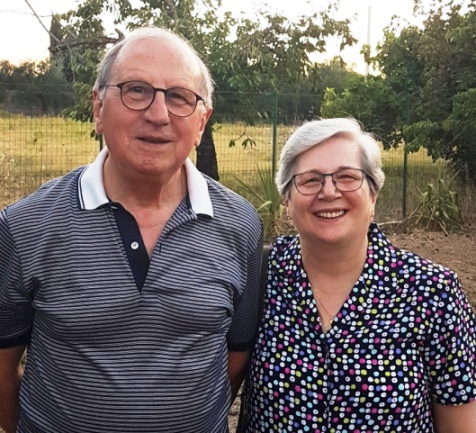
Aug 9, 2017 | Focolare Worldwide
 As a child, I loved to tune in to Vatican Radio in the evenings, which would broadcast news in various foreign languages. Naturally, I didn’t know any of those languages, but listening fascinated me. It seemed like my heart was expanding to all humanity, its people and their everyday lives. It was during one of these evenings that I happened to hear Pope Pius XII invoke the name of God three times: “God, God, God!” That cry was imprinted on my conscience, even if, with the passing of time, it dimmed and was lost to memory. This was 1956. Nine years later, in January 1963, I found myself in Turin, in the military. A bunkmate invited me to a conference, which, strangely enough, I didn’t ask anything about beforehand. As I requested permission from my superiors, I found myself asking as if my whole life depended on it. When they unexpectedly agreed, I left for Ala di Stura, a small mountain village in a marvelous corner of nature. After having been welcomed by those present as if we had always known one another, it was there that I met Chiara Lubich – the founder of Focolare – and Igino Giordani, a co-founder. It made a strong impression on me to meet people from different cultures and religions. I also was able to meet during that time, since she was also hosted by Focolare, Assunta Roncalli, who was Pope John XXIII’s sister. He died that same year on June 3, 1963. One morning Chiara spoke about a new calling that had started in the movement. It was only when she explained the year and circumstances of how it had begun that something urgently returned to mind: “God, God, God! God will help you, God will be your strength. May this indescribable name resound, the source of every right, justice and freedom, in parliaments, squares, houses and offices…” That was what the pope said in his radio message on November 10, 1956, when the revolution in Hungary was crushed. “There was a society that erased the name of God, the reality of God, the providence of God, and the love of God from people’s hearts,” Chiara commented. “So there must be a society that is able to return him to his rightful place. Is it possible that the devil has his faithful followers, totalitarians, pseudo-martyrs for his cause, and God not have a small army of Christians that give everything to take back the world for him? Chiara responded to that call of the pope with her intuition to gather women and men of all ages, nationalities, conditions, bound by a single link: that of universal fraternity. They would form an army of volunteers, the Volunteers of God, part of the Focolare Movement that today is present in 182 countries. It is a modern, radical calling. Chiara Lubich gives it an additional fascinating touch when she describes it as the “attraction of modern times”: “To achieve the highest contemplation while remaining mixed in the crowd, side by side with people… to shine embellishing light on everyone, and at the same time, share with our neighbors their shame, fame, bruises and brief joys.” Igino Giordani compares it to “sanctity in worker’s clothing, spurred to bring God in parliament, in local councils, in hospitals, schools, offices, shops, studios, home, on the bocce field, but also in the world of art, communication, science, economics…” Because, he adds, “to bring God to these places means transforming them into abbeys, changing them into holy places where each day a special mass is celebrated!” Fifty-four years have passed since that day I heard the call to enroll with the Volunteers of God, who were born from a charism that, because it is genuine, can be measured by its tangible results in culture, society, economics, politics… so that the various areas of life do not remain mediocre, hopeless, divided and callous, but open to welcome the deep presence of God. Gennaro Piccolo, “A way for unity,” Centro Igino Giordani, Andria, Italy
As a child, I loved to tune in to Vatican Radio in the evenings, which would broadcast news in various foreign languages. Naturally, I didn’t know any of those languages, but listening fascinated me. It seemed like my heart was expanding to all humanity, its people and their everyday lives. It was during one of these evenings that I happened to hear Pope Pius XII invoke the name of God three times: “God, God, God!” That cry was imprinted on my conscience, even if, with the passing of time, it dimmed and was lost to memory. This was 1956. Nine years later, in January 1963, I found myself in Turin, in the military. A bunkmate invited me to a conference, which, strangely enough, I didn’t ask anything about beforehand. As I requested permission from my superiors, I found myself asking as if my whole life depended on it. When they unexpectedly agreed, I left for Ala di Stura, a small mountain village in a marvelous corner of nature. After having been welcomed by those present as if we had always known one another, it was there that I met Chiara Lubich – the founder of Focolare – and Igino Giordani, a co-founder. It made a strong impression on me to meet people from different cultures and religions. I also was able to meet during that time, since she was also hosted by Focolare, Assunta Roncalli, who was Pope John XXIII’s sister. He died that same year on June 3, 1963. One morning Chiara spoke about a new calling that had started in the movement. It was only when she explained the year and circumstances of how it had begun that something urgently returned to mind: “God, God, God! God will help you, God will be your strength. May this indescribable name resound, the source of every right, justice and freedom, in parliaments, squares, houses and offices…” That was what the pope said in his radio message on November 10, 1956, when the revolution in Hungary was crushed. “There was a society that erased the name of God, the reality of God, the providence of God, and the love of God from people’s hearts,” Chiara commented. “So there must be a society that is able to return him to his rightful place. Is it possible that the devil has his faithful followers, totalitarians, pseudo-martyrs for his cause, and God not have a small army of Christians that give everything to take back the world for him? Chiara responded to that call of the pope with her intuition to gather women and men of all ages, nationalities, conditions, bound by a single link: that of universal fraternity. They would form an army of volunteers, the Volunteers of God, part of the Focolare Movement that today is present in 182 countries. It is a modern, radical calling. Chiara Lubich gives it an additional fascinating touch when she describes it as the “attraction of modern times”: “To achieve the highest contemplation while remaining mixed in the crowd, side by side with people… to shine embellishing light on everyone, and at the same time, share with our neighbors their shame, fame, bruises and brief joys.” Igino Giordani compares it to “sanctity in worker’s clothing, spurred to bring God in parliament, in local councils, in hospitals, schools, offices, shops, studios, home, on the bocce field, but also in the world of art, communication, science, economics…” Because, he adds, “to bring God to these places means transforming them into abbeys, changing them into holy places where each day a special mass is celebrated!” Fifty-four years have passed since that day I heard the call to enroll with the Volunteers of God, who were born from a charism that, because it is genuine, can be measured by its tangible results in culture, society, economics, politics… so that the various areas of life do not remain mediocre, hopeless, divided and callous, but open to welcome the deep presence of God. Gennaro Piccolo, “A way for unity,” Centro Igino Giordani, Andria, Italy

Aug 8, 2017 | Senza categoria
 Francesco was a rugged sportsman, especially on his bike. Every day he would ride several kilometres over the tortuous and picturesque paths of the Roman hills, to help keep in shape. He looks young, but it’s already been quite a few years since he decided to give his life to loving God in the neighbours he meets each day – but also in the hard times in his own life as well as in the lives of others. A few days ago, during one of his usual workouts, his bike hit a rock and the steering wheel broke, catapulting him into the air. The landing wasn’t gentle . . . and the first to hit the hard asphalt was his neck, resulting in damage to the C2 vertebrae. In a single second the whole panorama changed: from intense physical training to immobility on a hospital bed, inside an iron “cage” from the neck up, kept in place with screws pressing against the skull. . . That’s also why it was important to him to stay in shape. The apparatus is meant to impede movement and hopefully lead to the soldering of the injured vertebrae. He sends a phone message from his hospital bed: “C2 Vertebrae, you barged in on my day and changed everything. I didn’t even know you were there and, if you were, where? Then came that abrupt landing on the asphalt and amidst all the broken parts you were the one everybody was worried about. You had the power to cause my death, or to render me immobile in a wheelchair. It was enough for you to allow the axis vertebrae to break … that piece of bone which makes it possible for me to move my head. Let’s hope that after this blow, I won’t have to change my vision of the world and that with the help of this futuristic device you will be able to go back to being the fulcrum of all that moves. Big C2, I’m trying to rebuild my relationship with you, not only out of self interest, but to know the amazing things of which we are made. Every little piece matters! May these moments help me to discover how valuable everything is in me, all of it the fruit of Your love.” Francesco (Italy)
Francesco was a rugged sportsman, especially on his bike. Every day he would ride several kilometres over the tortuous and picturesque paths of the Roman hills, to help keep in shape. He looks young, but it’s already been quite a few years since he decided to give his life to loving God in the neighbours he meets each day – but also in the hard times in his own life as well as in the lives of others. A few days ago, during one of his usual workouts, his bike hit a rock and the steering wheel broke, catapulting him into the air. The landing wasn’t gentle . . . and the first to hit the hard asphalt was his neck, resulting in damage to the C2 vertebrae. In a single second the whole panorama changed: from intense physical training to immobility on a hospital bed, inside an iron “cage” from the neck up, kept in place with screws pressing against the skull. . . That’s also why it was important to him to stay in shape. The apparatus is meant to impede movement and hopefully lead to the soldering of the injured vertebrae. He sends a phone message from his hospital bed: “C2 Vertebrae, you barged in on my day and changed everything. I didn’t even know you were there and, if you were, where? Then came that abrupt landing on the asphalt and amidst all the broken parts you were the one everybody was worried about. You had the power to cause my death, or to render me immobile in a wheelchair. It was enough for you to allow the axis vertebrae to break … that piece of bone which makes it possible for me to move my head. Let’s hope that after this blow, I won’t have to change my vision of the world and that with the help of this futuristic device you will be able to go back to being the fulcrum of all that moves. Big C2, I’m trying to rebuild my relationship with you, not only out of self interest, but to know the amazing things of which we are made. Every little piece matters! May these moments help me to discover how valuable everything is in me, all of it the fruit of Your love.” Francesco (Italy)
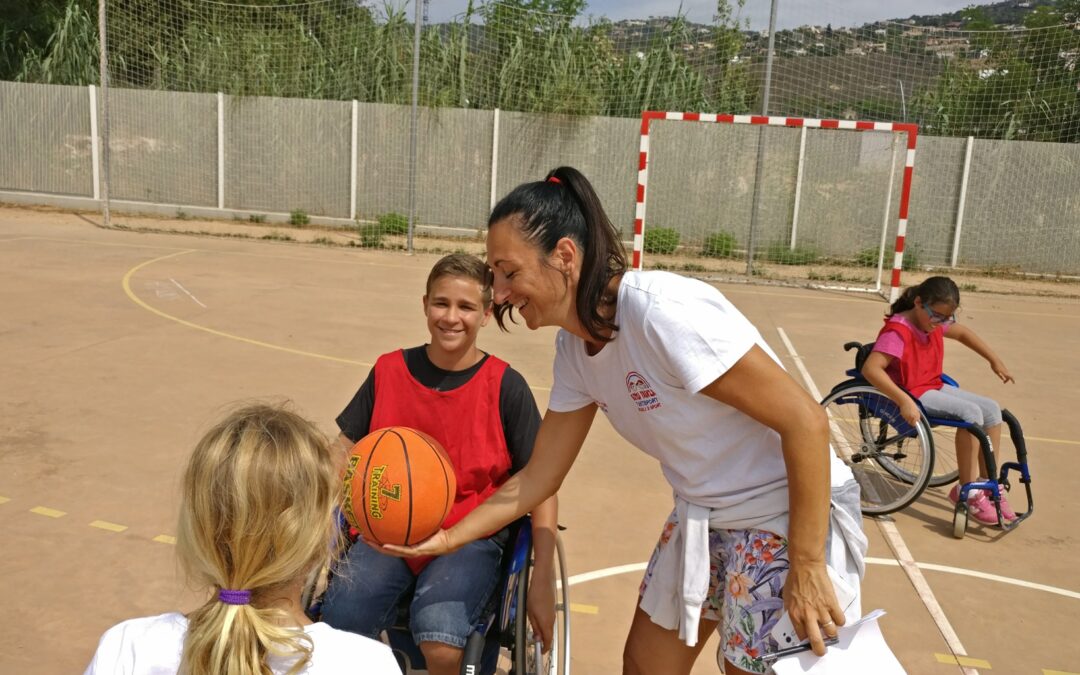
Aug 7, 2017 | Focolare Worldwide, Senza categoria
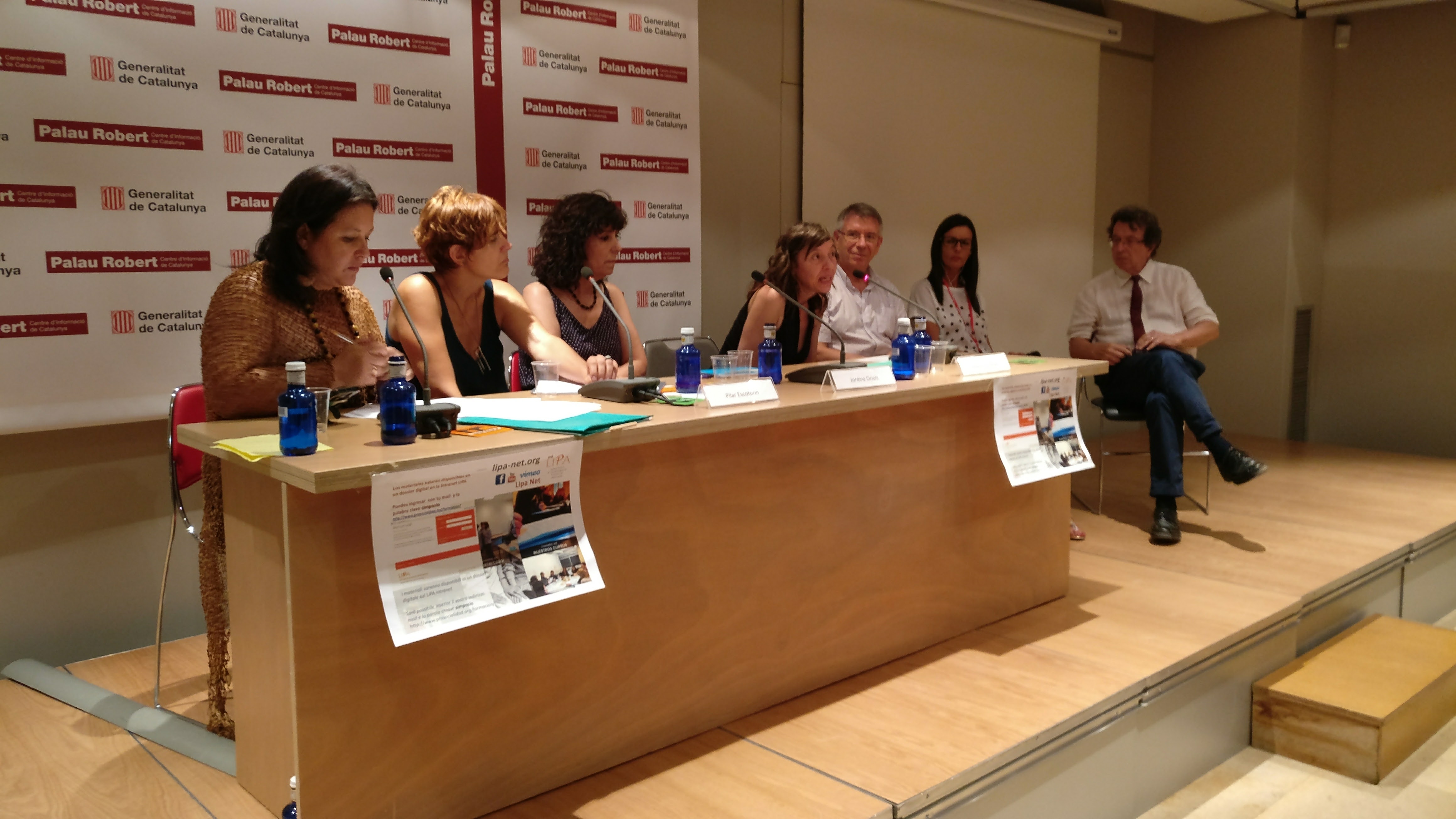 On July 13, 2017, seventy people from various places in Spain, Italy and Croatia attended the “Inclusive Schools, Social Innovation, Childhood and Sport Symposium” which was held at the Palau Robert Gardens of Barcelona. The event was organized by the Laboratorio de Investigación Prosocial Aplicada (LIPA), Universitat Autònoma de Barcelona and by the Sportmeet International Network. Teachers, physiotherapists and sport players took a closer look at projects that promote inclusion, intervention models and disability from the standpoint of inclusion, in the belief that no part of life is not worth living. Life needs to have a place for weakness, to experience, through weakness, one’s own ability to recuperate. In the days that followed, the Mariapolis Centre of Castell d’Aro provided the forum for the Summer School in which topics regarding inclusive sport were examined and discussed. Twenty people attended and were guided through the experience by experts Eugenio Jimènez and Dr Javier Lamoneda. Through games they learned what it’s like to be in the shoes of a person with a disability. By its very nature sport is an everyday opportunity to come face to face with limitations, and offers opportunities for reflection on the obstacles of life, suffering and disadvantage. The reflections that were presented by Paolo Crepaz from Sportmeet led the participants to question the concepts of limitation, barriers, obstacles, suffering and disadvantage from the standpoint of things that can be turned into potential, an opportunity to “constantly tend, by force of habit, towards universal brotherhood” (Chiara Lubich).
On July 13, 2017, seventy people from various places in Spain, Italy and Croatia attended the “Inclusive Schools, Social Innovation, Childhood and Sport Symposium” which was held at the Palau Robert Gardens of Barcelona. The event was organized by the Laboratorio de Investigación Prosocial Aplicada (LIPA), Universitat Autònoma de Barcelona and by the Sportmeet International Network. Teachers, physiotherapists and sport players took a closer look at projects that promote inclusion, intervention models and disability from the standpoint of inclusion, in the belief that no part of life is not worth living. Life needs to have a place for weakness, to experience, through weakness, one’s own ability to recuperate. In the days that followed, the Mariapolis Centre of Castell d’Aro provided the forum for the Summer School in which topics regarding inclusive sport were examined and discussed. Twenty people attended and were guided through the experience by experts Eugenio Jimènez and Dr Javier Lamoneda. Through games they learned what it’s like to be in the shoes of a person with a disability. By its very nature sport is an everyday opportunity to come face to face with limitations, and offers opportunities for reflection on the obstacles of life, suffering and disadvantage. The reflections that were presented by Paolo Crepaz from Sportmeet led the participants to question the concepts of limitation, barriers, obstacles, suffering and disadvantage from the standpoint of things that can be turned into potential, an opportunity to “constantly tend, by force of habit, towards universal brotherhood” (Chiara Lubich). 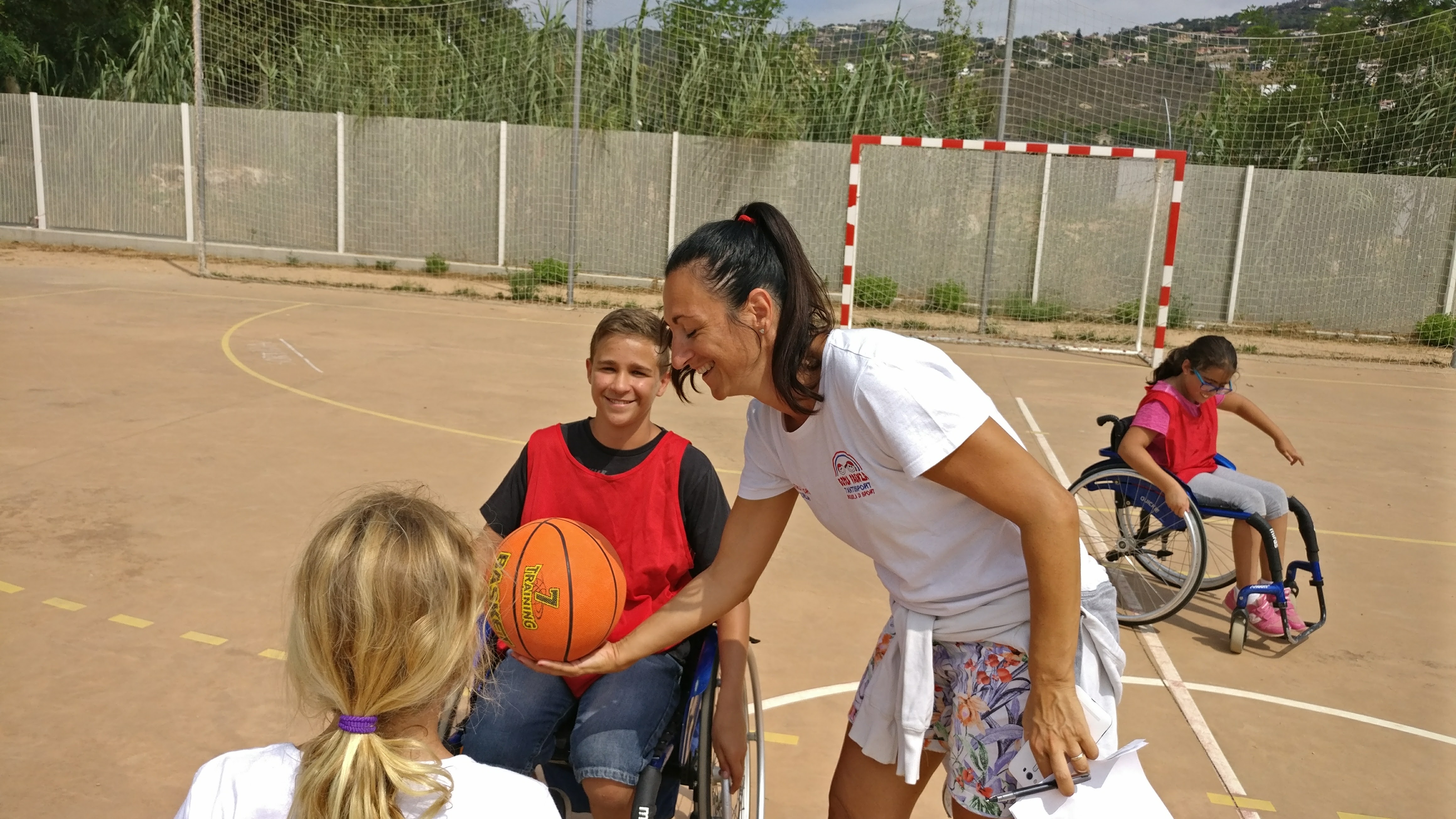 Sport’s ability to get us to face and overcome obstacles, to be inclusive, to struggle against all sorts of barriers and in every social context is quite striking. For example, what a small ball can do in uniting people on an isolated summer field or inside a refugee camp. Players come face to face with one another within an atmosphere of mutual trust and esteem. Javier Lamoneda Prieto, professor of Physical Education, in Jerez de la Frontera, Spain, shared his own experience: “It seems like a team has formed over these days, a team that would like physical activity to become a source of encounter between different actors and sport professionals. It is the first time such a training course has been developed by the public university.” Roberto Niccolis, a sport operative from Verona, Italy: “The limit that I often encounter is that of the distance that separates people from each other; the handicap, I mean. Reducing this distance through sharing, getting to know one another and experiences with one another other make us feel closer.” Roberto Macri, President of the Opera Santa Rita Foundation, Prato, Italy: “Above all, you’ve created an opportunity for reflecting on ourselves and the values that emerge from our work. Not only our professional or volunteer work, but more generally what can give deeper meaning to being men or women.”
Sport’s ability to get us to face and overcome obstacles, to be inclusive, to struggle against all sorts of barriers and in every social context is quite striking. For example, what a small ball can do in uniting people on an isolated summer field or inside a refugee camp. Players come face to face with one another within an atmosphere of mutual trust and esteem. Javier Lamoneda Prieto, professor of Physical Education, in Jerez de la Frontera, Spain, shared his own experience: “It seems like a team has formed over these days, a team that would like physical activity to become a source of encounter between different actors and sport professionals. It is the first time such a training course has been developed by the public university.” Roberto Niccolis, a sport operative from Verona, Italy: “The limit that I often encounter is that of the distance that separates people from each other; the handicap, I mean. Reducing this distance through sharing, getting to know one another and experiences with one another other make us feel closer.” Roberto Macri, President of the Opera Santa Rita Foundation, Prato, Italy: “Above all, you’ve created an opportunity for reflecting on ourselves and the values that emerge from our work. Not only our professional or volunteer work, but more generally what can give deeper meaning to being men or women.”
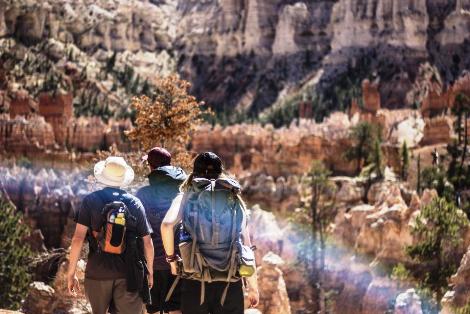
Aug 5, 2017 | Non categorizzato
“ Contemplating the immensity of the universe, the extraordinary beauty and power of nature, my mind rose spontaneously to the Creator of it all, to a new sort of understanding of the immensity of God. It made a new and strong impression on me; I felt like falling on my knees to adore, praise, and glorify God. I felt a great need of this, as if it were my actual vocation. It was as if my eyes had been opened, to understand as never before who it is that we have chosen as our ideal; or rather, who has chosen us. I saw that he is so great, so great, so great, that it seemed impossible that he thinks of us. This impression of God’s immensity stayed in my heart for several days. Now, saying, “Hallowed be thy name,” or “Glory be to the Father and to the Son and to the Holy Spirit,” is different for me: it has become a need of the heart. (Rocca di Papa, 22.1.87) “… Contemplating perhaps an endless stretch of sea, a high mountain range, an impressive glacier or the night sky dotted with stars. What majesty! The immen¬sity of it! And through the dazzling splendour of nature, we would find our way to its author: God, the King of the universe, the Lord of the galaxies, the Infinite. … He is everywhere: beneath the sparkle of a glittering stream, within the blossoming of a flower, in a bright dawn or a red sunset, on a snow-covered peak. Nature is rarely preserved in our concrete cities, built by human hands in the midst of the noise of the world. Yet, if we want, a glimpse of blue sky between the skyscrap¬er peaks is enough to remind us of God; a ray of sunlight, which does not fail to pierce even through the bars of a prison, is enough; a flower is enough, a meadow, a child’s face. … This will help us go back into the midst of humanity, which is where we belong, strengthened, as Jesus certainly was when having prayed all night to the Father on the mountainside under the starry sky, he went back among people to do good. (Mollens, 22.9.88) From Chiara Lubich – “Cercando le cose di lassù” [Seeking the things that are above]– Città Nuova Editrice, Roma 1992, pagg. 5 – 111,112.
Contemplating the immensity of the universe, the extraordinary beauty and power of nature, my mind rose spontaneously to the Creator of it all, to a new sort of understanding of the immensity of God. It made a new and strong impression on me; I felt like falling on my knees to adore, praise, and glorify God. I felt a great need of this, as if it were my actual vocation. It was as if my eyes had been opened, to understand as never before who it is that we have chosen as our ideal; or rather, who has chosen us. I saw that he is so great, so great, so great, that it seemed impossible that he thinks of us. This impression of God’s immensity stayed in my heart for several days. Now, saying, “Hallowed be thy name,” or “Glory be to the Father and to the Son and to the Holy Spirit,” is different for me: it has become a need of the heart. (Rocca di Papa, 22.1.87) “… Contemplating perhaps an endless stretch of sea, a high mountain range, an impressive glacier or the night sky dotted with stars. What majesty! The immen¬sity of it! And through the dazzling splendour of nature, we would find our way to its author: God, the King of the universe, the Lord of the galaxies, the Infinite. … He is everywhere: beneath the sparkle of a glittering stream, within the blossoming of a flower, in a bright dawn or a red sunset, on a snow-covered peak. Nature is rarely preserved in our concrete cities, built by human hands in the midst of the noise of the world. Yet, if we want, a glimpse of blue sky between the skyscrap¬er peaks is enough to remind us of God; a ray of sunlight, which does not fail to pierce even through the bars of a prison, is enough; a flower is enough, a meadow, a child’s face. … This will help us go back into the midst of humanity, which is where we belong, strengthened, as Jesus certainly was when having prayed all night to the Father on the mountainside under the starry sky, he went back among people to do good. (Mollens, 22.9.88) From Chiara Lubich – “Cercando le cose di lassù” [Seeking the things that are above]– Città Nuova Editrice, Roma 1992, pagg. 5 – 111,112.
Aug 4, 2017 | Non categorizzato
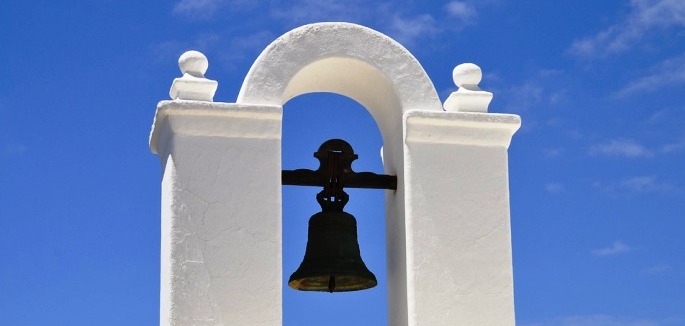
Aug 3, 2017 | Focolare Worldwide
A book for the exam “I study architecture. I had a very important exam to take, but I was missing a fundamental book. Since I was from Spain, it cost four times the normal price. It was the last day to sign up for that exam and I was desperate. I left the university and ran to a nearby church, where I asked Jesus for help, praying for him to get me that book ‘by midday.’ Shortly after, back at the department, I heard someone calling me: it was a colleague I had not seen for some time. Hearing of my problem, he insisted coming with me to a another student’s house – someone I hardly knew. She had that book, and was even happy to lend it to me. It was midday. Some days later, seeing that there were typographic errors and important pages missing, I wrote to the publishing house via email. To thank me, a week later the publisher couriered me a free copy. How could I not see the love of God in all this?” (S. G., Argentina) Stepping in my husband’s shoes “After work my husband often lays down on the sofa to watch a movie. This creates tension and anger inside me, since I expect a bit of help after a day of being busy with the children and everything else that happens. One day, urged on by advice I received from some friends to start loving him first without expecting anything, I tried to put myself in his shoes. I thought about his work committments and his need to find tenderness and understanding at home. Setting aside everything I was doing, I sat down next to him to watch a film, and we shared our ideas about it.” (G. G., Siberia) Mutual help “My neighbor’s husband was hospitalized. His 70-year-old brother was left alone at home, and he doesn’t cook at all. Despite the fact that during that time my own husband and mother had the flu, I offered to look after him. For 15 days, as I took care of my sick family, I also cooked for him, and on Sunday I invited him to lunch at our house. He responded in turn by bringing some foodstuffs that he had. He became one of the family.” (C., Italy) Asking forgiveness “Since I have a tough, authoritarian and independent character, I typically judge people. This way of being made it difficult to relate to others, especially my husband. Some time ago I found myself participating in a meeting that was about going deeper into the words of the Gospel. There my certainties were shaken. I decided to start living those words at work, where I direct personnel in a large warehouse with more than 30 employees. I had a strong aversion to one employee in particular. When it was his turn to get paid, I used to throw the envelope with the money on his desk. This time? I tried to see him differently, as if I had put on new glasses. Making an effort, I approached him and in front of everyone asked him to forgive me. It was one of the greatest joys I had ever experienced.” (D., Brazil)
book for the exam “I study architecture. I had a very important exam to take, but I was missing a fundamental book. Since I was from Spain, it cost four times the normal price. It was the last day to sign up for that exam and I was desperate. I left the university and ran to a nearby church, where I asked Jesus for help, praying for him to get me that book ‘by midday.’ Shortly after, back at the department, I heard someone calling me: it was a colleague I had not seen for some time. Hearing of my problem, he insisted coming with me to a another student’s house – someone I hardly knew. She had that book, and was even happy to lend it to me. It was midday. Some days later, seeing that there were typographic errors and important pages missing, I wrote to the publishing house via email. To thank me, a week later the publisher couriered me a free copy. How could I not see the love of God in all this?” (S. G., Argentina) Stepping in my husband’s shoes “After work my husband often lays down on the sofa to watch a movie. This creates tension and anger inside me, since I expect a bit of help after a day of being busy with the children and everything else that happens. One day, urged on by advice I received from some friends to start loving him first without expecting anything, I tried to put myself in his shoes. I thought about his work committments and his need to find tenderness and understanding at home. Setting aside everything I was doing, I sat down next to him to watch a film, and we shared our ideas about it.” (G. G., Siberia) Mutual help “My neighbor’s husband was hospitalized. His 70-year-old brother was left alone at home, and he doesn’t cook at all. Despite the fact that during that time my own husband and mother had the flu, I offered to look after him. For 15 days, as I took care of my sick family, I also cooked for him, and on Sunday I invited him to lunch at our house. He responded in turn by bringing some foodstuffs that he had. He became one of the family.” (C., Italy) Asking forgiveness “Since I have a tough, authoritarian and independent character, I typically judge people. This way of being made it difficult to relate to others, especially my husband. Some time ago I found myself participating in a meeting that was about going deeper into the words of the Gospel. There my certainties were shaken. I decided to start living those words at work, where I direct personnel in a large warehouse with more than 30 employees. I had a strong aversion to one employee in particular. When it was his turn to get paid, I used to throw the envelope with the money on his desk. This time? I tried to see him differently, as if I had put on new glasses. Making an effort, I approached him and in front of everyone asked him to forgive me. It was one of the greatest joys I had ever experienced.” (D., Brazil)
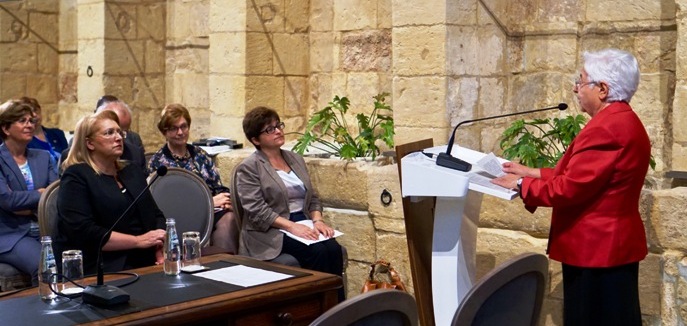
Aug 2, 2017 | Non categorizzato

Photo A. Dimech – © CSC Audiovisivi
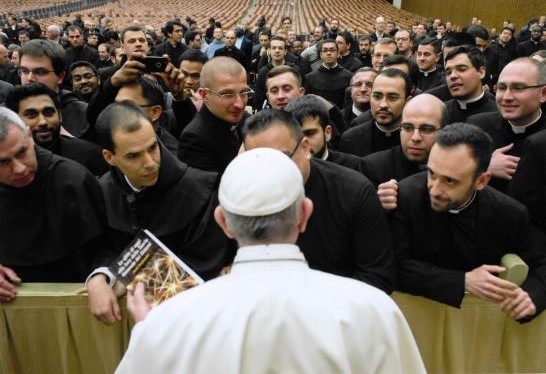
Aug 1, 2017 | Focolare Worldwide
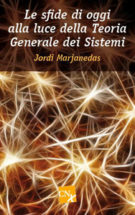 The term “system” is perhaps among the most used in our language. Almost without realising, it always seems to crop up, whether we’re talking about elections, football pools, stars, units of measure, politics, irrigation, the kids’ algebra homework, security, transportation, medicines or mountain chains. Simple or complex, nerves or finances, a “system” (from the Greek systema, to combine) is always on our lips. In 1937, and more “systematically” in 1945, an Austrian biologist named Ludwig von Bertalanffy (b. Vienna, 1901–d. Buffalo, New York, 1972) was the first to announce General Systems Theory, a method for reading into and interpreting the world as it exists. “Every organism is a dynamic order of processes that reciprocally act on each other.” Jordi Marjanedas, from Catalonia, class of 1940, has scrupulously dedicated himself this theory in his recent volume entitled, Today’s Challenges in the Light of General Systems Theory, published by Città Nuova. The text stretches from biology to the life of the universe, from ecology to anthropology, from history to ethics, to social sciences and religion, searching every field of knowledge for elements of integration and cohesion, according to a unified vision of humanity and creation. Why is systems theory so important? The development of modern science brought about a proliferation of knowledge that is partial, fragmented and hyper-specialized. To the point that, ironically, to the writer G. K. Chesterton it seemed that “eventually they end up knowing everything about nothing.” In medicine, for example, a human being is not just liver or limbs, but a harmonious and unified togetherness of spirit – soul and body. In philosophy, there have been numerous theories and closed systems that claimed to explain all reality with a single meaning (totalitarianism is one example). Aristotle himself admitted that “the whole is more than the sum of its parts.”
The term “system” is perhaps among the most used in our language. Almost without realising, it always seems to crop up, whether we’re talking about elections, football pools, stars, units of measure, politics, irrigation, the kids’ algebra homework, security, transportation, medicines or mountain chains. Simple or complex, nerves or finances, a “system” (from the Greek systema, to combine) is always on our lips. In 1937, and more “systematically” in 1945, an Austrian biologist named Ludwig von Bertalanffy (b. Vienna, 1901–d. Buffalo, New York, 1972) was the first to announce General Systems Theory, a method for reading into and interpreting the world as it exists. “Every organism is a dynamic order of processes that reciprocally act on each other.” Jordi Marjanedas, from Catalonia, class of 1940, has scrupulously dedicated himself this theory in his recent volume entitled, Today’s Challenges in the Light of General Systems Theory, published by Città Nuova. The text stretches from biology to the life of the universe, from ecology to anthropology, from history to ethics, to social sciences and religion, searching every field of knowledge for elements of integration and cohesion, according to a unified vision of humanity and creation. Why is systems theory so important? The development of modern science brought about a proliferation of knowledge that is partial, fragmented and hyper-specialized. To the point that, ironically, to the writer G. K. Chesterton it seemed that “eventually they end up knowing everything about nothing.” In medicine, for example, a human being is not just liver or limbs, but a harmonious and unified togetherness of spirit – soul and body. In philosophy, there have been numerous theories and closed systems that claimed to explain all reality with a single meaning (totalitarianism is one example). Aristotle himself admitted that “the whole is more than the sum of its parts.”

A priest presents the Pope with the book
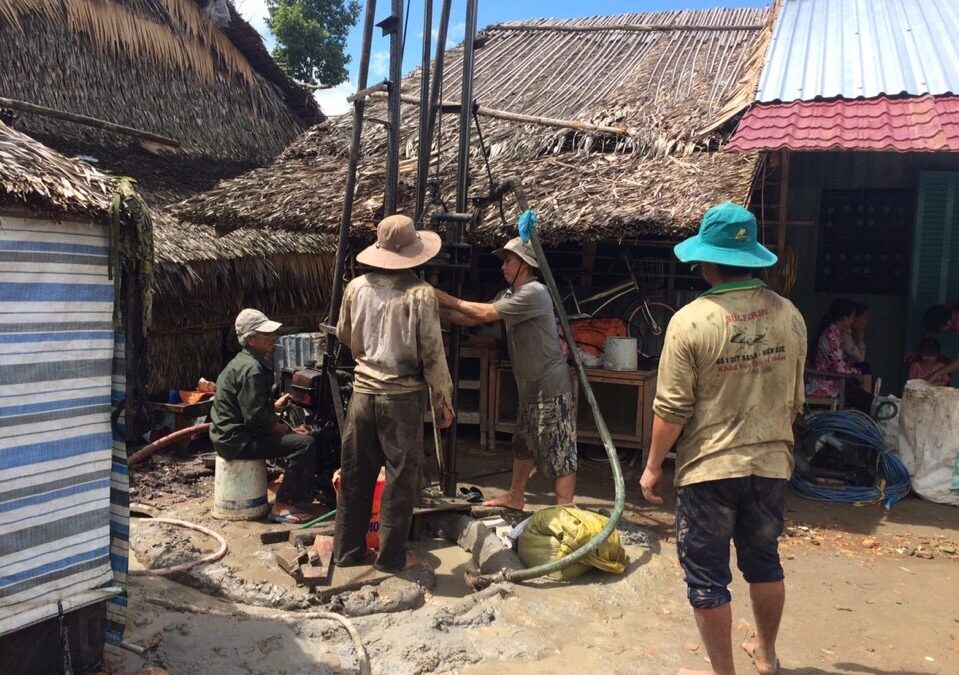
Jul 31, 2017 | Focolare Worldwide
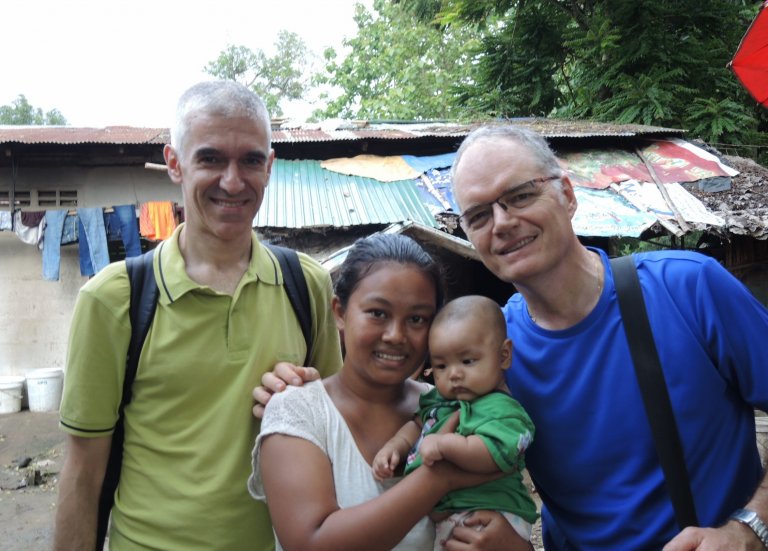 Ever since I began my experience in the focolare in Thailand in 1984 I’ve been in ongoing contact with the poor. In 1985, when we took our first trip to Burma – now Myanmar – I was able to touch the extreme poverty with my own hands; up until then I would never have had the opportunity to see it in person. Then, because the civil war in 1988, refugees began arriving from Thailand, especially in the border regions. Their condition? Illness, lonliness, desperation, exploitation and a great longing for a real life. For us focolarini, they represented a face of Jesus crucified and forsaken who we tried to lift up and love. Over these 32 years our help has surely been insufficient, as one can see from the recent humanitariann distaster that isn’t receiving a lot of reporting. No one is ever prepared for the pain of seeing people die. We’ve taken over a projejct begun by Father Justine, Burmese, who died after a long illness. He provided care for the children of migrants who were being left alone at home all day, and so we gave the last monies we had to be able to provide them hospitality. Now the school is called “Drop By Drop, the Latina Bridge Mae Sot.” It’s a collaborative effort between our children in Mae Sot that are originally Birmian and Karen and her friends from a school in Latina, Italy where several Focolare members work. It’s a bridge of solidarity which connects the two cities that are 10,000 km apart, and it has now involved some hundred poeple from many other places. A multi-national transport company helps us to take the containers of collected goods, paying all the customs and clearance fees (€ 1000) to their destination in Mae Sot on the mountains of Thailand.
Ever since I began my experience in the focolare in Thailand in 1984 I’ve been in ongoing contact with the poor. In 1985, when we took our first trip to Burma – now Myanmar – I was able to touch the extreme poverty with my own hands; up until then I would never have had the opportunity to see it in person. Then, because the civil war in 1988, refugees began arriving from Thailand, especially in the border regions. Their condition? Illness, lonliness, desperation, exploitation and a great longing for a real life. For us focolarini, they represented a face of Jesus crucified and forsaken who we tried to lift up and love. Over these 32 years our help has surely been insufficient, as one can see from the recent humanitariann distaster that isn’t receiving a lot of reporting. No one is ever prepared for the pain of seeing people die. We’ve taken over a projejct begun by Father Justine, Burmese, who died after a long illness. He provided care for the children of migrants who were being left alone at home all day, and so we gave the last monies we had to be able to provide them hospitality. Now the school is called “Drop By Drop, the Latina Bridge Mae Sot.” It’s a collaborative effort between our children in Mae Sot that are originally Birmian and Karen and her friends from a school in Latina, Italy where several Focolare members work. It’s a bridge of solidarity which connects the two cities that are 10,000 km apart, and it has now involved some hundred poeple from many other places. A multi-national transport company helps us to take the containers of collected goods, paying all the customs and clearance fees (€ 1000) to their destination in Mae Sot on the mountains of Thailand. 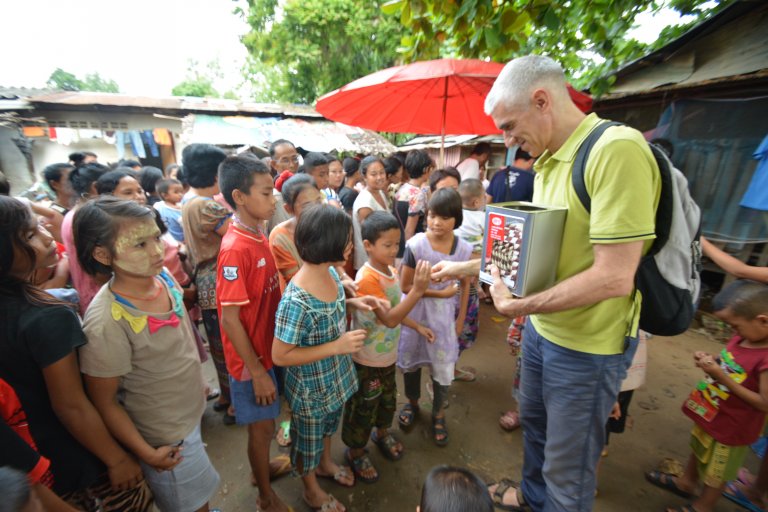 Currently, through Father Joachim from Myanmar, we are helping 200 people who are outside official refugee camps, undocumented and often without food. As Pope Francis puts it, we are experiencing what it means to “touch the flesh of Christ,” one of the many faces of Jesus Forsaken. Besides food, there is great need of love, warmth and affectioin… Chiara Lubich and our spirituality urge us to ‘make ourselves one’ with everyone. One of them said to us: ‘Thank you for everything you get for us,, but especially for making us feel loved. This gives us hope to live.’ There’s an association made up of some friends from Poschiavo in Switzerland, which has been recognized by the government and finances projects that are underway in Thailand, Laos and Vietnam. Six years later it seems like a real miracle!
Currently, through Father Joachim from Myanmar, we are helping 200 people who are outside official refugee camps, undocumented and often without food. As Pope Francis puts it, we are experiencing what it means to “touch the flesh of Christ,” one of the many faces of Jesus Forsaken. Besides food, there is great need of love, warmth and affectioin… Chiara Lubich and our spirituality urge us to ‘make ourselves one’ with everyone. One of them said to us: ‘Thank you for everything you get for us,, but especially for making us feel loved. This gives us hope to live.’ There’s an association made up of some friends from Poschiavo in Switzerland, which has been recognized by the government and finances projects that are underway in Thailand, Laos and Vietnam. Six years later it seems like a real miracle! 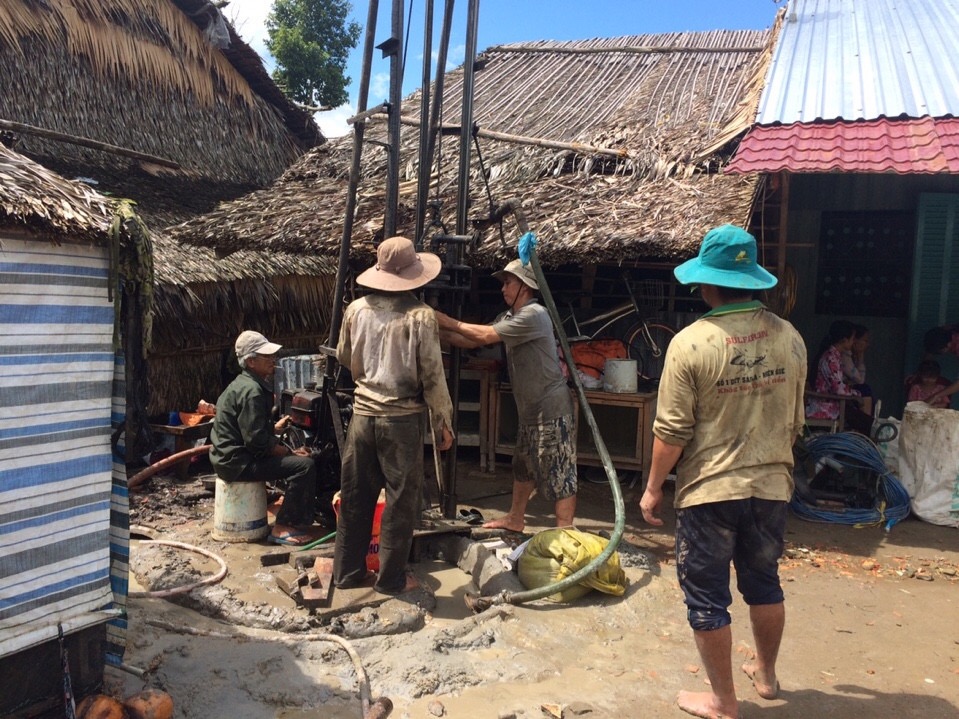 The projects in Vietnam are located in the southern zone, towards the Mekong Delta, in a parish. We build and repair small houses, wells with potable water; and we build bridges that are very useful for communication among the small islands.The so-called monkey bridges, constructed with bamboo stems are substituted with bridges made for humans with iron and cement. Now we’ve begun to work in the mountains too, in central Vietnam, in the zone of Gia Lai, which was known for the battles during the war. The Church is very involved in that zone and the poverty level has really reached levels of high concern in the mountain villages, especially among ethnic populations. In Laos we provide assistance for children through priests who have spent time at the priest school in Taygayta, Philippines. The help is sustained by genuine friendship, much creativity and a willingness to work. Love is like a bridge that joins everyone in a common dream: to live universal brotherhood concretely. Our budget? Free donations from many ordinary and also poor people. We feel that if God wants this project to carry on, he’ll provide for it. Luigi Butori Website: www.gocciadopogoccia.ch Facebook page
The projects in Vietnam are located in the southern zone, towards the Mekong Delta, in a parish. We build and repair small houses, wells with potable water; and we build bridges that are very useful for communication among the small islands.The so-called monkey bridges, constructed with bamboo stems are substituted with bridges made for humans with iron and cement. Now we’ve begun to work in the mountains too, in central Vietnam, in the zone of Gia Lai, which was known for the battles during the war. The Church is very involved in that zone and the poverty level has really reached levels of high concern in the mountain villages, especially among ethnic populations. In Laos we provide assistance for children through priests who have spent time at the priest school in Taygayta, Philippines. The help is sustained by genuine friendship, much creativity and a willingness to work. Love is like a bridge that joins everyone in a common dream: to live universal brotherhood concretely. Our budget? Free donations from many ordinary and also poor people. We feel that if God wants this project to carry on, he’ll provide for it. Luigi Butori Website: www.gocciadopogoccia.ch Facebook page
Jul 29, 2017 | Senza categoria
Jul 28, 2017 | Non categorizzato, Word of
This psalm is a hymn of glory that celebrates the kingly nature of the Lord who governs the whole of history. He is eternal and majestic, yet he expresses himself in justice and goodness, more like the closeness of a father than the power of ruler. God is the focus of this hymn, which reveals his tenderness, superabundant like a mother’s. He is merciful, compassionate, slow to anger, great in love, good to all … The goodness of God was shown to the people of Israel, but it extends over all that his hands have made, over each person and all of creation. At the end of the psalm, the author invites all living beings to make this hymn their own, thus adding a harmonious chorus of voices to his own proclamation: “The Lord is good to all, and his compassion is over all that he has made.” God himself entrusted creation to the hands of men and women, as if it were like an open book in which his goodness is written. We are called to cooperate with the Creator’s work, adding pages that speak of justice and peace, acting according to his plan of love. Unfortunately, however, what we actually see around us are the many wounds inflicted upon people, often the defenseless, and upon the natural environment. This happens because of many people’s indifference, and the selfishness and greed of those who exploit the great wealth of the environment purely for their own ends and at the expense of the common good. In recent years, the Christian community has developed a new awareness and sensitivity in its respect for creation. In this context, we can recall the many appeals of church leaders encouraging us to rediscover nature as the mirror of divine goodness and the heritage of all humankind. In his message for the Day of Prayer for the Protection of the Environment, on September 1 last year, Ecumenical Patriarch Bartholomew of Constantinople said: “We need to have constant vigilance, information and education in order to understand clearly the relationship between today’s ecological crisis and our human passions … which result in and lead to the current crisis that we face. “Therefore, the only way out of this impasse is our return to the original beauty … of frugality and asceticism, which can guide us toward a more careful management of the natural environment. “In fact, the voracious need to satisfy our material needs assuredly causes spiritual poverty, which in turn culminates in the destruction of the environment.” And in his encyclical Laudato Si’, Pope Francis wrote: “Care for nature is part of a lifestyle which includes the capacity for living together and communion. Jesus reminded us that we have God as our common Father and that this makes us brothers and sisters. “Fraternal love can only be gratuitous … This same gratuitousness inspires us to love and accept the wind, the sun and the clouds, even though we cannot control them … We must regain the conviction that we need one another, that we have a shared responsibility for others and the world, and that being good and decent are worth it” (228–9). Let’s take advantage of time we have off work, or all our our chances during the day, to lift our gaze to the depths of the sky, the majesty of the mountaintops and the vastness of the oceans, or even just to see a tiny blade of grass sprouting by the roadside. This will help us to recognize the Creator’s greatness, the one who is “lover of life,” and to find hope again in his infinite goodness, which surrounds all things and accompanies them. Let’s choose a modest style of life for ourselves and for our families, a lifestyle that respects the demands of the environment and is in keeping with the needs of others. Let’s share the goods of the earth and of our work with the poorest of our brothers and sisters. And let’s give witness to the fullness of life and joy by becoming bearers of tenderness, kindness and reconciliation to the world around us. Letizia Magri Each month the Focolare offers a Scripture passage as a guide and inspiration for daily living. Focolare’s founder, Chiara Lubich (1920–2008), wrote these commentaries for many years. Now an international commission continues this tradition, faithful to her spirituality of unity. Letizia Magri, an expert in marriage and family from the John Paul II Institute in Rome, is head of this commission and part of the Focolare’s center for the family. This Word of Life is translated into 96 different languages and reaches several million people worldwide through the media. This monthly leaflet is also a supplement to Living City, the Focolare magazine (livingcitymagazine.com). For information and to subscribe to this leaflet or to the magazine, write to: Living City, 202 Comforter Blvd, Hyde Park, NY 12538; tel: 845-229-0496; e-mail: livingcity@livingcitymagazine.com. Visit focolare.org (international) or focolare.us (U.S.). © 2017 by Living City of the Focolare Movement, Inc. Read more Coda, Piero (2015) “God and Creation: Trinity and Creation out of Nothing,” Claritas: Journal of Dialogue and Culture: Vol. 4 : No. 1 , Article 3. http://docs.lib.purdue.edu/claritas/vol4/iss1/3 Masters, Thomas and Amy Uelman, “Perspectives on money and material goods,” Focolare. New City Press: Hyde Park, New York, 2011, pp. 146-148. Rondinara, Sergio (2014) “The “Book of Nature”: Connecting Science and Wisdom,” Claritas: Journal of Dialogue and Culture: Vol. 3 : No. 1 , Article 5. http://docs.lib.purdue.edu/claritas/vol3/iss1/5

Jul 28, 2017 | Focolare Worldwide
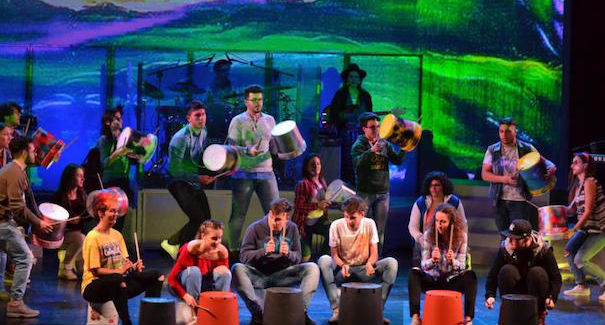 When the international group Gen Verde passed through the city and school where Tiziana teaches, there were positive effects in her relationships with students. In particular, when she heard at the end of the course that one of them had declared themselves an atheist, she decided to write to him. The student’s response was unexpected. “Dear Luca, at this point we are at the end of your school journey. I wanted to write you a note because I didn’t get the chance to chat. So I’m doing so for no particular reason, only because I like having exchanges like this. I would have also liked to ask you about your atheism, as (Italian comic) Checco Zalone would say, but didn’t get the time. I’m convinced that there are no real atheists, only different sorts of believers. The longing for the infinite that consumes our souls is too strong. In my life, I made a fundamental discovery that changed me radically: that God loves me, and each of us, like crazy. Perhaps I would have also been an atheist if I had not gotten to know this God. Love touches all of us, and we madly thirst for it. If you, like me, believe in love, both of us are believers in a way. If your atheism brings you to not believe in a cruel, judging, cold, indifferent prime mover, grand architect, supreme being etc., etc. – then I too am an atheist with you! I can only believe in a God who was flesh and bones, who out of love was born, became man, died and rose. “Bye Luca, I just wanted to say thank you for these past years that we spent together!”
When the international group Gen Verde passed through the city and school where Tiziana teaches, there were positive effects in her relationships with students. In particular, when she heard at the end of the course that one of them had declared themselves an atheist, she decided to write to him. The student’s response was unexpected. “Dear Luca, at this point we are at the end of your school journey. I wanted to write you a note because I didn’t get the chance to chat. So I’m doing so for no particular reason, only because I like having exchanges like this. I would have also liked to ask you about your atheism, as (Italian comic) Checco Zalone would say, but didn’t get the time. I’m convinced that there are no real atheists, only different sorts of believers. The longing for the infinite that consumes our souls is too strong. In my life, I made a fundamental discovery that changed me radically: that God loves me, and each of us, like crazy. Perhaps I would have also been an atheist if I had not gotten to know this God. Love touches all of us, and we madly thirst for it. If you, like me, believe in love, both of us are believers in a way. If your atheism brings you to not believe in a cruel, judging, cold, indifferent prime mover, grand architect, supreme being etc., etc. – then I too am an atheist with you! I can only believe in a God who was flesh and bones, who out of love was born, became man, died and rose. “Bye Luca, I just wanted to say thank you for these past years that we spent together!”  “Dear Prof, it gives me the greatest pleasure to know that even beyond the school environment you still wanted to stay in touch (not that I didn’t already know, but this confirmed it). I too would have liked to discuss with you a number of wider topics, from politics to religion. I have always admired your availability and open mindedness, your ability to dialogue, listen, understand and take in others’ opinions, even if they were completely different from your own. I have always considered your perspective very important. Among other things, you taught me that changing my point of view is fundamental to understanding others, and above all ourselves. This year, together with some schoolmates of mine, I attended PULSE, the May 1 celebration at the little city of Loppiano. During our stay, we were hosted by the Sophia University Institute, where young people from all over the world continue their studies after having graduated. It was there that, for me, I experienced firsthand what equality and fraternity mean. This was thanks to the way we were generously welcomed by the institute’s students and teachers, who treated us as if we had known each other for a lifetime. What struck me most happened during the evening of the second day, when we ate together with our hosts. They had prepared the meal with passion, just for us, using everything they had in the kitchen. In that moment, despite being more than 1,000km from my city, I felt at home. I found myself at table talking about this and that with two from Lebanon and others from Germany, Cuba, Argentina, Colombia, and Bologna, sharing a plate of meat, spinach, potatoes and onions. After that we stayed up late talking about our experiences, plans, playing guitar, singing songs and sourcing a bit of wine from the German black forest. In that moment PULSE, at least for me, had achieved its goal. Thanks Prof, till next time!”
“Dear Prof, it gives me the greatest pleasure to know that even beyond the school environment you still wanted to stay in touch (not that I didn’t already know, but this confirmed it). I too would have liked to discuss with you a number of wider topics, from politics to religion. I have always admired your availability and open mindedness, your ability to dialogue, listen, understand and take in others’ opinions, even if they were completely different from your own. I have always considered your perspective very important. Among other things, you taught me that changing my point of view is fundamental to understanding others, and above all ourselves. This year, together with some schoolmates of mine, I attended PULSE, the May 1 celebration at the little city of Loppiano. During our stay, we were hosted by the Sophia University Institute, where young people from all over the world continue their studies after having graduated. It was there that, for me, I experienced firsthand what equality and fraternity mean. This was thanks to the way we were generously welcomed by the institute’s students and teachers, who treated us as if we had known each other for a lifetime. What struck me most happened during the evening of the second day, when we ate together with our hosts. They had prepared the meal with passion, just for us, using everything they had in the kitchen. In that moment, despite being more than 1,000km from my city, I felt at home. I found myself at table talking about this and that with two from Lebanon and others from Germany, Cuba, Argentina, Colombia, and Bologna, sharing a plate of meat, spinach, potatoes and onions. After that we stayed up late talking about our experiences, plans, playing guitar, singing songs and sourcing a bit of wine from the German black forest. In that moment PULSE, at least for me, had achieved its goal. Thanks Prof, till next time!”
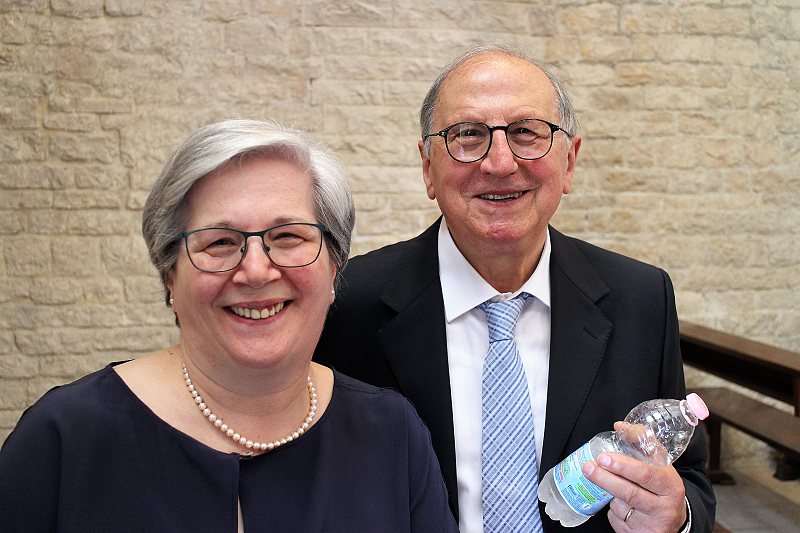
Jul 27, 2017 | Non categorizzato
 It began in April 2013. My wife Lucia and I were taking a walk when we noticed a five-cent coin on the ground. We were a bit embarrassed to pick it up. Then, walking along another stretch of the street, a man was tactfully asking those passing by for help. He held a five-cent piece in his hand, as if to say that he would be happy with even that. We’re not sure how best to say this, but let’s just say we felt ourselves blush. Some days later, thinking about what had happened, we felt an inspiring spark emerge – to start a project in our small circle. We decided to call it “Operation 1-2-5 in Freedom.” The idea is to freely consider the one-, two- or five-cent coins we get during our daily shopping as change, then invest it as a gesture of fraternity to alleviate situations of poverty locally and in poor countries abroad. The operation had come from an undeniable need to love. We received proof of this when we timidly brought the first 150 one-cent coins, 36 two-cent coins and 64 five-cent coins to the owner of a supermarket. Curious, he asked where they came from, and we explained it to him, asking whether he too would like to do something as well to meet the needs of the poor. From that day on, Antonio began to give something on top of whatever coins we brought him. Encouraged by his gesture, and beyond our families and at our condominium, we started to speak about it to even more friends of ours. The project went on to involve a number of families in Andria and then went beyond our borders: Lecce, Bari, Brindisi, Santa Maria a Vico, Naples, Rome, Spinazzola, Trani, Corato, Barletta Bolzano, Varese and Trent! This tangible good of collecting coins also brought something beautiful with it. Handing over the coins inspired many to wrap them: coins were collected in a tiny bag of white tulle, elegant envelopes and with flowers. We’ve even heard that this started happening in schools and between colleagues at work. Close to four years after the start of the operation, the collected coins now total $5,225 euros, all of which have been donated. Humanly speaking, a few cents might seem insignificant. But we feel that there’s something sacred about them, because they stimulate us to love others. They also recall a number of Gospel passages: the widow’s offering, the five loaves and two fishes, the few crumbs that the Canaanite woman begged Jesus for. It seems to us that little by little these ones, twos and fives, beyond any final figure, might contribute to increasing communion between people, placing talents and abilities in communion. Speaking of communion, it deeply touched us how, at the beginning of the project we uncovered, in an old notebook from 1991, something from our focolarino friend and sociologist Professor Tommaso Sorgi. Speaking about the Economy of Communion, he put it in these words: “The concept of communion is something deeper than the concept of solidarity. Communion brings it to life, illuminates it, puts it in motion and makes it possible. If this communion of souls is not a part of it, communion in the economy will never happen.” To sum up, we feel a special joy. Today Operation 1-2-5 in Freedom – which the Centro Igino Giordani in Andria has adopted – is more than ever motivated by love. That love that is like a tiny ray of light passing through a prism that refracts in the colors of the rainbow. In the same way, Operation 1-2-5 does this with the colors of fraternity and communion. Gennaro and Lucia Piccolo Centro Igino Giordani
It began in April 2013. My wife Lucia and I were taking a walk when we noticed a five-cent coin on the ground. We were a bit embarrassed to pick it up. Then, walking along another stretch of the street, a man was tactfully asking those passing by for help. He held a five-cent piece in his hand, as if to say that he would be happy with even that. We’re not sure how best to say this, but let’s just say we felt ourselves blush. Some days later, thinking about what had happened, we felt an inspiring spark emerge – to start a project in our small circle. We decided to call it “Operation 1-2-5 in Freedom.” The idea is to freely consider the one-, two- or five-cent coins we get during our daily shopping as change, then invest it as a gesture of fraternity to alleviate situations of poverty locally and in poor countries abroad. The operation had come from an undeniable need to love. We received proof of this when we timidly brought the first 150 one-cent coins, 36 two-cent coins and 64 five-cent coins to the owner of a supermarket. Curious, he asked where they came from, and we explained it to him, asking whether he too would like to do something as well to meet the needs of the poor. From that day on, Antonio began to give something on top of whatever coins we brought him. Encouraged by his gesture, and beyond our families and at our condominium, we started to speak about it to even more friends of ours. The project went on to involve a number of families in Andria and then went beyond our borders: Lecce, Bari, Brindisi, Santa Maria a Vico, Naples, Rome, Spinazzola, Trani, Corato, Barletta Bolzano, Varese and Trent! This tangible good of collecting coins also brought something beautiful with it. Handing over the coins inspired many to wrap them: coins were collected in a tiny bag of white tulle, elegant envelopes and with flowers. We’ve even heard that this started happening in schools and between colleagues at work. Close to four years after the start of the operation, the collected coins now total $5,225 euros, all of which have been donated. Humanly speaking, a few cents might seem insignificant. But we feel that there’s something sacred about them, because they stimulate us to love others. They also recall a number of Gospel passages: the widow’s offering, the five loaves and two fishes, the few crumbs that the Canaanite woman begged Jesus for. It seems to us that little by little these ones, twos and fives, beyond any final figure, might contribute to increasing communion between people, placing talents and abilities in communion. Speaking of communion, it deeply touched us how, at the beginning of the project we uncovered, in an old notebook from 1991, something from our focolarino friend and sociologist Professor Tommaso Sorgi. Speaking about the Economy of Communion, he put it in these words: “The concept of communion is something deeper than the concept of solidarity. Communion brings it to life, illuminates it, puts it in motion and makes it possible. If this communion of souls is not a part of it, communion in the economy will never happen.” To sum up, we feel a special joy. Today Operation 1-2-5 in Freedom – which the Centro Igino Giordani in Andria has adopted – is more than ever motivated by love. That love that is like a tiny ray of light passing through a prism that refracts in the colors of the rainbow. In the same way, Operation 1-2-5 does this with the colors of fraternity and communion. Gennaro and Lucia Piccolo Centro Igino Giordani

Jul 26, 2017 | Non categorizzato
 At preschool Sonia is 5 years old. One day she says to her mother, “I don’t want to go to school anymore; no one there is my friend.” After a day or two her attitude changes and she goes to preschool voluntarily. “What changed?” her mother asks. “I saw that there was a girl who was always quiet and by herself. No one wanted to play with her, so I went to her and told her I loved her. She smiled and then started playing with me. You know, Mum, love really warms the heart.” (Sonia – Slovakia) My poorest friend “As I left Rome, I left Nicu, the poorest of my friends, who is forced to beg as he waits to get a liver transplant. We stay in touch by phone. Often I’d wonder how I could continue helping him, seeing that I could only come up with a small monthly “income” of 20 Euros. Remembering the story of Zacchaeus, who gave half of his goods to the poor, I started each day to set aside 10 Euros for Nico. After I had collected 70, I sent the money to him via a friend. I heard that he was quite happy – more about the fact that I had remembered him than the amount he received. (Angiolino – Italy) A generosity competition The economy has not been doing well for some time. In a meeting at our condominium, after two hours of complaints, I proposed that we start a “communion of goods” in our building. One lady who lived alone offered her apartment to collect the food and clothing. We contribute whatever we feel is superfluous or even give away some things we need. A true competition of generosity began and an atmosphere of optimism came into our homes. (L.D. C. – Argentina) Work and home My wife and I met a family of immigrants. The husband lost his job, then found another, but it was not a secure position. They needed to be helped with food and money. Three months ago, I had the opportunity to find him better work. After a while this family called me back; their sister’s house had been flooded after torrential rain. I went over to give some immediate aid and see what they needed. The owners of the house had made them pay two months’ rent in advance and a month deposit. On my own I could not help them, but with the Focolare community we were able to collect the money they needed in just three days. (Juan Ignacio – Spain)
At preschool Sonia is 5 years old. One day she says to her mother, “I don’t want to go to school anymore; no one there is my friend.” After a day or two her attitude changes and she goes to preschool voluntarily. “What changed?” her mother asks. “I saw that there was a girl who was always quiet and by herself. No one wanted to play with her, so I went to her and told her I loved her. She smiled and then started playing with me. You know, Mum, love really warms the heart.” (Sonia – Slovakia) My poorest friend “As I left Rome, I left Nicu, the poorest of my friends, who is forced to beg as he waits to get a liver transplant. We stay in touch by phone. Often I’d wonder how I could continue helping him, seeing that I could only come up with a small monthly “income” of 20 Euros. Remembering the story of Zacchaeus, who gave half of his goods to the poor, I started each day to set aside 10 Euros for Nico. After I had collected 70, I sent the money to him via a friend. I heard that he was quite happy – more about the fact that I had remembered him than the amount he received. (Angiolino – Italy) A generosity competition The economy has not been doing well for some time. In a meeting at our condominium, after two hours of complaints, I proposed that we start a “communion of goods” in our building. One lady who lived alone offered her apartment to collect the food and clothing. We contribute whatever we feel is superfluous or even give away some things we need. A true competition of generosity began and an atmosphere of optimism came into our homes. (L.D. C. – Argentina) Work and home My wife and I met a family of immigrants. The husband lost his job, then found another, but it was not a secure position. They needed to be helped with food and money. Three months ago, I had the opportunity to find him better work. After a while this family called me back; their sister’s house had been flooded after torrential rain. I went over to give some immediate aid and see what they needed. The owners of the house had made them pay two months’ rent in advance and a month deposit. On my own I could not help them, but with the Focolare community we were able to collect the money they needed in just three days. (Juan Ignacio – Spain)

 The Park of the Nations in Córdoba, Argentina, is always filled with children and teenagers on the “Día del Niño” (Day of the Child), which is celebrated on the third Sunday of August. The Park is the perfect place to hold games, tournaments and take walks. This year a festive crowd drew the attention of the passers-by, with the unveiling of a particularly meaningful monument: the Cube of Peace. There were games, obstacle courses, music and food just before the official unveiling in the presence of representatives from the Interreligious Commitee For Peace (COMIPAZ), members of the Armenian Church, the Jewish, Muslim and Evangelical communities. Fernanda Otero, Francisco Drab and Amelia Milagros López Loforte represented the Focolare community. The unveiling concluded with some words from Auxiliary Bishop Ricardo Seirutti who blessed the monument. It was to refrain from spinning the Cube. Each side displayed a sentence which, in spite of the rather playful and carefree atmosphere, were expected to be put into practice with seriousness and effort – and perhaps a bit of fatigue. The Cube proposes six actions that can be lived every day, each of them an expression of the Golden Rule,a version of which can be found in all religions: “Do to others what you would have them do to you:” Love everyone. Be the first to love. Love your enemy. Forgive. These are concrete gestures for a life that is counter current and courageous for the building of a more empathetic and supportive society. The unveiling was not an isolated event, but the result of many months of interaction and field work, duing which the Focolare youth took the Cube to several quarters in the city, as an educational tool for teaching peace through play and theatre. In neighbourhoods on the peripheries of Ciudad Evita, San Roque, Cabildo, Müller, Argüello where people live amidst violence, with their civil rights often violated and with the children of the Sierra Dorada Foundation in San Marcos Sierras, they worked side by side with local communities and organisations who are desirous of becoming more aware of local problems and taking direct action in favour of more incisive and effective social training. The project, sustained by the Focolare Movement, the organization for the defense of the rights of children and teenagers from the Province of Córdoba, the Living Peace Programme and the Interreligious Comittee for Peace, along with other organizations and public and private entities, aims to spread peace in all parts of society, beginning with a set of best practices for working with children, but valid for adults and in all environments. Similar activities are spreading in many other countries: Italy, Spain, Egypt, Hungary and Brazil where the now famous Cube has become the protagonist of a vast variety of educational projects and seminars. In Argentina, another Cube of Peace has been placed in a public area in Concepción, in the Province of Tucumán. Still in Córdoba, three days ealier, the Cube project was declared a cultural interest by the City Council. A small monument that continually comes to life.
The Park of the Nations in Córdoba, Argentina, is always filled with children and teenagers on the “Día del Niño” (Day of the Child), which is celebrated on the third Sunday of August. The Park is the perfect place to hold games, tournaments and take walks. This year a festive crowd drew the attention of the passers-by, with the unveiling of a particularly meaningful monument: the Cube of Peace. There were games, obstacle courses, music and food just before the official unveiling in the presence of representatives from the Interreligious Commitee For Peace (COMIPAZ), members of the Armenian Church, the Jewish, Muslim and Evangelical communities. Fernanda Otero, Francisco Drab and Amelia Milagros López Loforte represented the Focolare community. The unveiling concluded with some words from Auxiliary Bishop Ricardo Seirutti who blessed the monument. It was to refrain from spinning the Cube. Each side displayed a sentence which, in spite of the rather playful and carefree atmosphere, were expected to be put into practice with seriousness and effort – and perhaps a bit of fatigue. The Cube proposes six actions that can be lived every day, each of them an expression of the Golden Rule,a version of which can be found in all religions: “Do to others what you would have them do to you:” Love everyone. Be the first to love. Love your enemy. Forgive. These are concrete gestures for a life that is counter current and courageous for the building of a more empathetic and supportive society. The unveiling was not an isolated event, but the result of many months of interaction and field work, duing which the Focolare youth took the Cube to several quarters in the city, as an educational tool for teaching peace through play and theatre. In neighbourhoods on the peripheries of Ciudad Evita, San Roque, Cabildo, Müller, Argüello where people live amidst violence, with their civil rights often violated and with the children of the Sierra Dorada Foundation in San Marcos Sierras, they worked side by side with local communities and organisations who are desirous of becoming more aware of local problems and taking direct action in favour of more incisive and effective social training. The project, sustained by the Focolare Movement, the organization for the defense of the rights of children and teenagers from the Province of Córdoba, the Living Peace Programme and the Interreligious Comittee for Peace, along with other organizations and public and private entities, aims to spread peace in all parts of society, beginning with a set of best practices for working with children, but valid for adults and in all environments. Similar activities are spreading in many other countries: Italy, Spain, Egypt, Hungary and Brazil where the now famous Cube has become the protagonist of a vast variety of educational projects and seminars. In Argentina, another Cube of Peace has been placed in a public area in Concepción, in the Province of Tucumán. Still in Córdoba, three days ealier, the Cube project was declared a cultural interest by the City Council. A small monument that continually comes to life.

 A summer school in the Primiero Valleys (Italy) is not a novelty. Some had taken place in the past years, thanks to the initiative of the
A summer school in the Primiero Valleys (Italy) is not a novelty. Some had taken place in the past years, thanks to the initiative of the  Besides a profound experience with the Benedictine community of the monastery of Ampleforth, the Shomalis had deepened their knowledge of the spirituality of communion and had also met other Christians and Muslims, on the occasion of international meetings held in Rome and in
Besides a profound experience with the Benedictine community of the monastery of Ampleforth, the Shomalis had deepened their knowledge of the spirituality of communion and had also met other Christians and Muslims, on the occasion of international meetings held in Rome and in  It was in this context that a bond with the Sophia University Institute was established, especially between the Rector, Mons. Piero Coda, and Professor Shomali. With subsequent encounters and lessons offered by the professor to the students of the Institute and the inhabitants of Loppiano, and in collaboration with Rita Moussalem and Roberto Catalano, Co-Directors of the Focolare’s Centre for Interreligious Dialogue, Coda and Shomali had developed the idea of creating a common academic research project with concrete works, which was named Wings of Unity. The core of this initiative is based on the quest for unity of God and unity in God and aims to focus on the perception of God in the two traditions, and in this light, on the possibility of building a true spirit of brotherhood. The finality is to create occasions for reflection in communion between Shiite Muslims and Christians and favouring the education of young generations in interreligious dialogue. As Prof. Shomali himself summarised, in these years they have gone beyond dialogue, and have attained the same way of thinking.
It was in this context that a bond with the Sophia University Institute was established, especially between the Rector, Mons. Piero Coda, and Professor Shomali. With subsequent encounters and lessons offered by the professor to the students of the Institute and the inhabitants of Loppiano, and in collaboration with Rita Moussalem and Roberto Catalano, Co-Directors of the Focolare’s Centre for Interreligious Dialogue, Coda and Shomali had developed the idea of creating a common academic research project with concrete works, which was named Wings of Unity. The core of this initiative is based on the quest for unity of God and unity in God and aims to focus on the perception of God in the two traditions, and in this light, on the possibility of building a true spirit of brotherhood. The finality is to create occasions for reflection in communion between Shiite Muslims and Christians and favouring the education of young generations in interreligious dialogue. As Prof. Shomali himself summarised, in these years they have gone beyond dialogue, and have attained the same way of thinking.

 The
The 

 As Harvey’s fury fades and tears are shed for victims whose numbers are growing by the hour, the devastation left behind by the hurricane and the growing concern over contaminated water, especially in Houston, is becoming clearer and clearer within the city which is home to hundreds of large and important chemical and oil plants There is already a mixture of pesticides, waste and solvents that can do further damage to humans and the environment even after Harvey. Last September 1st there was a choral outcry for more attention and care for Creation just as Texas was emerging from the receding flood waters. It is not only the uncontrollable forces of nature that give us pause, but also our responsibility in using the goods of the earth. With regard to the risk of contamination: it has been estimated that the millions of people from Texas’s 38 counties that have been affected by Hurricane Harvey use private water sources that are not subjected to the same controls as public water systems and are at risk of contamination. “
As Harvey’s fury fades and tears are shed for victims whose numbers are growing by the hour, the devastation left behind by the hurricane and the growing concern over contaminated water, especially in Houston, is becoming clearer and clearer within the city which is home to hundreds of large and important chemical and oil plants There is already a mixture of pesticides, waste and solvents that can do further damage to humans and the environment even after Harvey. Last September 1st there was a choral outcry for more attention and care for Creation just as Texas was emerging from the receding flood waters. It is not only the uncontrollable forces of nature that give us pause, but also our responsibility in using the goods of the earth. With regard to the risk of contamination: it has been estimated that the millions of people from Texas’s 38 counties that have been affected by Hurricane Harvey use private water sources that are not subjected to the same controls as public water systems and are at risk of contamination. “ It is time to think about the tremendous power of nature and of human responsibility to be good and wise administrators of the environment,” writes Ecumenical Patriarch Bartholomew, known for his involvement in promoting care for the environment. “We are all called to to take part in the redemption and care of our world, working to stem the destructive force of such hurricanes through better environmental planning, or by being more seriously involved in combatting the serious problem of climate change and the way in which it interferes with our planet; or even to beomc personally involved on the field, with charitable projects that can help and support those whose lives are so drastically changed in the bat of an eye because of changes in the climate. In their joint statement on the Day of Prayer for Creation, Pope Francis and Patriarch Bartholomew stated: We urgently appeal to those in positions of social and economic, as well as political and cultural, responsibility to hear the cry of the earth and to attend to the needs of the marginalized, but above all to respond to the plea of millions and support the consensus of the world for the healing of our wounded creation. We are convinced that there can be no sincere and enduring resolution to the challenge of the ecological crisis and climate change unless the response is concerted and collective, unless the responsibility is shared and accountable, unless we give priority to solidarity and service.
It is time to think about the tremendous power of nature and of human responsibility to be good and wise administrators of the environment,” writes Ecumenical Patriarch Bartholomew, known for his involvement in promoting care for the environment. “We are all called to to take part in the redemption and care of our world, working to stem the destructive force of such hurricanes through better environmental planning, or by being more seriously involved in combatting the serious problem of climate change and the way in which it interferes with our planet; or even to beomc personally involved on the field, with charitable projects that can help and support those whose lives are so drastically changed in the bat of an eye because of changes in the climate. In their joint statement on the Day of Prayer for Creation, Pope Francis and Patriarch Bartholomew stated: We urgently appeal to those in positions of social and economic, as well as political and cultural, responsibility to hear the cry of the earth and to attend to the needs of the marginalized, but above all to respond to the plea of millions and support the consensus of the world for the healing of our wounded creation. We are convinced that there can be no sincere and enduring resolution to the challenge of the ecological crisis and climate change unless the response is concerted and collective, unless the responsibility is shared and accountable, unless we give priority to solidarity and service. 






 Óbidos, on the left bank of the Amazon River, about 682 miles from the capital, Belem, is a city of almost 50,000 inhabitants. There is only one hospital, which is run by the Third Order of St. Francis and absolutely insufficient to assist the most serious cases. After an appeal of the Brazilian Conference of Bishops, for some years now a big group of doctors, nurses and common people, have undertaken journeys to bring healthcare and support to the population, especially in the river communities. The
Óbidos, on the left bank of the Amazon River, about 682 miles from the capital, Belem, is a city of almost 50,000 inhabitants. There is only one hospital, which is run by the Third Order of St. Francis and absolutely insufficient to assist the most serious cases. After an appeal of the Brazilian Conference of Bishops, for some years now a big group of doctors, nurses and common people, have undertaken journeys to bring healthcare and support to the population, especially in the river communities. The 




 They were from a variety of countries: the Democratic Republic of the Congo, Angola, Uganda, Nigeria, Ivory Coast, Cameroon, Burkina-Faso, Madagascar, Benin and Holland. The fifty five entrepreneurs wanted to put their 30 innovative entrepreneurial projects to the test, with an international force of “mentors” (seven African, five European and one South American). The first African StartUp Lab 2017 was held last June, in the heart of the African forest in Fontem, Cameroon. It consisted of five days of learning how to practice the values of the
They were from a variety of countries: the Democratic Republic of the Congo, Angola, Uganda, Nigeria, Ivory Coast, Cameroon, Burkina-Faso, Madagascar, Benin and Holland. The fifty five entrepreneurs wanted to put their 30 innovative entrepreneurial projects to the test, with an international force of “mentors” (seven African, five European and one South American). The first African StartUp Lab 2017 was held last June, in the heart of the African forest in Fontem, Cameroon. It consisted of five days of learning how to practice the values of the  The workshop began with Anouk Grevin, French member of the faculty of the Polytech University of Nantes, and of the Economy and Management course at Sophia University Institute, who presented the fundamental values of the Economy of Communion. Argentinean, Forencia Locascio, expert in social communication, explained the “elevator pitch” that helps to present one’s own entrepreneurial approach to any possible client or investor, in a clear and succinct manner, and in a shor time. French entrepreneur, Pierre Chevalier, presented a workshop on innovative ideas and project analysis, as well as the resources required. The image of an iceberg is perhaps the best way to explain all the effort, work and sacrifice that lies hidden beneath the surface of any successful entrepreneurial project.
The workshop began with Anouk Grevin, French member of the faculty of the Polytech University of Nantes, and of the Economy and Management course at Sophia University Institute, who presented the fundamental values of the Economy of Communion. Argentinean, Forencia Locascio, expert in social communication, explained the “elevator pitch” that helps to present one’s own entrepreneurial approach to any possible client or investor, in a clear and succinct manner, and in a shor time. French entrepreneur, Pierre Chevalier, presented a workshop on innovative ideas and project analysis, as well as the resources required. The image of an iceberg is perhaps the best way to explain all the effort, work and sacrifice that lies hidden beneath the surface of any successful entrepreneurial project. 
 After describing the points of the Art of Loving, with the expressions that
After describing the points of the Art of Loving, with the expressions that 


 Many people have continued to work after the earthquake in central Italy last year, standing by those who were affected by those who were so awfully affected by that tragedy. It was such a vast catastrophe that it tested not only the physical infrastructure, but also the very social fabric and personal resistance of an entire generation of families. The Focolare Movement has a stable organism that works in collaboration with two associations: United World Project and New Families Association, but also other groups (AIPEC, B&F Foundation, Planetary Embrace, Dialogue in Architecture and local Focolare communities in Italy). They provide expertise in channelling the aid more effectively. “Our first objective was to come up with a way of linking and knowing the different projects so that we could keep awareness high and not forget…” says Cesare Borin from the Focolare’s Emergency Aid project. The financial aid that began to arrive immediately is only one part of many other forms of aid that have solidified the assistance, which involves many people from the Movement in being close to the people who have lost everything in this dramatic event.” The project is comprised of two complimentary efforts:
Many people have continued to work after the earthquake in central Italy last year, standing by those who were affected by those who were so awfully affected by that tragedy. It was such a vast catastrophe that it tested not only the physical infrastructure, but also the very social fabric and personal resistance of an entire generation of families. The Focolare Movement has a stable organism that works in collaboration with two associations: United World Project and New Families Association, but also other groups (AIPEC, B&F Foundation, Planetary Embrace, Dialogue in Architecture and local Focolare communities in Italy). They provide expertise in channelling the aid more effectively. “Our first objective was to come up with a way of linking and knowing the different projects so that we could keep awareness high and not forget…” says Cesare Borin from the Focolare’s Emergency Aid project. The financial aid that began to arrive immediately is only one part of many other forms of aid that have solidified the assistance, which involves many people from the Movement in being close to the people who have lost everything in this dramatic event.” The project is comprised of two complimentary efforts:  “RImPRESA Businesses” which consists in providing raw materials, machinery and small infrastructure to businesses and, where possible, to strengthen virtuous and ethical business processes and practices that allow for pairing with other businesses on a national level. This effort has focused on 60 small businesses in the four regions that were hit, and they are recently finishing the furnishing of 25 agricultural and handicraft businesses with equipment. The second activity: “RImPRESA GAS” promotes the purchase of products from businesses affected by the earthquake, through the creation of the Gruppi di Acquisto Solidale (GAS) that supports local tourism. Currently, there are 13 agribusinesses with a total of 90 enrolments with a total of 17,000 euros in orders. The response to the people in need was quick, like that for several families from Amatrice that had asked for a sheet metal container. In March they received 10 containers for themselves and many other families of Amatrice and the surrounding areas, at a total cost of 19,000 euros. A summer camp is being set up for the end of August in collaboration with the Italian Caritas, which will be based at Torrita di Amatrice. Activities will continue during the months of July and August with plans for a summer children’s community centre, recreational activities for teenagers from the area, and for the elderly in rehabilitation centres in Borbona. Borin concludes: “The people from these beautiful regions never ask us to rebuild their homes, but they do strongly ask that we don’t leave them all alone! Amongst the lessons learned has been the importance of never marginalising or suffocating the contribution from civil society. Alongside the competent intervention of these state agencies, we need a more vast and programmatic inclusion of social agencies and groups precisely because of their ability to make the work of institutions more efficacious also in restarting the process of production.” Contacts: emergenzaterremoto.italia@focolare.org
“RImPRESA Businesses” which consists in providing raw materials, machinery and small infrastructure to businesses and, where possible, to strengthen virtuous and ethical business processes and practices that allow for pairing with other businesses on a national level. This effort has focused on 60 small businesses in the four regions that were hit, and they are recently finishing the furnishing of 25 agricultural and handicraft businesses with equipment. The second activity: “RImPRESA GAS” promotes the purchase of products from businesses affected by the earthquake, through the creation of the Gruppi di Acquisto Solidale (GAS) that supports local tourism. Currently, there are 13 agribusinesses with a total of 90 enrolments with a total of 17,000 euros in orders. The response to the people in need was quick, like that for several families from Amatrice that had asked for a sheet metal container. In March they received 10 containers for themselves and many other families of Amatrice and the surrounding areas, at a total cost of 19,000 euros. A summer camp is being set up for the end of August in collaboration with the Italian Caritas, which will be based at Torrita di Amatrice. Activities will continue during the months of July and August with plans for a summer children’s community centre, recreational activities for teenagers from the area, and for the elderly in rehabilitation centres in Borbona. Borin concludes: “The people from these beautiful regions never ask us to rebuild their homes, but they do strongly ask that we don’t leave them all alone! Amongst the lessons learned has been the importance of never marginalising or suffocating the contribution from civil society. Alongside the competent intervention of these state agencies, we need a more vast and programmatic inclusion of social agencies and groups precisely because of their ability to make the work of institutions more efficacious also in restarting the process of production.” Contacts: emergenzaterremoto.italia@focolare.org
 “Re”-turn, “Re”-cognize, “Re”-view, “Re”-embrace, “Re”-member. Going back to Ostiense, I have butterflies in my stomach. I look for my friends in desperation. These past months I left Rome behind with its great beauty (the kind around the train stations, that is). To console me, some have used reassuring expressions like “never mind, you’ll find the poor, the least among us, the homeless, wherever you go.”But I don’t love the poor or the least. I love Samir, Fulvio, Gian Paolo, Gabriele, Jazmin… Ladies and gentlemen, this is called friendship. Claudio treats me with the tenderness of a whisper, although he has a past that is more rough, harsh and violent than anyone. When I was an ocean away, I realized that friendship had changed him, but above all it had changed me. I talk, I listen, I sit down, and I feel truly at home. This sense of “re”-entry and “re”-turn is a bit of a taste of what they call heaven… “re”-acquired after it had been lost. I “re”-listen to their stories and absurdities. Inside myself these past months, I found some pressing questions about the sense of life paths, the paradox of decisions, disrupted plans, and trepidation about my own mission. I tend to get lost in these pretentions, but I see that my friends do not have a path, mission, choices nor even know how to tell their stories. I had become lost in all these middle-class demands, but here and now, I stop getting lost. These are my friends, and it wouldn’t be right to have something for myself that they cannot have. Ladies and gentlemen, this is friendship. As I come out of myself, out of my will, my demands, I continually ask – for them, for me – for the thread… the thread that connects everything under heaven, our stories and all the stories, in a single plan. I ask for it humbly. I “re”-embrace myself, greet myself with wet eyes and say, “Hi Paula, welcome back!”
“Re”-turn, “Re”-cognize, “Re”-view, “Re”-embrace, “Re”-member. Going back to Ostiense, I have butterflies in my stomach. I look for my friends in desperation. These past months I left Rome behind with its great beauty (the kind around the train stations, that is). To console me, some have used reassuring expressions like “never mind, you’ll find the poor, the least among us, the homeless, wherever you go.”But I don’t love the poor or the least. I love Samir, Fulvio, Gian Paolo, Gabriele, Jazmin… Ladies and gentlemen, this is called friendship. Claudio treats me with the tenderness of a whisper, although he has a past that is more rough, harsh and violent than anyone. When I was an ocean away, I realized that friendship had changed him, but above all it had changed me. I talk, I listen, I sit down, and I feel truly at home. This sense of “re”-entry and “re”-turn is a bit of a taste of what they call heaven… “re”-acquired after it had been lost. I “re”-listen to their stories and absurdities. Inside myself these past months, I found some pressing questions about the sense of life paths, the paradox of decisions, disrupted plans, and trepidation about my own mission. I tend to get lost in these pretentions, but I see that my friends do not have a path, mission, choices nor even know how to tell their stories. I had become lost in all these middle-class demands, but here and now, I stop getting lost. These are my friends, and it wouldn’t be right to have something for myself that they cannot have. Ladies and gentlemen, this is friendship. As I come out of myself, out of my will, my demands, I continually ask – for them, for me – for the thread… the thread that connects everything under heaven, our stories and all the stories, in a single plan. I ask for it humbly. I “re”-embrace myself, greet myself with wet eyes and say, “Hi Paula, welcome back!”
 I had only been married a short while when my husband fell gravely ill. At the same time I discovered I was pregnant.” This is how one Nigerian woman’s story begins. Far from her own family and alone, she asked her husband’s family for help, but only found closed doors. “We lived through hell,” she said. Fortunately other doors opened soon after: those of Casa Alba. And for her, like many other young women in difficulty, a new day began. “I don’t know how I would have survived otherwise. Now, thanks to God, things have gotten better.” Casa Alba is one of the
I had only been married a short while when my husband fell gravely ill. At the same time I discovered I was pregnant.” This is how one Nigerian woman’s story begins. Far from her own family and alone, she asked her husband’s family for help, but only found closed doors. “We lived through hell,” she said. Fortunately other doors opened soon after: those of Casa Alba. And for her, like many other young women in difficulty, a new day began. “I don’t know how I would have survived otherwise. Now, thanks to God, things have gotten better.” Casa Alba is one of the
 Eugene: My name is Eugene, and this is my wife Ann. We have been married for almost nine years, and have two children; Erin is seven and Anica is almost five. We come from the Philippines and we are here in Italy for a year, to make an experience in the school of families in Loppiano. I am an engineer by profession, and before coming here, I was working in the supply chain department in a power generation company. Ann: I have a degree in Information Technology. When we got married, I was then working in the IT industry. I had what I could say was a successful and flourishing career, and I was going up the corporate ladder. But it was a job that demanded much from me; at a certain point, I felt that to love Eugene and to make our desire of starting a family a reality, I had to put my family above my career. We talked about it together. Around that time, the global financial meltdown was being felt. We had doubts about being able to raise a family with only one income. It was a big risk. But we felt strongly that it was what God was asking from us, and we said our yes, trusting that God would always take care of us. I left my 10-year IT career and became a housewife, and Eugene became the sole provider for our family. Soon after, we found out that we were going to have our first baby and we were very excited. Erin was born. It was a joyful an exciting moment for us. But our joy was short-lived. Two weeks later, on December 6, we had difficulty feeding her. We brought her to the hospital, and the doctor told us that she had sepsis a
Eugene: My name is Eugene, and this is my wife Ann. We have been married for almost nine years, and have two children; Erin is seven and Anica is almost five. We come from the Philippines and we are here in Italy for a year, to make an experience in the school of families in Loppiano. I am an engineer by profession, and before coming here, I was working in the supply chain department in a power generation company. Ann: I have a degree in Information Technology. When we got married, I was then working in the IT industry. I had what I could say was a successful and flourishing career, and I was going up the corporate ladder. But it was a job that demanded much from me; at a certain point, I felt that to love Eugene and to make our desire of starting a family a reality, I had to put my family above my career. We talked about it together. Around that time, the global financial meltdown was being felt. We had doubts about being able to raise a family with only one income. It was a big risk. But we felt strongly that it was what God was asking from us, and we said our yes, trusting that God would always take care of us. I left my 10-year IT career and became a housewife, and Eugene became the sole provider for our family. Soon after, we found out that we were going to have our first baby and we were very excited. Erin was born. It was a joyful an exciting moment for us. But our joy was short-lived. Two weeks later, on December 6, we had difficulty feeding her. We brought her to the hospital, and the doctor told us that she had sepsis a

 Who like me, while wanting to give the best of themselves, has found it a little difficult at times? We wanted to treat the people around us well, but we spoke badly; we wanted to help, but our egoism got in the way. That’s why several of my friends and I came up with a solution. It all began with two of us who were finding it hard to always give the best of themselves, and they realized they needed to find a way to support one another’s efforts, since it’s easier to love and respect others when you know that there’s someone else on your side that’s trying to do the same. A “pact” was beginning to be born that would help each of us to be more constant with the challenge of giving the best of ourselves in our relationships with other people. But that promise didn’t end with us. In fact, they told others about it, and those people found themselves in the same predicament.
Who like me, while wanting to give the best of themselves, has found it a little difficult at times? We wanted to treat the people around us well, but we spoke badly; we wanted to help, but our egoism got in the way. That’s why several of my friends and I came up with a solution. It all began with two of us who were finding it hard to always give the best of themselves, and they realized they needed to find a way to support one another’s efforts, since it’s easier to love and respect others when you know that there’s someone else on your side that’s trying to do the same. A “pact” was beginning to be born that would help each of us to be more constant with the challenge of giving the best of ourselves in our relationships with other people. But that promise didn’t end with us. In fact, they told others about it, and those people found themselves in the same predicament. 




 iving from Manila 60 km away, your first sensation as you come upon the region of Lake Taal on the island of Luzon is one of deep peace. Visitors are enchanted by such a unique sight: a lake whose waters have filled an ancient caldera with an island in its midst. That island, in turn, which is set in a more recent crater, has another much smaller lake. And at the centre of that small water mirror sits another island. It has that Russian doll effect with one lake contained inside the other. From the top of the volcano the view extends over green hills of fields and forests, pineapple, coffee and endless varieties of banana plantations and tropical flowers.
iving from Manila 60 km away, your first sensation as you come upon the region of Lake Taal on the island of Luzon is one of deep peace. Visitors are enchanted by such a unique sight: a lake whose waters have filled an ancient caldera with an island in its midst. That island, in turn, which is set in a more recent crater, has another much smaller lake. And at the centre of that small water mirror sits another island. It has that Russian doll effect with one lake contained inside the other. From the top of the volcano the view extends over green hills of fields and forests, pineapple, coffee and endless varieties of banana plantations and tropical flowers.  Ever since 1982 visitors have had the same sensation among the streets and buildings of
Ever since 1982 visitors have had the same sensation among the streets and buildings of

 Francesco was a rugged sportsman, especially on his bike. Every day he would ride several kilometres over the tortuous and picturesque paths of the Roman hills, to help keep in shape. He looks young, but it’s already been quite a few years since he decided to give his life to loving God in the neighbours he meets each day – but also in the hard times in his own life as well as in the lives of others. A few days ago, during one of his usual workouts, his bike hit a rock and the steering wheel broke, catapulting him into the air. The landing wasn’t gentle . . . and the first to hit the hard asphalt was his neck, resulting in damage to the C2 vertebrae. In a single second the whole panorama changed: from intense physical training to immobility on a hospital bed, inside an iron “cage” from the neck up, kept in place with screws pressing against the skull. . . That’s also why it was important to him to stay in shape. The apparatus is meant to impede movement and hopefully lead to the soldering of the injured vertebrae. He sends a phone message from his hospital bed: “C2 Vertebrae, you barged in on my day and changed everything. I didn’t even know you were there and, if you were, where? Then came that abrupt landing on the asphalt and amidst all the broken parts you were the one everybody was worried about. You had the power to cause my death, or to render me immobile in a wheelchair. It was enough for you to allow the axis vertebrae to break … that piece of bone which makes it possible for me to move my head. Let’s hope that after this blow, I won’t have to change my vision of the world and that with the help of this futuristic device you will be able to go back to being the fulcrum of all that moves. Big C2, I’m trying to rebuild my relationship with you, not only out of self interest, but to know the amazing things of which we are made. Every little piece matters! May these moments help me to discover how valuable everything is in me, all of it the fruit of Your love.” Francesco (Italy)
Francesco was a rugged sportsman, especially on his bike. Every day he would ride several kilometres over the tortuous and picturesque paths of the Roman hills, to help keep in shape. He looks young, but it’s already been quite a few years since he decided to give his life to loving God in the neighbours he meets each day – but also in the hard times in his own life as well as in the lives of others. A few days ago, during one of his usual workouts, his bike hit a rock and the steering wheel broke, catapulting him into the air. The landing wasn’t gentle . . . and the first to hit the hard asphalt was his neck, resulting in damage to the C2 vertebrae. In a single second the whole panorama changed: from intense physical training to immobility on a hospital bed, inside an iron “cage” from the neck up, kept in place with screws pressing against the skull. . . That’s also why it was important to him to stay in shape. The apparatus is meant to impede movement and hopefully lead to the soldering of the injured vertebrae. He sends a phone message from his hospital bed: “C2 Vertebrae, you barged in on my day and changed everything. I didn’t even know you were there and, if you were, where? Then came that abrupt landing on the asphalt and amidst all the broken parts you were the one everybody was worried about. You had the power to cause my death, or to render me immobile in a wheelchair. It was enough for you to allow the axis vertebrae to break … that piece of bone which makes it possible for me to move my head. Let’s hope that after this blow, I won’t have to change my vision of the world and that with the help of this futuristic device you will be able to go back to being the fulcrum of all that moves. Big C2, I’m trying to rebuild my relationship with you, not only out of self interest, but to know the amazing things of which we are made. Every little piece matters! May these moments help me to discover how valuable everything is in me, all of it the fruit of Your love.” Francesco (Italy)








 Ever since I began my experience in the
Ever since I began my experience in the  Currently, through Father Joachim from Myanmar, we are helping 200 people who are outside official refugee camps, undocumented and often without food. As Pope Francis puts it, we are experiencing what it means to “touch the flesh of Christ,” one of the many faces of
Currently, through Father Joachim from Myanmar, we are helping 200 people who are outside official refugee camps, undocumented and often without food. As Pope Francis puts it, we are experiencing what it means to “touch the flesh of Christ,” one of the many faces of  The projects in
The projects in 


